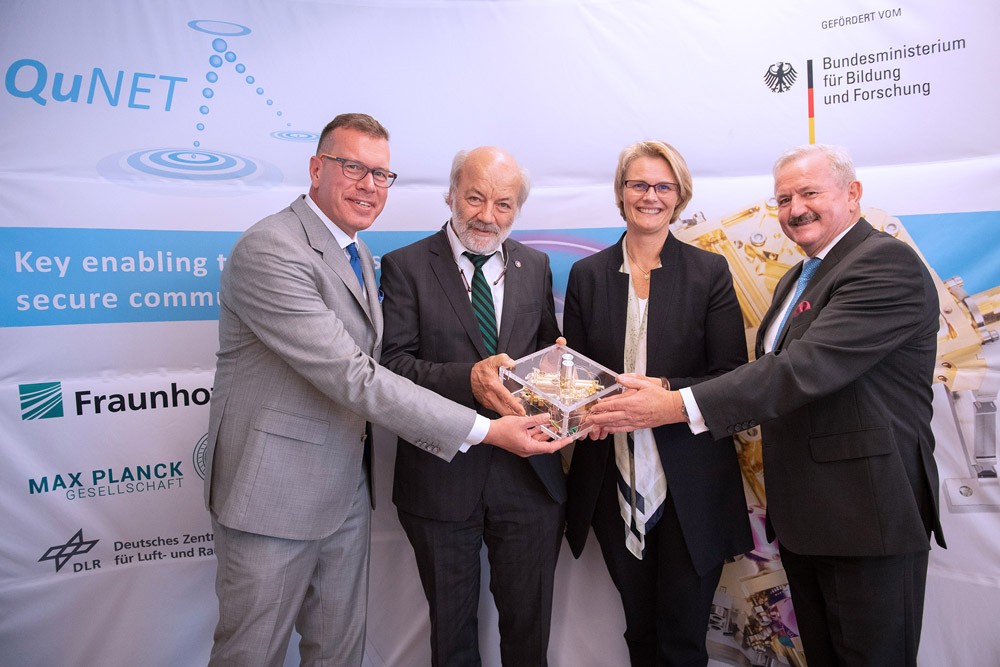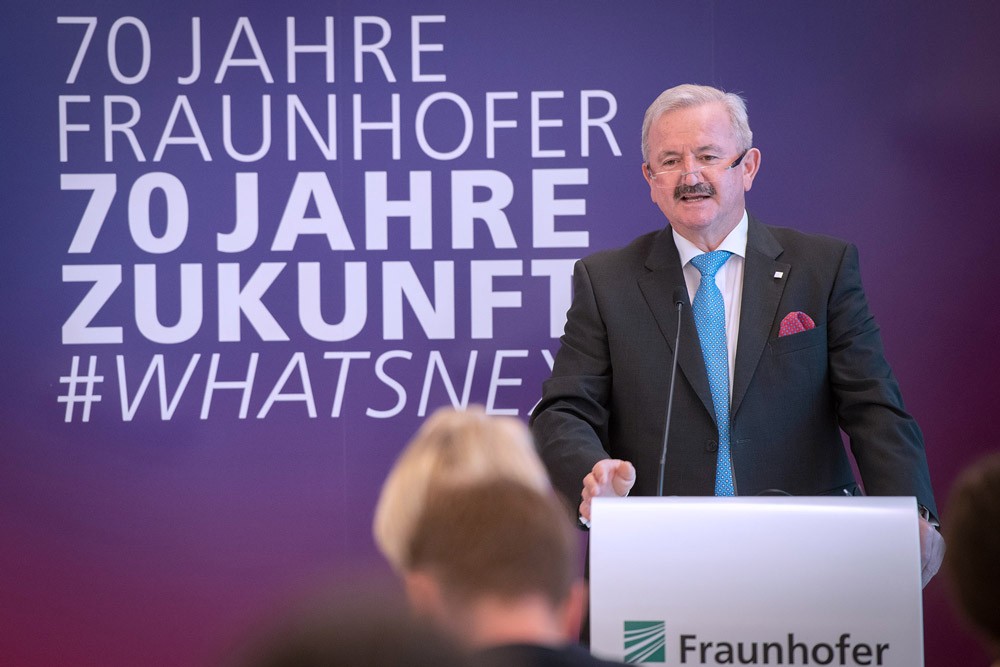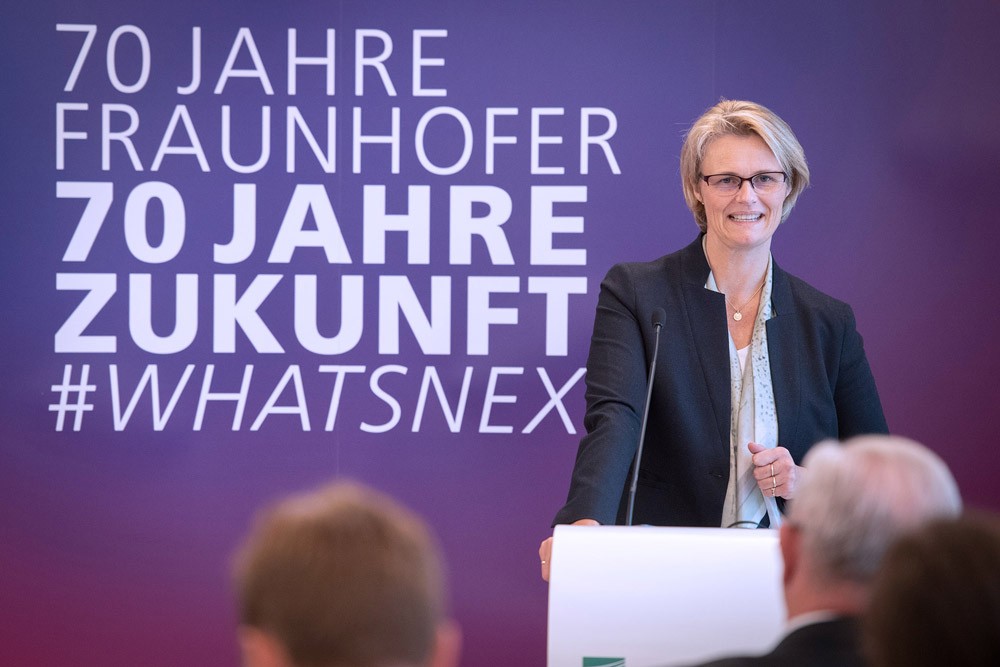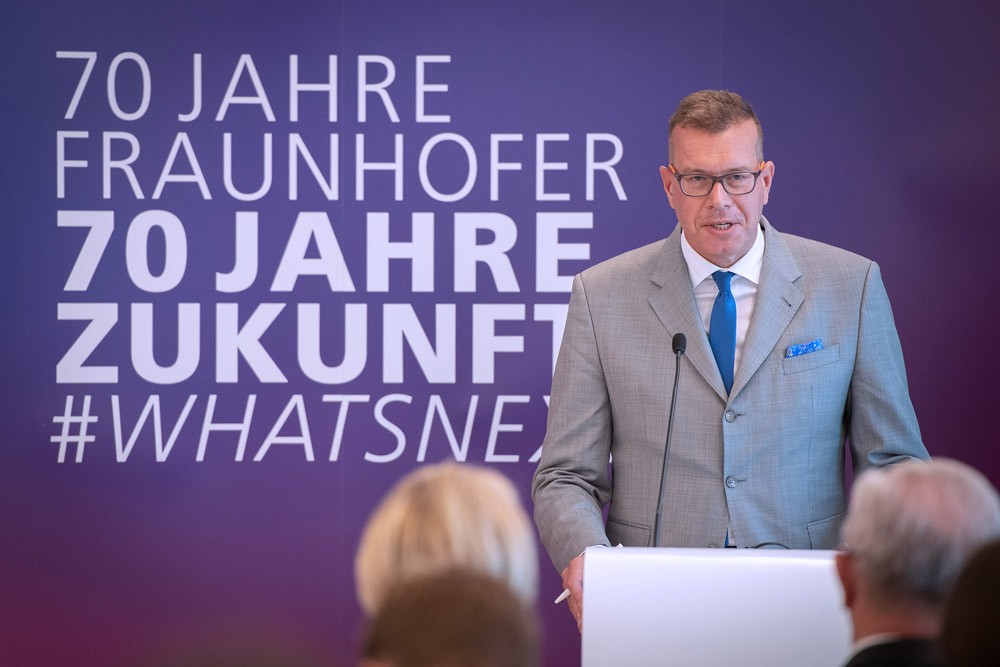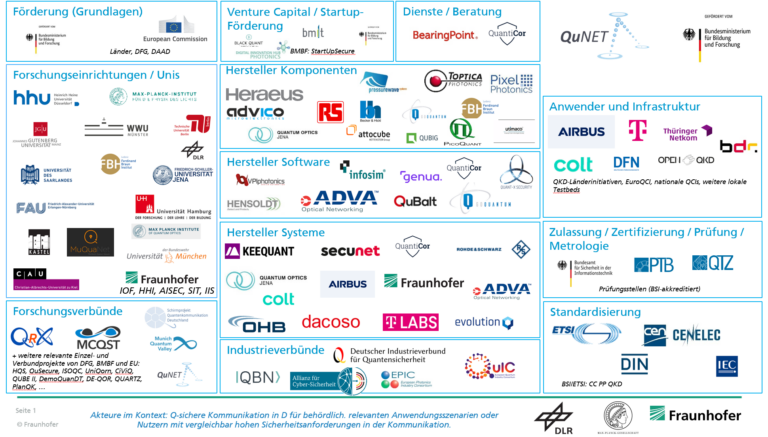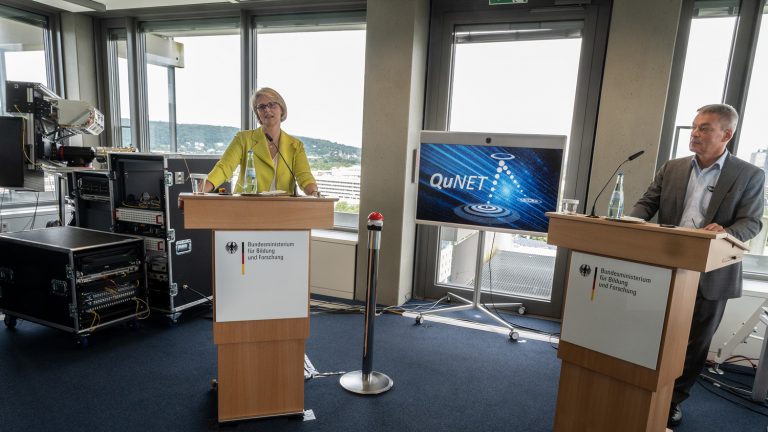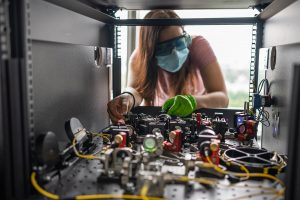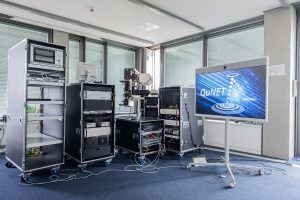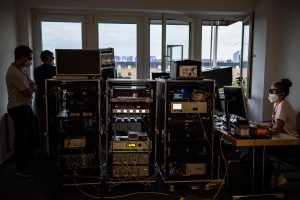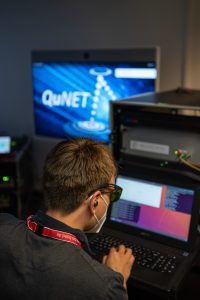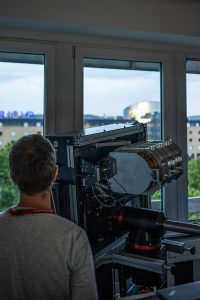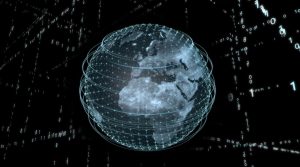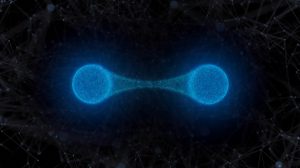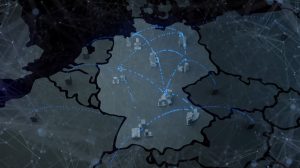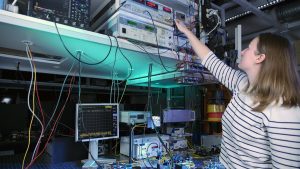Federal Chancellor Friedrich Merz visits Fraunhofer IOF
During his visit to the Fraunhofer Institute for Applied Optics and Precision Engineering IOF in Jena, Federal Chancellor Friedrich Merz saw for himself Germany’s high technological standard in quantum research. The focus was not only on photonic quantum computers, but also on the nationwide flagship project QuNET. With this project, Germany is researching the fundamentals for highly secure quantum communication of the future – all under the motto ‘Made in Thuringia’.
During a tour of the laboratories, the Chancellor was given an overview of the latest developments in the project. Fraunhofer IOF researchers demonstrated how quantum channels to mobile platforms such as aeroplanes have already been successfully implemented in the QuNET project and how the new optical ground station in Jena is now preparing the next step towards satellite-based quantum communication. In addition to a location in Oberpfaffenhofen, the ground station is one of the first of its kind in Germany and forms a key building block for future global quantum networks.
The visit underscores the relevance of QuNET for Germany as a centre of business and innovation. Quantum communication will not only help to protect critical infrastructure such as government networks, the financial sector and healthcare, but will also open up new value chains for high-tech companies. The close cooperation between the federal and state governments, science and industry, which is exemplified in Jena, is making Thuringia and Germany a driving force in the international competition for the most secure next-generation communication systems.

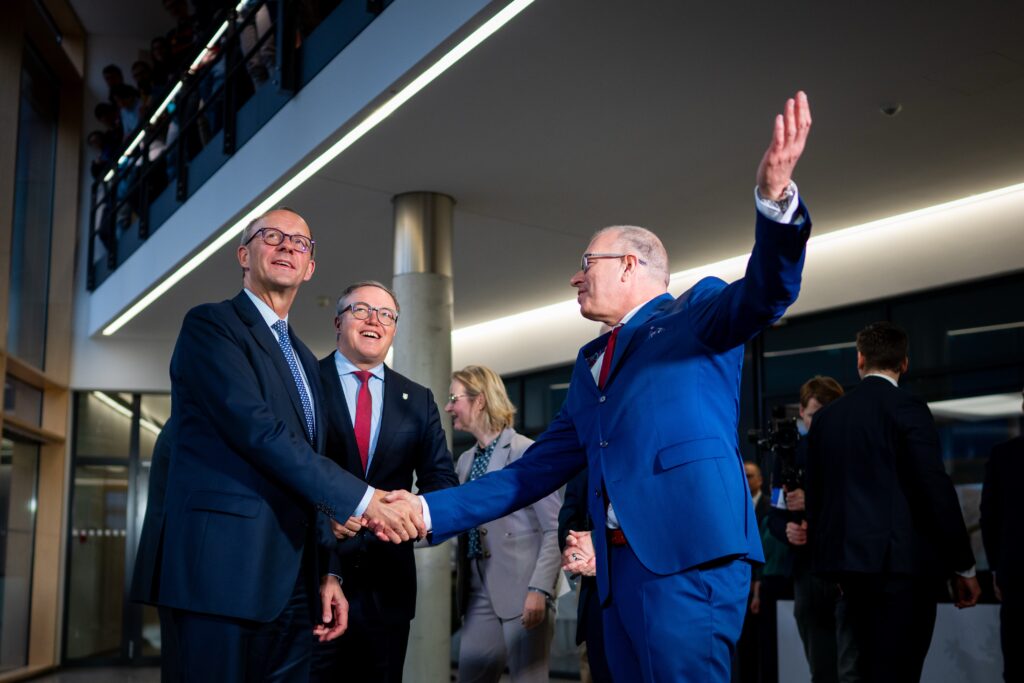
Max Planck Institute for the Physics of Light in Erlangen to host QuNET General Assembly in 2025
MPL hosted the QuNET General Assembly on 22 and 23 October 2025. This two-day event brought together partners from the initiative’s science and research departments to discuss current project developments, as well as the challenges and opportunities of further joint design.
Following welcome addresses from Prof. Dr. Christoph Marquardt (MPL/FAU) and Prof. Dr. Andreas Tünnermann (Fraunhofer IOF), Dr. Felix Wissel (Deutsche Telekom AG) presented participants with the current issues facing the initiative’s advisory board. A highlight of the meeting was the presentation of the initial impressions and results of Key Experiment 3, which had been successfully completed just a few days earlier. The meeting also focused on planning the final major experiment, SE4, which will connect the regional domains of the QuNET initiative in a joint demonstration across federal states next year.
In addition to gaining further insights into the ongoing QuNET+ projects, which were presented during a speed session, attendees were able to participate in a laboratory tour at the Max Planck Institute and visit its state-of-the-art research facilities. These experiments form part of QuNET’s ongoing efforts to develop innovative solutions to the challenges of quantum communication and advance technological progress in this field.
Further information is available here.
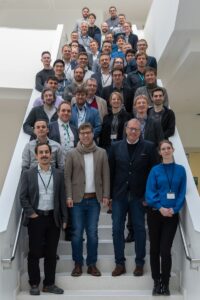
A milestone in quantum communication: successful demonstration of flying quantum channels
Researchers at the Fraunhofer Institute for Applied Optics and Precision Engineering IOF and the German Aerospace Centre (DLR), together with partners in the QuNET initiative, have successfully completed a groundbreaking experiment: For the first time, quantum states were transmitted via a mobile air node, a research aircraft, to a ground station, where they were detected. This key experiment marks a decisive step towards a future secure quantum communication network.
The so-called ‘Key Experiment 3’ demonstrated that an aircraft can function as an active node in a quantum network. It was possible to transmit photons in a targeted manner between a flying transmitter and a mobile ground station and then feed them into an ion trap. The results impressively demonstrate the technical feasibility of airborne and satellite-based quantum communication, a key technology for a future global quantum internet and highly secure data networks. For the experiment, an optical communication terminal was integrated into a DLR Dornier 228 research aircraft, which served as a mobile transmitter during the flight. The receiving station was located in a specially equipped container, known as QuBUS, belonging to Fraunhofer IOF, which received the quantum information on the ground. Thanks to high-precision beam tracking and adaptive optics, it was possible to establish a stable optical connection between the aircraft and the ground despite atmospheric turbulence. Quantum channels were successfully established on multiple occasions, and photons were transmitted over several kilometres.
With the successful demonstration of flying quantum channels, the researchers have laid an important foundation for the development of quantum-secure communication networks. The findings will form the basis for future pilot projects in which air, ground and satellite stations will be connected to form a global, resilient quantum network, paving the way for the communication age of the future.
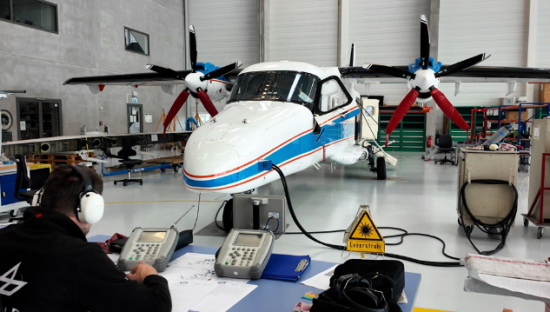
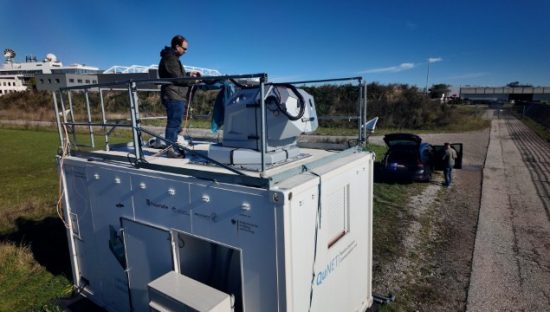
Recap of the second QPIH workshop: Terrestrial Quantum Networks
On 11 September, the second workshop of the Quantum Innovation Hub (QPIH) took place at Fraunhofer IOF. This event brought together experts from science and industry to discuss current developments and challenges in the field of terrestrial quantum networks. The workshop provided a platform for the exchange of knowledge and the promotion of innovation in quantum communication.
The event was opened by Professor Fabian Steinlechner (IOF/FSU), followed by a thematic introduction by Dr Thorsten Goebel (IOF). During the workshop, current research advances and technologies in the field of terrestrial quantum communication networks were presented. These presentations stimulated in-depth discussions and were supplemented by specialist lectures by Dr Kevin Füchsel (Quantum Optics Jena), Dr Falk Eilenberger (IOF) and Dr Matthias Goy (IOF).
A special highlight of the event were the lab tours, which gave participants an exclusive insight into applied quantum research. In addition, a poster and exhibit exhibition promoted the exchange of ideas and results among those present. The event concluded with a World Café, which had already been successfully held in the prior workshop. Participants were divided into smaller groups, where they spent eight minutes brainstorming intensively on specific topics such as ‘Packaging and Integrated Photonics,’ ‘Network Integration and Heterogeneous Architecture,’ and ‘Advanced Fibre Technology’ and exchanged their perspectives.
The event thus not only offered valuable insights into the state of quantum communication, but also provided an opportunity for networking and promoting interdisciplinary collaboration, which is crucial for the further development of terrestrial quantum communication networks.


Recap of the QuNET initiative at the World of Quantum 2025
Last week, the QuNET initiative had its own stand at this year’s World of Quantum in Munich. A quantum key distribution system (QKD) was presented, which illustrates the research results to date in the field of QKD. The system clearly demonstrates the principles of data encryption and the importance of keeping keys secret. In addition, 3D models of free-space communication and a polarisation compensation unit were presented. Other exhibits illustrating the technological development of quantum hardware were also presented during the event. The exhibition stimulated numerous discussions with interested representatives from industry, applications and science.
A particular highlight was the Quantum Safe Communication application panel. The presentations from representatives of the European Commission to large-scale industry, from research to application, offered many exciting insights into quantum safe communication. Prof Andreas Tünnermann, project manager of the QuNET initiative and head of the Fraunhofer IOF, moderated the event. He was supported by Dr Bettina Heim from OHB System and Dr Felix Wissel from Deutsche Telekom. Together, they visualised a storyline based on technological developments and industry perspectives.
QuNET’s research activities focus on the field of quantum QKD (quantum cryptography). In quantum cryptography (QKD), keys for data encryption are generated and transmitted using light and the laws of quantum mechanics. This technology enables the immediate detection of eavesdropping attempts and interrupts the secure channel.
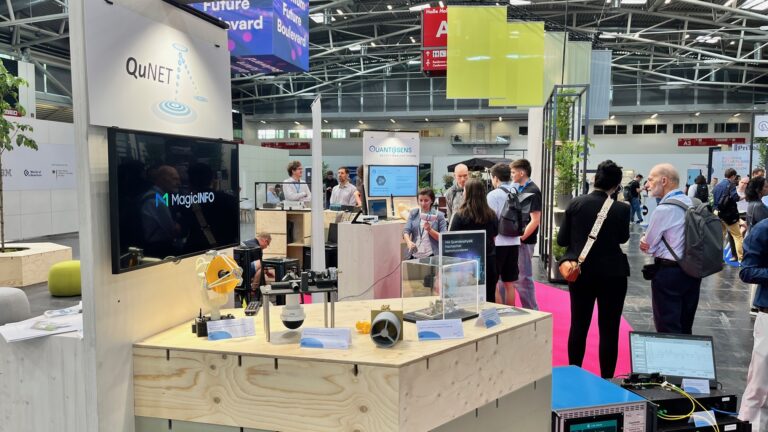
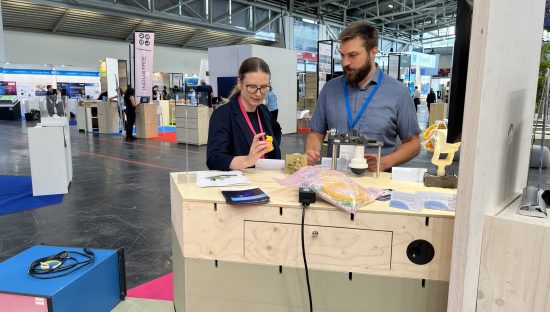
Recap of the QuNET Industry Workshop on ‘Transfer of Quantum Communication Technologies for Germanys Technological Sovereignty‘
On 11 June 2025, the QuNET initiative held an industry workshop at the Fraunhofer Heinrich Hertz Institute (HHI) in Berlin. As a partner in the QuNET core consortium, the HHI took on the role of host and thus provided a suitable setting for organising the workshop. Around 100 participants, including 55 representatives from industry, came together to discuss current developments and fields of application for quantum-safe communication.
In his welcoming address, State Secretary Dr Rolf-Dieter Jungk from the Federal Ministry of Research, Technology and Space (BMFTR) spoke about the relevance of quantum communication for the digital future and then kicked off a live demonstration, which was part of the event and illustrated a practical application of quantum communication technologies in an industrial environment. Dr Jungk also took part in the subsequent panel discussion and discussed the political and economic framework conditions for technology transfer.
Other programme items at the event included an industry exhibition and an industry slam followed by a world café. Kiosks with exhibits and posters offered diverse insights into the ecosystem of quantum communication technologies in Germany and opened up opportunities for networking and discussion.
A joint exhibit of the QuNET initiative was presented at the event. The centrepiece of this exhibit is a mockup of a Quantum Key Distribution (QKD) system. QKD data obtained in the laboratory is visualised and then the principle of data encryption and the importance of keeping the keys secret are explained in a playful way. In addition, further exhibits were presented which illustrate the technological development of quantum hardware.
For further information: Press release of Fraunhofer HHI, 12.06.2025 – Industry workshop of the QuNET initiative: Highly secure communication through quantum physics
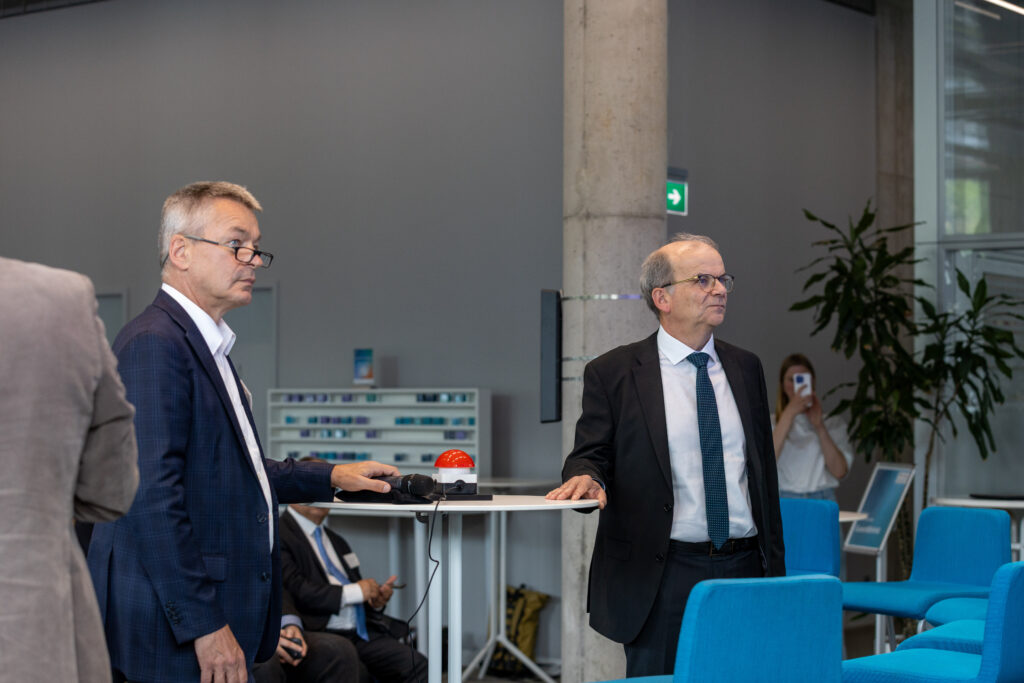
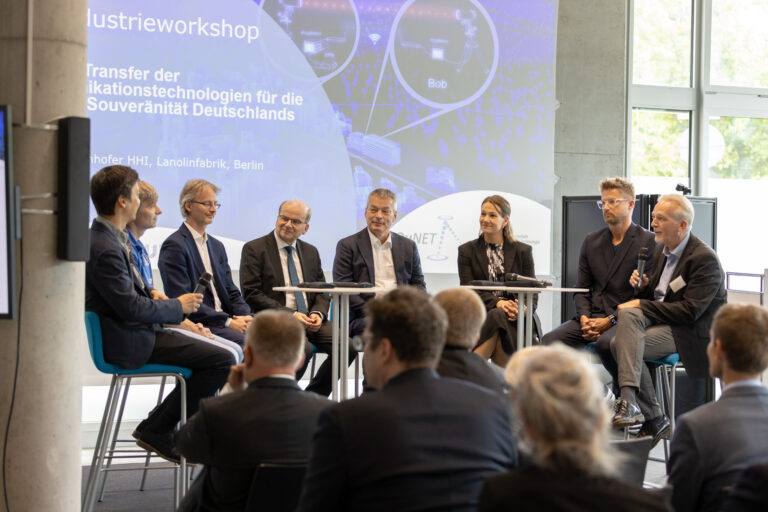
QuNET Industry Workshop on ‘Terrestial Quantum Networks‘
Explore breakthroughs in quantum technologies for applications in terrestrial networks. This dynamic workshop brings together stakeholders from industry and academia to discuss innovations and challenges of terrestrial quantum networks.
The second Quantum Photonics Innovation Hub (QPIH) workshop on “Terrestrial Quantum Networks” provides insights into the state-of-the-art of quantum technology for terrestrial networks and serves as a platform for engaging discussions. This event is part of the QuNET Industry Workshop Series and will take place at Fraunhofer IOF in Jena on 11 September 2025 from 1 – 6 pm.
Your benefits
- Gain insights from leading experts in quantum technology for terrestrial networks and stay updated on the latest advancements.
- Network with professionals and peers, fostering collaborations and partnerships in the field.
- Enhance technical knowledge and skills applicable to current and future projects in quantum technology and networks.
- Explore potential funding opportunities and resources for research and development in quantum communication initiatives.
Target group
- Researchers and scientists in the fields of quantum physics and quantum system engineering.
- Industry professionals and entrepreneurs looking to explore applications of quantum technology for communication and integration into terrestrial networks.
The latest information and the link to the Quantum Photonics Innovation Hub (QPIH) website can be found here or by using the QR code
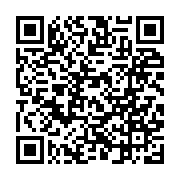
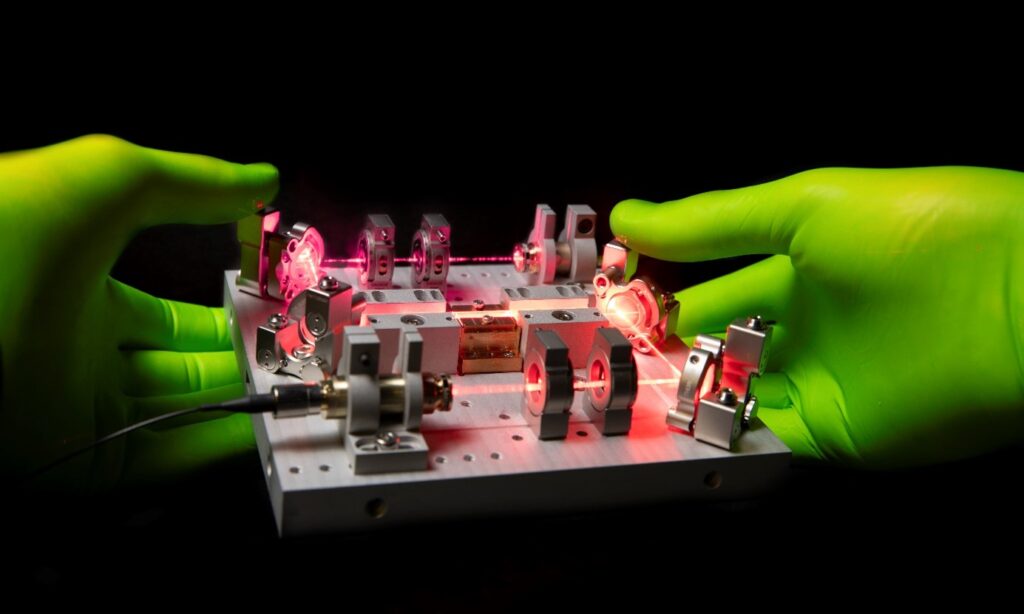
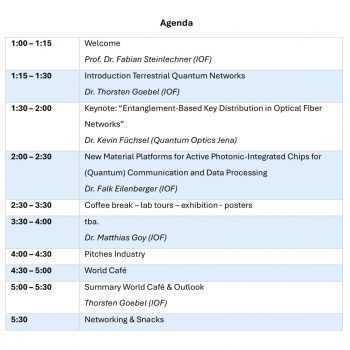
Industry workshop of the QuNET initiative on "Transfer of Quantum Communication Technologies"
As part of an industry workshop of the QuNET initiative on the transfer of quantum communication technologies for Germany’s technological sovereignty, Fraunhofer HHI invites you to attend on 11 June 2025.
Further details can be found here:
Title: Transfer of quantum communication technologies for Germany’s technological sovereignty
When: 11 June 2025, 1-6 p.m.
Where: Fraunhofer HHI, Lanolinfabrik, Salzufer 15-16, 10587 Berlin
Planned content:
- Live demonstration from the QuNET ecosystem (core project and industry-led QuNET+ projects)
- Panel discussion followed by Q&A on three key questions with all participants
- Industry exhibition with exhibits / kiosks / posters
- Industry slam for future research and transfer collaborations (à 90s) with World Café
- Extensive networking opportunities
There is the opportunity to actively shape and participate in the workshop:
Opportunities to actively shape the workshop
- Kiosk
- Exhibit
- Poster
- Industry slam for future research and transfer collaborations (à 90s): Present your company’s point of view in a 90-second pitch that considers the following questions:
- Who are we?
- What do we offer?
- What do we need to realise future prospects?
- In the subsequent World Café, we will address your concerns from the industry slam
In the subsequent World Café, we will address your concerns from the Industrieslam
You can use the following link to register by 1 June 2025 and specify the activities with which you would like to participate in the event: Industry workshop of the QuNET initiative for future applications
We look forward to your participation and a successful event!
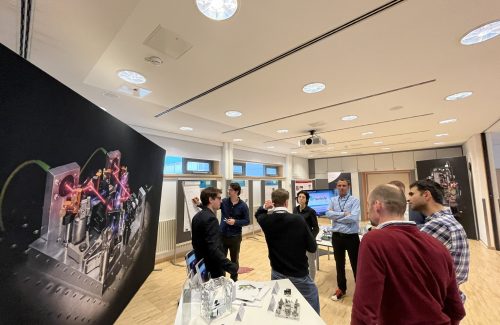

Fraunhofer IOF and QuNET at Quantum Photonics 2025: A milestone for quantum communication
Fraunhofer IOF and QuNET at Quantum Photonics 2025: A milestone for quantum communication
From 13 to 14 May 2025, the Fraunhofer Institute for Applied Optics and Precision Engineering (IOF) and the QuNET initiative presented pioneering developments in the field of quantum communication at Quantum Photonics 2025 in Erfurt. The event brought together top international researchers, industry players and decision-makers to discuss the latest advances in quantum and photonics technologies.
Dr Fabian Steinlechner, head of the ‘Photonic Quantum Systems’ department at Fraunhofer IOF, emphasised: ‘The future is quantum.’ This was impressively emphasised by the presentations and discussions at the trade fair. Fraunhofer IOF presented groundbreaking research results in quantum optics and contributed to the event with several panel contributions as well as a keynote speech by Dr Sebastian Schmitt on the topic of ‘Chip-Scale Quantum Optics: Overcoming Material Challenges to Unlock Market Potential’.
At the same time, the QuNET initiative presented its work on quantum-safe communication. Researchers from the QuNET consortium discussed current research topics, technological requirements and concrete future scenarios for secure quantum communication networks. Dr Steinlechner explained: ‘QuNET once again served as a valuable forum for interdisciplinary exchange between industry and experts from the QuNET core consortium.’
Quantum Photonics 2025 sent out a strong signal in favour of the importance of quantum and photonics technologies and their integration into the digital future. The event provided a platform for the exchange of knowledge and experience that is essential for the further development of secure communication systems.
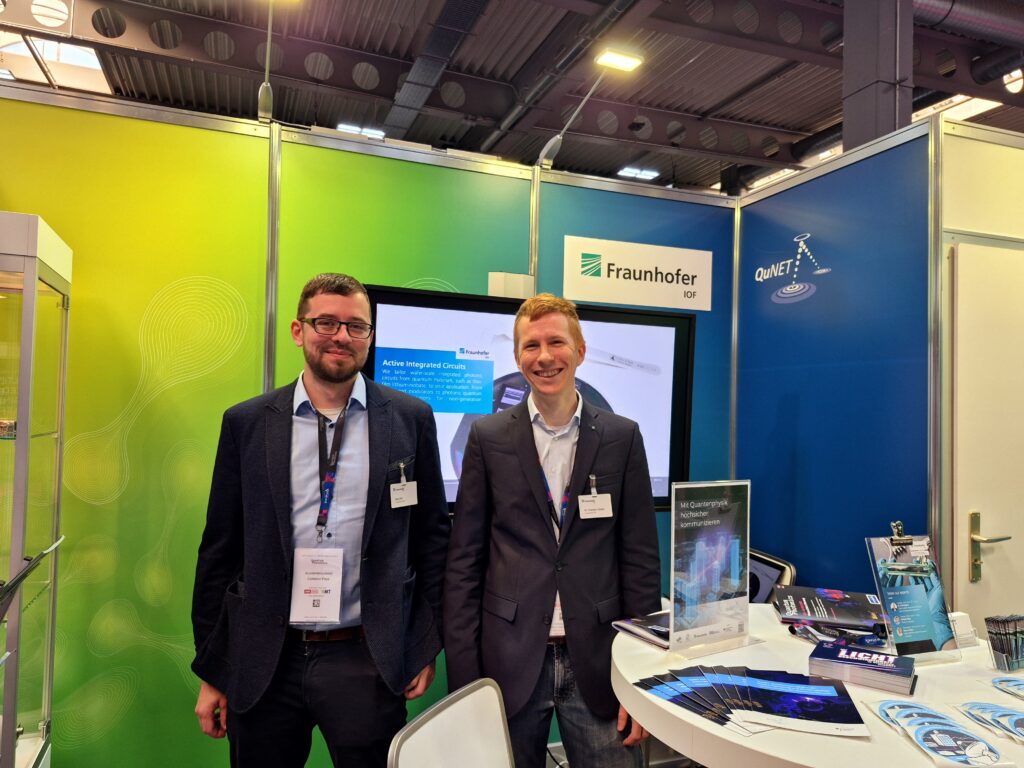
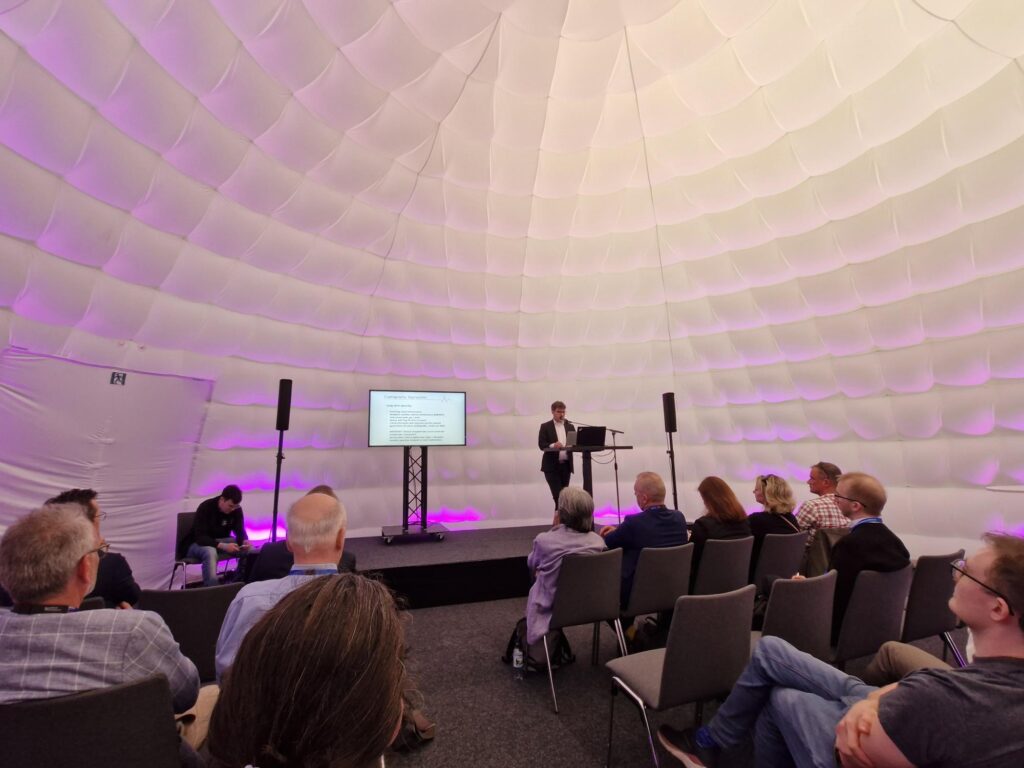
QuNET initiative: progress in quantum communication - successful tests and planning of the next key experiment
As part of the QuNET initiative funded by the Bundesministerium für Forschung, Technologie und Raumfahrt (BMFTR), researchers have made significant progress in quantum communication. Recently, the second flight campaign of key experiment 3 was carried out at the core project partner DLR-IKN, in which quantum keys were successfully exchanged between two points under everyday conditions. Both free beam and fibre connections were used to bridge fibre gaps. The experiment achieved key transmission rates in the kilobit per second range in daylight and demonstrated the feasibility of realising scalable quantum-safe networks.
As a follow-up to this, a specialist group meeting of the QuNET initiative was held at DLR-IKN in Oberpfaffenhofen on 6 and 7 March 2025. Representatives of the core institutes and the 12 industry-led QuNET+ projects intensively discussed the preparations for the fourth key experiment, which is planned for 2026. The focus was on integrating the results of the individual projects and jointly demonstrating progress.
The QuNET initiative is committed to laying the foundations for secure digital communication of the future by utilising quantum technologies for key distribution. The results so far show promising approaches for the development of highly secure communication systems.
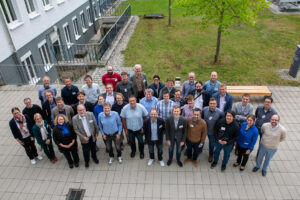
Pre-school children discover the world of optics and quantum communication
The pre-school children from the Beutenberg daycare centre recently visited the Fraunhofer Institute for Applied Optics and Precision Engineering IOF in Jena. There, the young guests were able to gain exciting insights into the QuNET research project and the fascinating world of optics.
The children were welcomed by employees Stefan Riehemann, Lisa Schindowski and Thorsten Goebel, who opened the visit with a child-orientated introduction and an interactive question and answer session under the motto ‘What do you see?’. This was followed by a number of hands-on stations, which were fun and educational. The stations were organised in such a way that complex quantum communication topics were made accessible and tangible for children. For example, the children learned how colours influence our vision, how distorted mirror images – so-called anamorphoses – appear upright again and how perspectives can deceive our perception of size.
These experiments also served as simplified models for real challenges in research: for example, the station with reflective, curved mirrors showed why non-spherical surfaces must be taken into account in free-beam communication. Colour-selective vision was used to explain how certain wavelengths of light can be filtered out – a technique that is used in quantum communication, for example, to encode and decode information.
The children were very enthusiastic – as was the positive feedback from the accompanying teachers. We are delighted that we were able to give these young researchers an exciting insight into our work and say: We look forward to seeing you again next year!
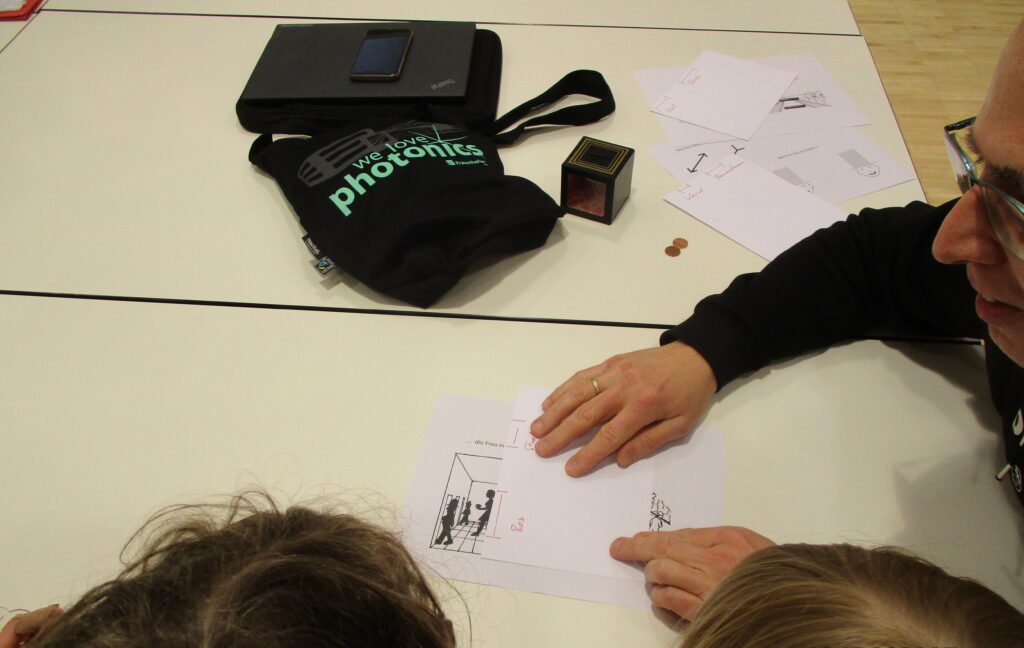
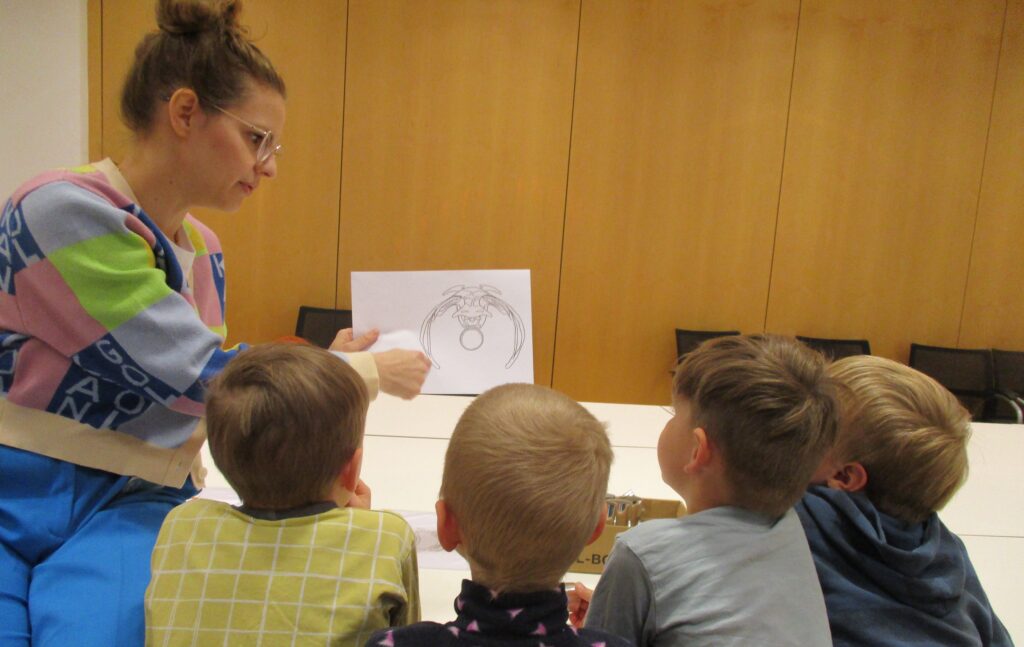
Innovations in Quantum Research: New Advances in QuBUS and QuNET
Last week, DLR’s DO 228 CFFU research aircraft took off again – with a very special goal. Together with the Max Planck Institute (MPL), the Fraunhofer HHI, the Friedrich Alexander University and the Fraunhofer IOF, quantum connections between air and ground stations were tested using the QuBUS.
The QuBUS is currently located at the Max Planck Institute in Erlangen, where it is coupled with a high-precision ion trap. This technology is used to manipulate quantum bits (qubits) with exceptional stability. This development could form the basis for future quantum computers and is an important step on the way to powerful and stable quantum computers. In parallel, QuNET contributes to the development of a secure and efficient quantum communication system. This technology enables the networking of quantum computers and is a key technology for the quantum internet, which allows the secure exchange of quantum information over long distances.
The experimental flights were successfully completed on 6 April 2025 and in the final measurement campaign next autumn, a quantum state transmitted through the air will be directly entangled with the aforementioned ion trap for the first time – a visionary step on the way to secure quantum communication over long distances.
The future of quantum research is and will remain exciting – and thanks to the ongoing collaboration, the way has already been paved for ground-breaking innovations.
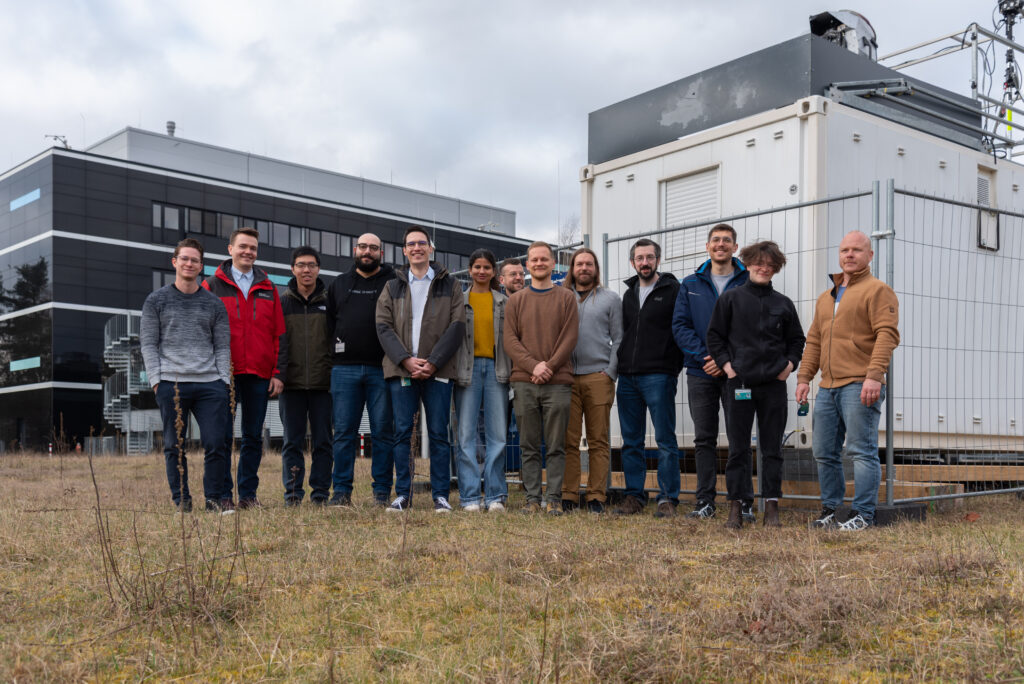
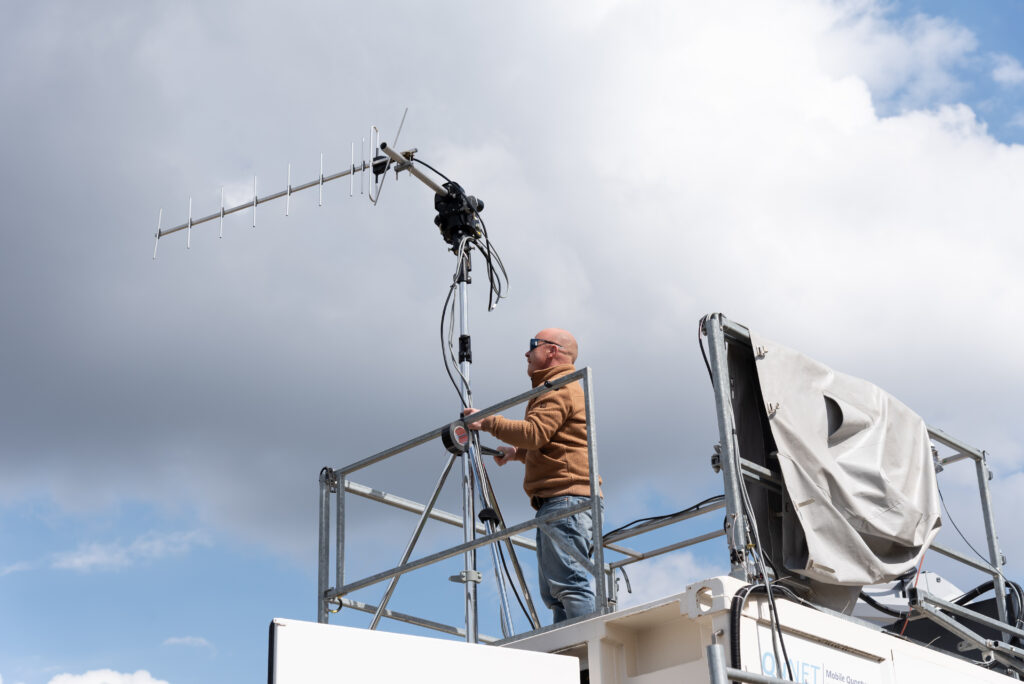
National Conference IT Security Research 2025 - Cybersecurity and Democracy
From 17 to 19 March, the Federal Ministry of Education and Research (BMBF) hosted the National Conference on IT Security Research in Berlin. The programme included a diverse range of presentations and panel discussions that provided an insight into current research projects. In addition, numerous networking opportunities offered participants the opportunity to exchange ideas with representatives from the fields of science, business and civil society, among others.
On the evening before the conference, 17 March, an ‘inventive spirit slam’ took place under the title ‘Innovations for a secure digital society’. Dr Michael Ullrich, consortium leader of the QuNET+MOBIXHAP project, took part with the topic ‘Secret communication with high-speed quantum slingers in the stratosphere’.
In addition to a dedicated QuNET stand with exhibits, the initiative was also involved in a parallel session organised by Dr habil. Torsten Siebert (IOF) chaired. After a presentation of the QuNET initiative, QuNET project manager Professor Andreas Tünnermann (IOF) took part in the discussion on stage with other colleagues from research, science and industry.
The conference covered a number of key topics, including the impact of artificial intelligence (AI) on IT security, the rise of AI-based disinformation, human-centred IT security, digital freedom and privacy and IT security in the quantum age. The aim of the event was to discuss current research policy impulses, stimulate interdisciplinary networking and provide insights into this highly dynamic field of research for all interested parties.
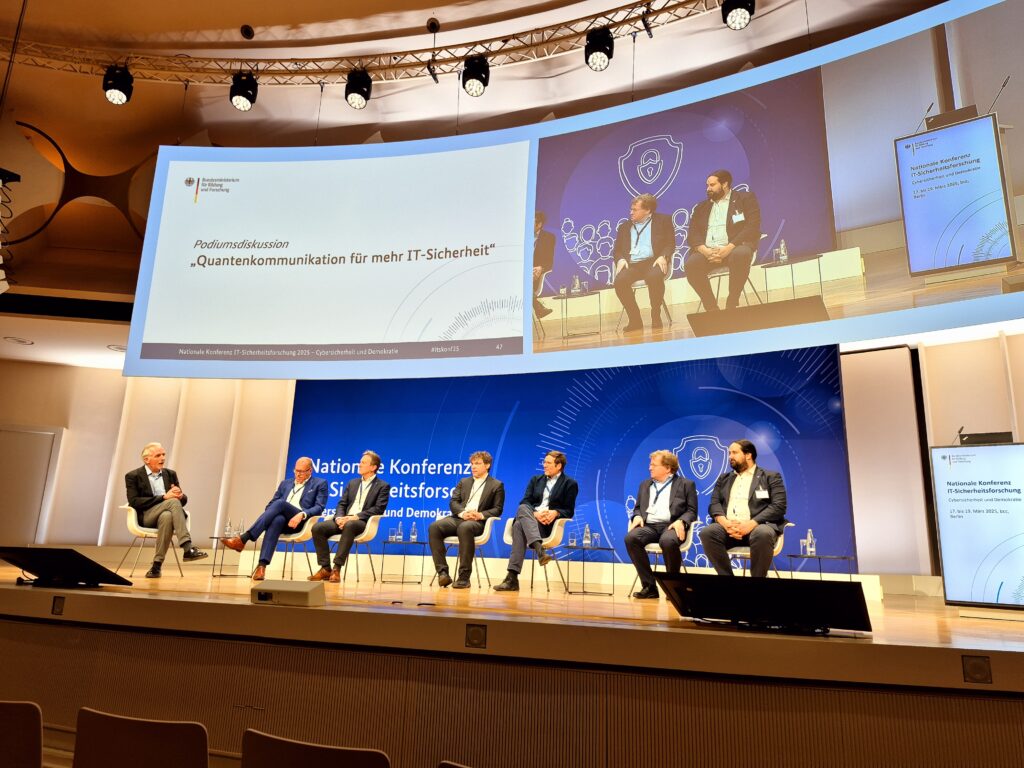
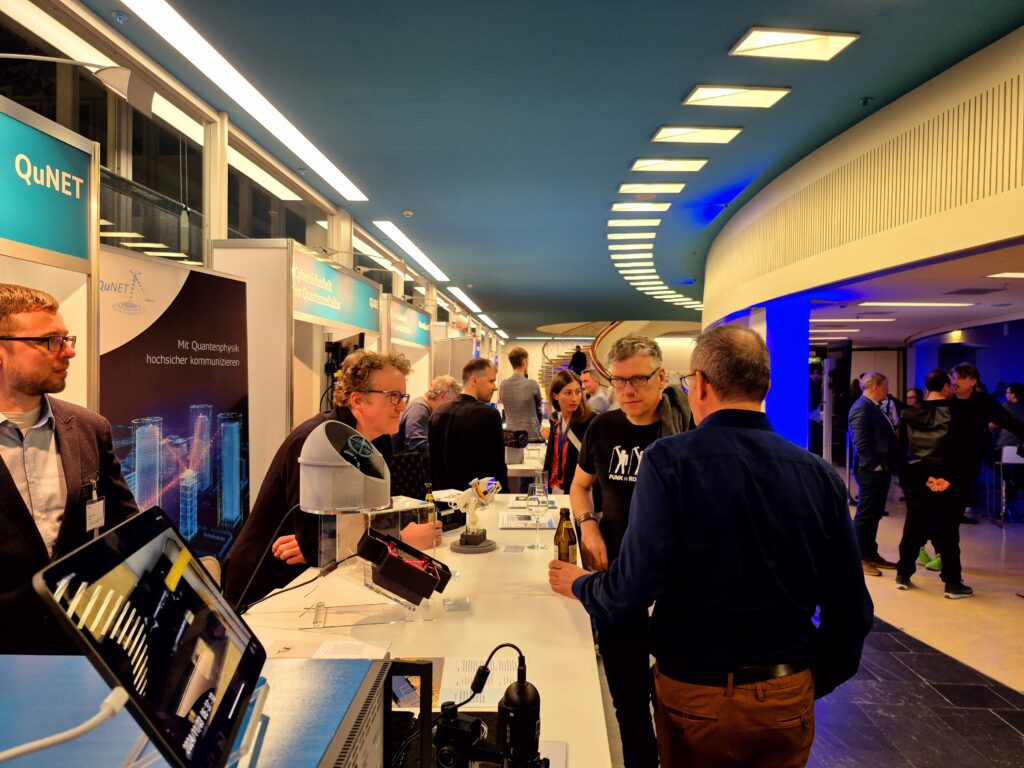
Recap of the first QPIH workshop: Quantum Space Technology Workshop
The first workshop of the Quantum Photonics Innovation Hub QPIH on quantum space technology took place at the Fraunhofer IOF in Jena on 13 March. In collaboration with QuNET and the Thuringian Innovation Centre for Quantum Optics and Sensor Technology (InQuoSens), the event served as a platform for research/science and industry to discuss the current state of quantum technology for space applications.
The event kicked off with a welcome address by Institute Director Professor Andreas Tünnermann, followed by an overview of quantum space IT technologies by Professor Fabian Steinlechner (IOF/FSU). In his keynote speech, Professor Thomas Jennewein from the University of Waterloo addressed the application of photonic quantum technologies in space using the example of the ‘QEYSSat’ project. Further insights were provided by Dr Erik Beckert and Dr Nils Heidler, among others. A poster session and pitches from industry representatives in attendance promoted dialogue between participants. The event also provided an exclusive lab tour to take a look behind the scenes of quantum research. Finally, a World Café was held as part of the workshop, during which the participants had eight minutes each to brainstorm and exchange ideas in small groups. The individual discussions took place under the following topics: ‘Space’, ‘Photonic Technology’ and ‘Ground’.
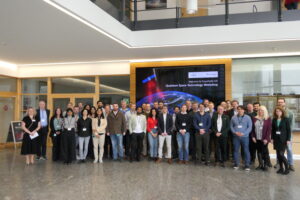
Quantum Photonics 2025: The future of quantum and photonics technologies
Quantum Photonics 2025, which will take place for the first time from 13 to 14 May 2025 in Erfurt, promises to be a major international event for quantum and photonics technologies. The event combines a conference, trade exhibition and networking and will provide an important meeting place for experts, researchers and companies from the industry. Thuringia, as an outstanding location for quantum research and development, which plays a central role in promoting these technologies, deserves special mention. The QuNET project supports Quantum Photonics, as do other regional organisations.
The congress programme has been finalised and features, among other things, a high-calibre advisory board that will shape the event with its expert knowledge. Participants can look forward to a variety of topics such as quantum communication, quantum computing and quantum sensor technology. A highlight of the congress is the opening keynote by Prof Dr Jaw-Shen Tsai from the Tokyo University of Science.
Prof Dr Andreas Tünnermann, Director of Fraunhofer IOF, Chairholder and Professor at the Institute of Applied Physics in Jena, will open Quantum Photonics this year: ‘Quantum Photonics 2025 sends out a strong signal for Thuringia as a centre of business and innovation. The regional innovation ecosystem in Thuringia, consisting of Thuringian research institutions and companies, enables research and development on photonic quantum systems at the highest level,’ says Tünnermann about the upcoming congress.
The focus is on the question of how quantum technologies can make our lives safer, healthier and more efficient in the future. The international demand for this first-time realisation of the congress in the Free State of Thuringia is particularly evident: We are asking the right questions with our research in Thuringia.
A detailed programme as well as specific times and further details can be found on the Quantum Photonics website.
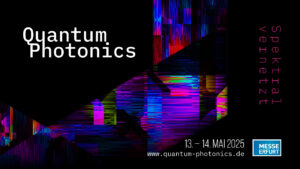
Quantum Space Technology Workshop - Part of the QuNET Industry Workshop Series
Welcome to the Quantum Photonics Innovation Hub, a bi-annual series at the interface between industry and academia and part of the ‘QuNET industry workshop series.’
The workshop features exciting poster sessions and invited talks showcasing cutting-edge technologies, visionary solutions and the latest breakthroughs in photonic quantum systems. This series explores the transformative potential of satellite and terrestrial quantum communication, computation and sensing with specific topics for each workshop.
Join this event in Jena to help shape the future of quantum technology!
Date: 13 March 2025, 1 – 6 pm
Location: Fraunhofer IOF, Albert-Einstein-Str. 7, 07745 Jena
You can find more information on our website.
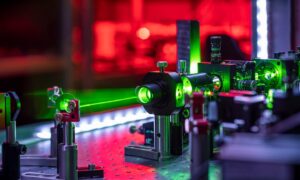
QuNET: Laser-optical communication channel between aircraft and ground station
In October 2024, researchers successfully established a laser-optical link between the DLR research aircraft DO 228 CFFU and the Fraunhofer IOF’s mobile ground station QuBUS. The aircraft generated laser beams with different wavelengths, which were received and processed by the ground station. The tests showed that a stable channel for the transmission of light particles can be aligned independently.
The aim for 2025 is to couple light particles transmitted through the air with an ion trap. The aim is to guide light particles into a glass fibre that leads to ytterbium ions. In this way, flying light particles could be transmitted into stationary quantum memories – a milestone for mobile quantum communication nodes. At the same time, quantum cryptographic systems are being tested.
You can find more information about the current experiment here: Link
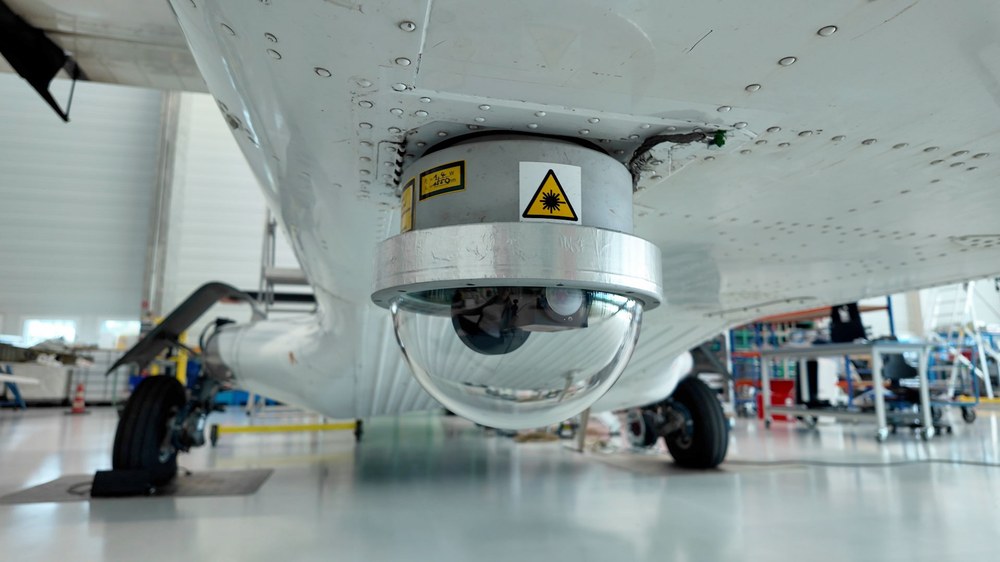
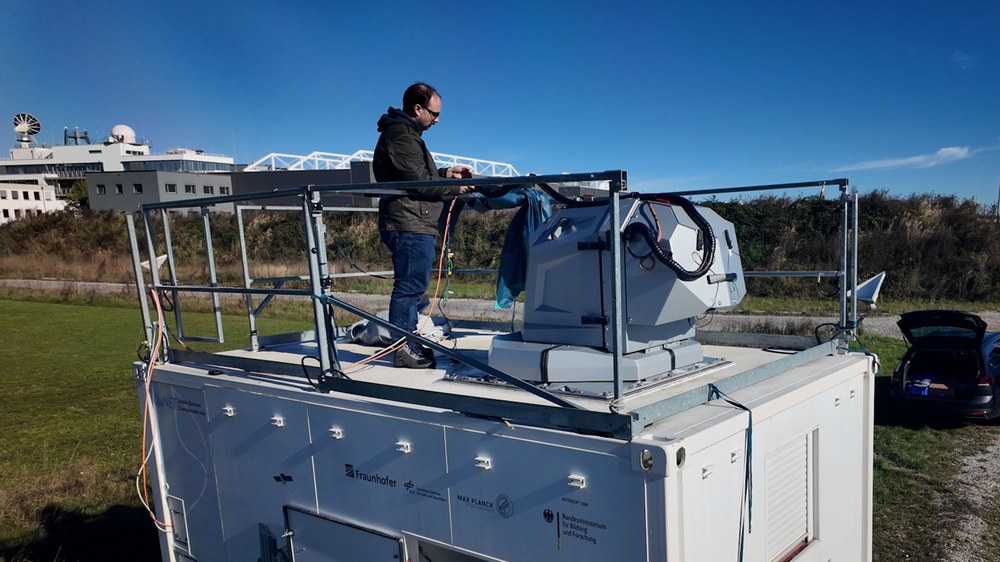
Berlin, Braunschweig | 11 to 14 November 2024
QuNET at the Quantum Symposia 2024: Advances in quantum communication
In November 2024, QuNET presented its latest developments and innovations in secure quantum communication at two key events: the Bundeswehr and BWI Quantum Symposium in Berlin on 14 November and the Quantum Communication Symposium Germany in Braunschweig from 11 to 14 November.
Quantum key distribution using mobile platforms: Presentation of results from SE2, in particular the development of a mobile experimental platform for ad-hoc quantum key exchange. Demonstration of the technology for horizontal links and for use with flying platforms (e.g. aeroplanes). Outlook for SE3, in which the technologies will be further scaled and expanded in an application-orientated manner.
Expert exchange and panel discussions: In Berlin: participation in the panel discussion ‘Quantum meets Security’ with experts such as Imran Khan (KEEQuant), Kevin Füchsel (Quantum Optics Jena) and Manfred Lochter (BSI). The exchange emphasised the relevance of quantum communication for secure networks of the future. In Braunschweig: Prof Martin Schell (HHI) represented QuNET in a high-calibre discussion on the practical implementation of testbeds and their significance for the future of quantum communication.
Project presentations and testbeds: Presentation of the QuNET testbeds and practical applications of quantum-safe communication in both formats. Project pitches and expert discussions showed concrete progress and new perspectives of the research initiative.
Stand presence and exchange: At both events, QuNET informed the specialist public about the current state of development and facilitated an interdisciplinary exchange on QuNET technologies.
By participating in these events, QuNET presented important steps towards realising secure quantum communication networks and showed how innovative technologies for key distribution are already being tested in mobile and industrial scenarios.
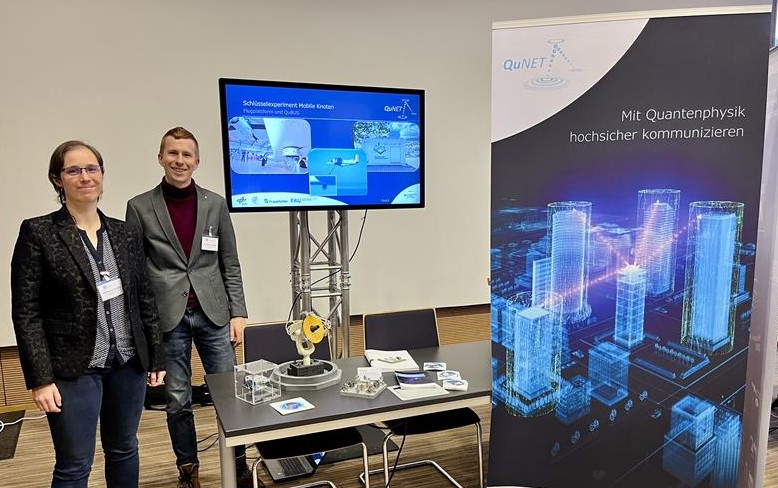
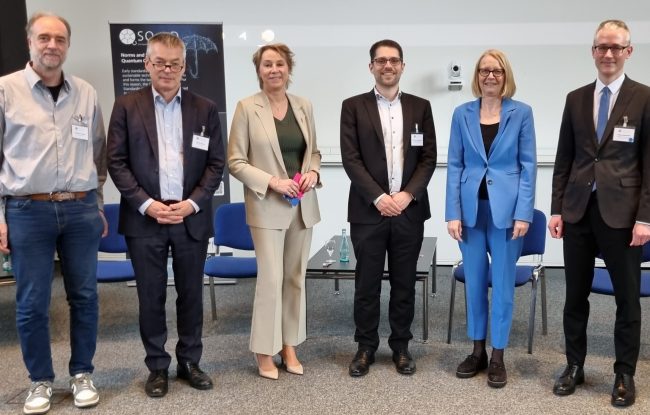
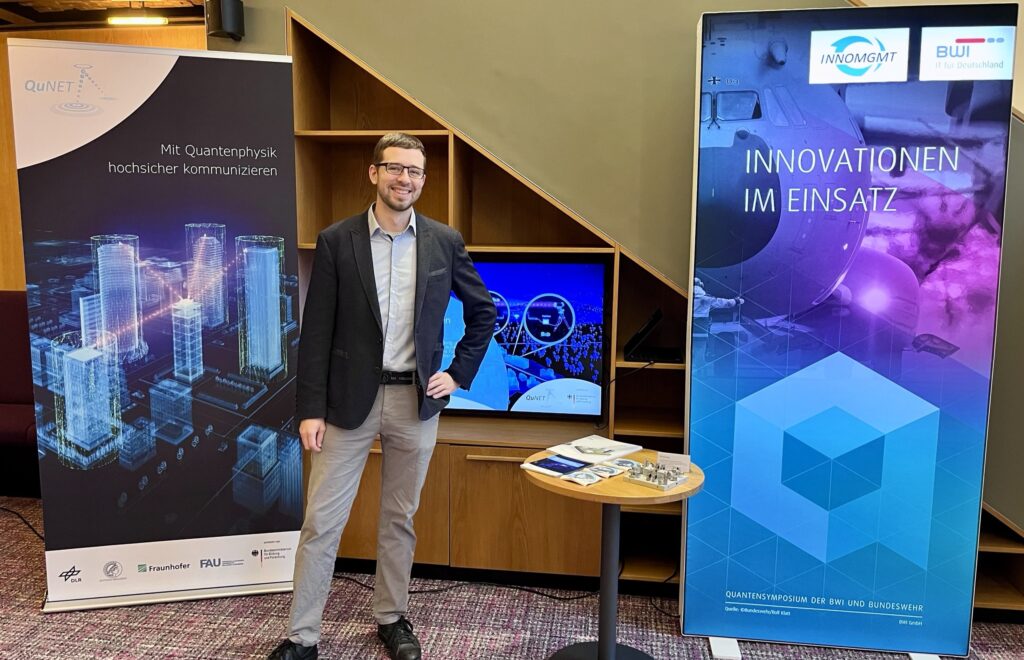
The forum for quantum communication in Germany
At the ‘Forum for Quantum Communication in Germany’ on 17.10.24 at the Fraunhofer HHI, State Secretary Dr Roland Philippi emphasised the central role of research funding by the BMBF. This is crucial for strengthening IT security and technological sovereignty. The event was organised by the BMBF-funded networks QR.X, QuNET and SQuaD and brought together leading representatives from research, industry and start-ups. The aim was to highlight prospects for quantum communication in Germany and present concrete progress.
The QuNET initiative demonstrated quantum-secured data transmission in Berlin’s inner-city network, a possible approach for the secure transmission of personal data in digital government services. QR.X presented quantum teleportation as a technological cornerstone for future quantum networks. The SQuaD umbrella project provided information about its support for technology transfer and the development of an innovation ecosystem for quantum communication in Germany. The forum’s selected discussion topics included research & development, transfer & value creation, data sovereignty, IT security research, training & careers and EU & international perspectives. Research projects and industry from the field of quantum communication were presented at kiosks.
In order to promote exchange within the forum and to honour the BMBF’s pioneering funding strategy, an impulse paper on the topic of quantum communication was drawn up from the midst of the research and industry ecosystem in the run-up to the forum and ceremoniously presented to the BMBF State Secretary Dr Roland Philippi at the event.
You can find more information about the event at the BMBF and the Fraunhofer HHI.
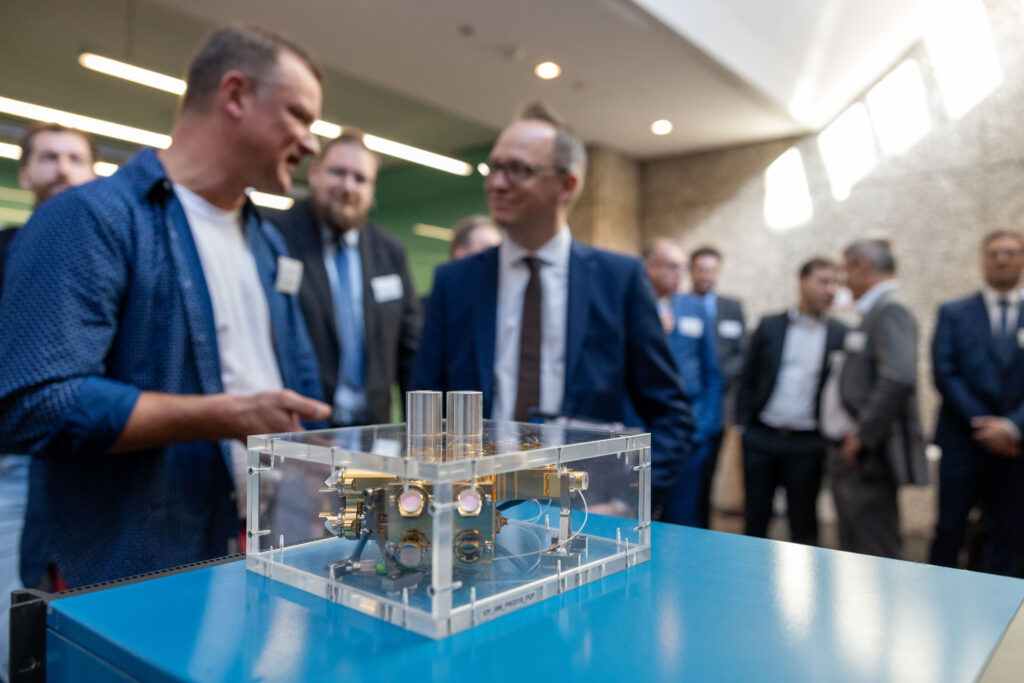
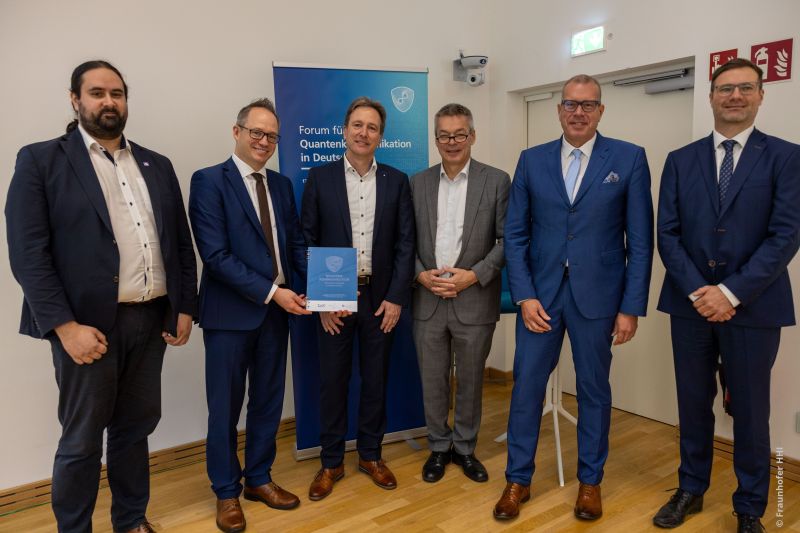
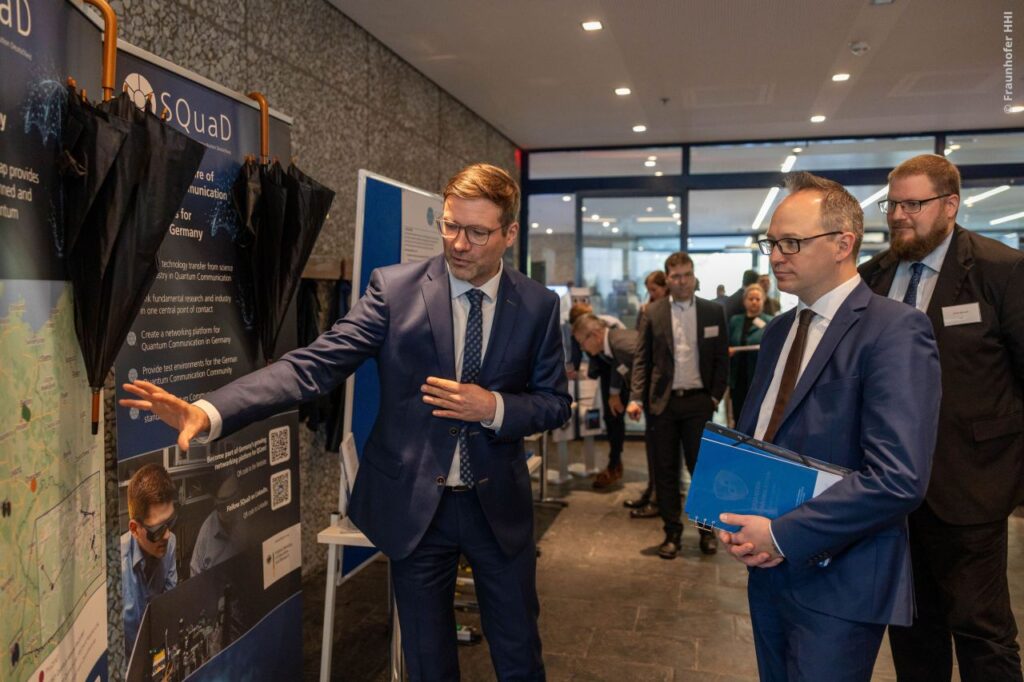
Flight campaign #1 of key experiment 3 - quantum communication in the air
The video shows the completed preparations for the third key experiment of the QuNET initiative: acceptances, tests, certifications and the installation of the optical communication terminal in a Dornier 228. The aircraft of the DLR research fleet is used as a mobile node to establish an optical link to a ground station. The aim is to demonstrate and further develop mobile quantum communication using QKD.
More information on the current experiment can be found here: Link.
QuNET general meeting 2024
The DLR Institute of Communications and Navigation hosted the QuNET General Assembly 2024 in Oberpfaffenhofen. The two-day event provided updates on the latest project developments. A poster session provided an ideal opportunity to exchange technical details and deepen both new and existing partnerships. The lab tour gave participants the opportunity to experience the ongoing work at QuNET first-hand. They visited the German Space Operations Centre, the Optical Ground Station Oberpfaffenhofen, the DLR Do228 aircraft with installed laser terminal and the Fraunhofer IOF QuBUS with an adaptive optics system.
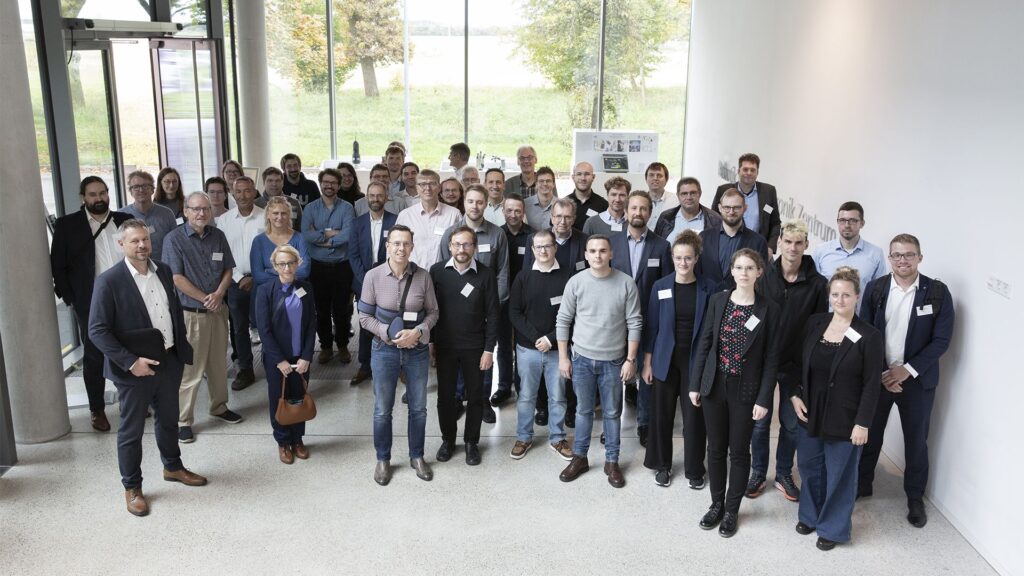
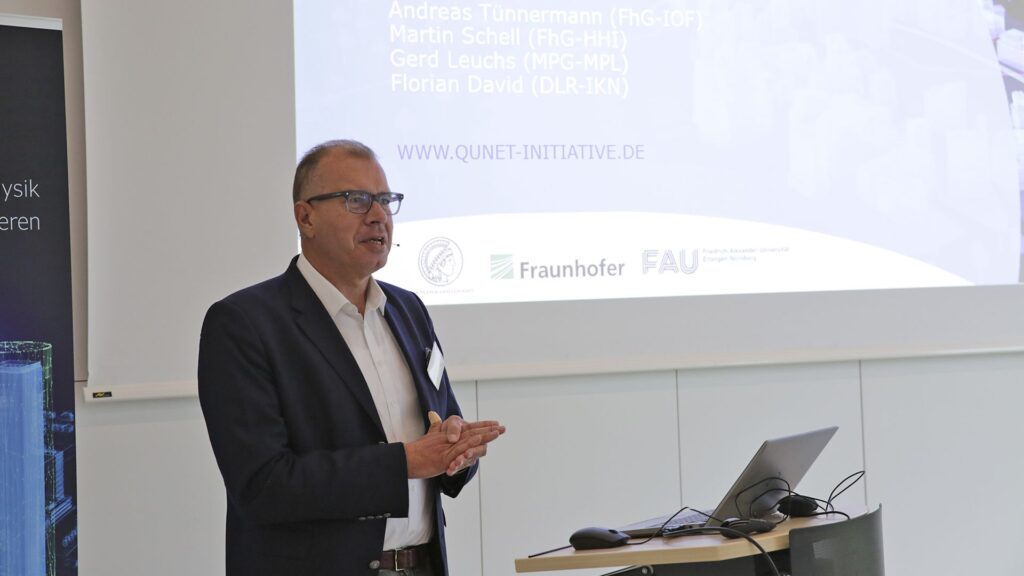
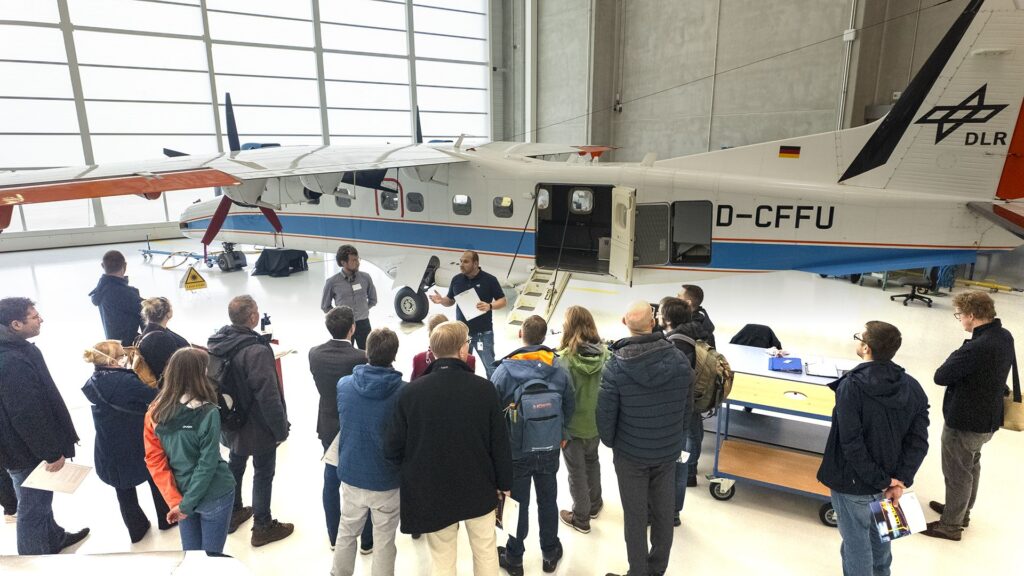
Start of the second key experiment of the QuNET initiative for secure quantum communication
QuNET has started the main phase of the second key experiment to develop highly secure QKD-based communication systems. For the first time, several users in the Berlin metropolitan region, including the sites of Fraunhofer HHI, Deutsche Telekom and the Bundesdruckerei Group, will be connected quantum securely via 125 km of fibre optic and free beam connections.
The experiment marks an important milestone for secure communication networks in Germany. Dr Nino Walenta leads the team of 30 researchers. Read more about quantum research and the key experiment 2 in the press release of the Federal Ministry of Education and Research BMBF.
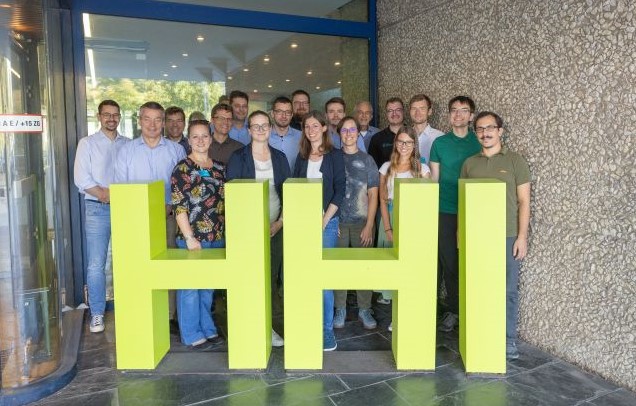
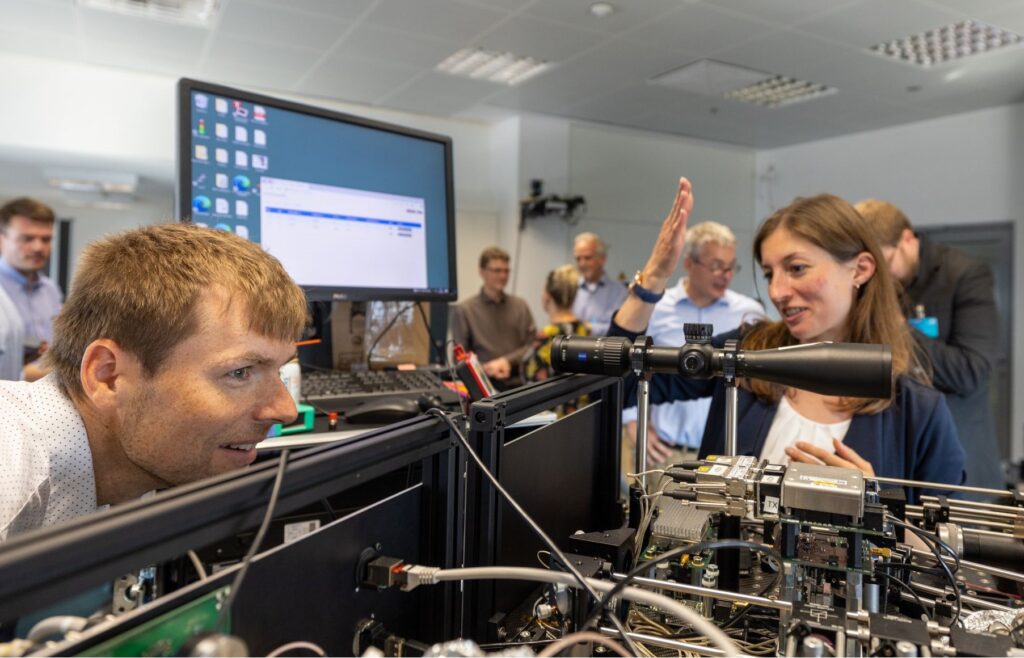
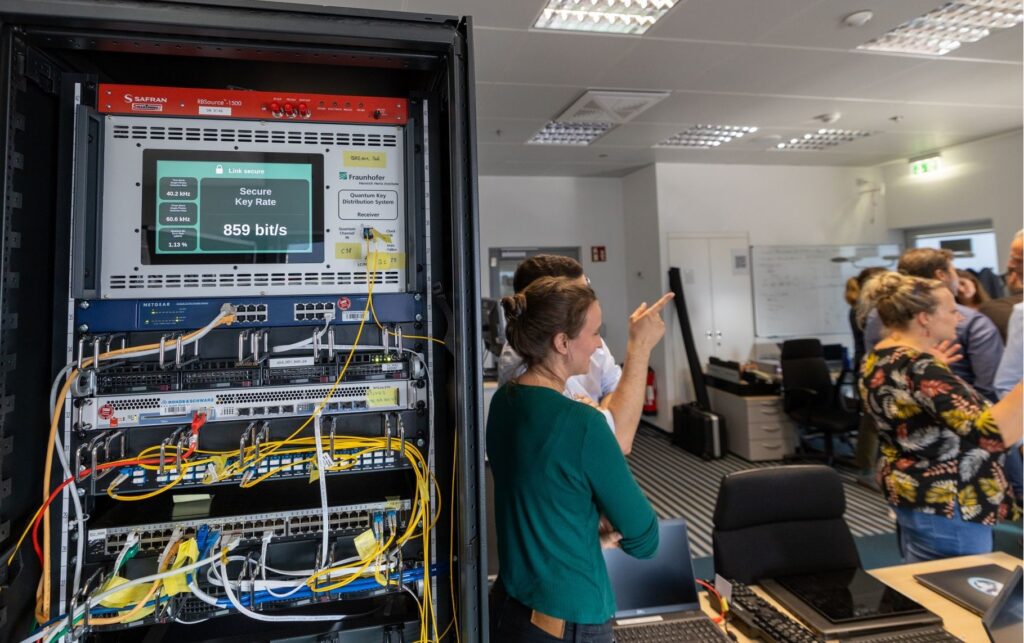
All core institutes in Berlin united for the start of the SE2 experiments
All five core institutes of the QuNET initiative are on site in Berlin to finalise the last set-ups and preparations for the SE2 experiments. The actual experiments, which will begin on 16 September, represent a significant step in the development of quantum-safe communication networks in Germany.
At the Heinrich Hertz Institute (HHI), Nino Walenta is leading the SE2 experiments. The HHI is applying its expertise in photonic technologies. The Fraunhofer Institute for Applied Optics and Precision Engineering (IOF) contributes to the development of optical systems for quantum communication, which are necessary for high transmission reliability. The DLR Institute of Communications and Navigation is significantly involved in the integration of QKD systems into existing networks, in particular through research in the field of satellite-based quantum communication.
The Max Planck Institute for the Science of Light (MPL) and Friedrich-Alexander-Universität Erlangen-Nürnberg (FAU) are working closely together to develop innovative solutions for quantum key distribution (QKD).
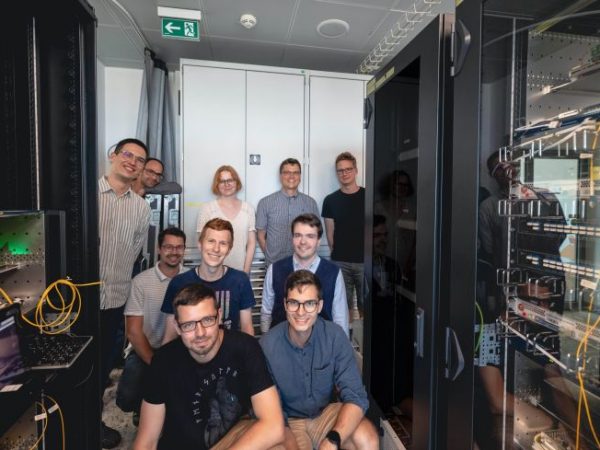
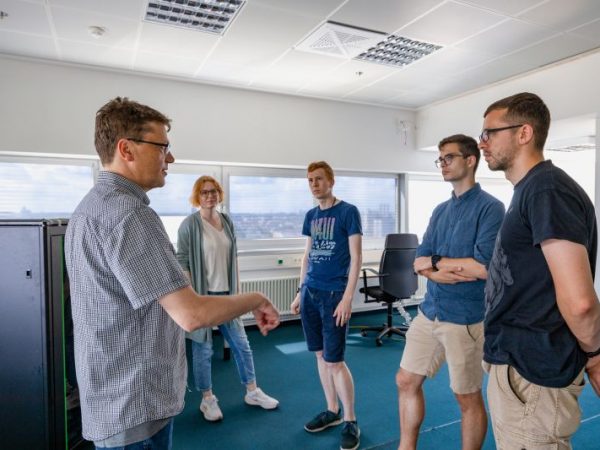
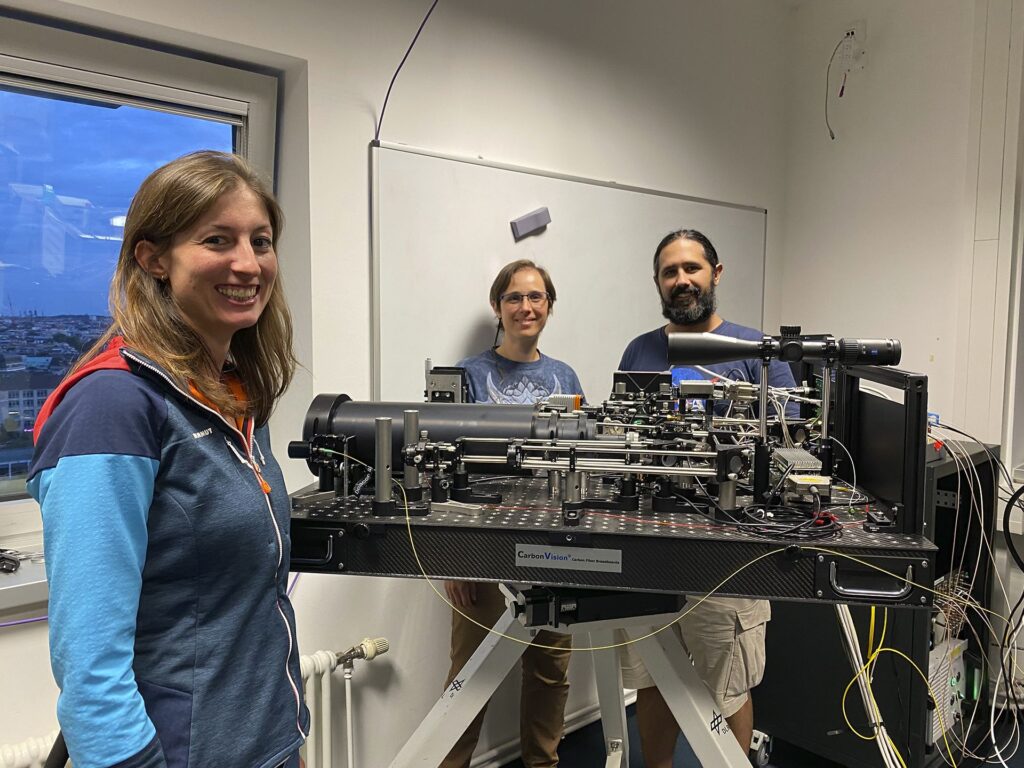
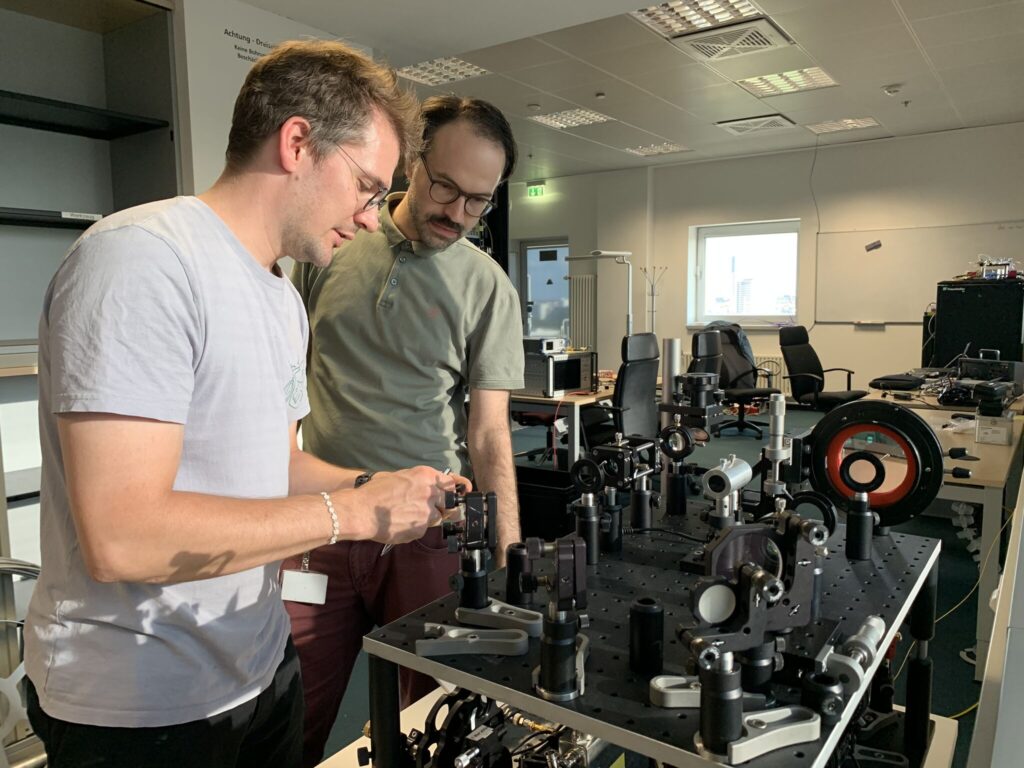
Key experiment of the QuNET initiative: Highly secure quantum communication in an urban environment
Starting signal for ground-breaking quantum communication experiment in Berlin
As part of the third large-scale experiment, an urban network with several users in the Berlin metropolitan region will be connected for the first time in a quantum-safe manner via point-to-point connections. The Fraunhofer HHI sites at Einstein- and Salzufer as well as Deutsche Telekom and Bundesdruckerei GmbH will be connected via a 125 km long fibre optic network and additional free beam connections in the air.
A particular focus is on investigating how digital services in the quantum age can be made highly secure through collaboration with Bundesdruckerei GmbH. Sensitive data is exchanged between various institutions in Berlin and protected by quantum cryptography.
Complete overview of the key experiment: Link
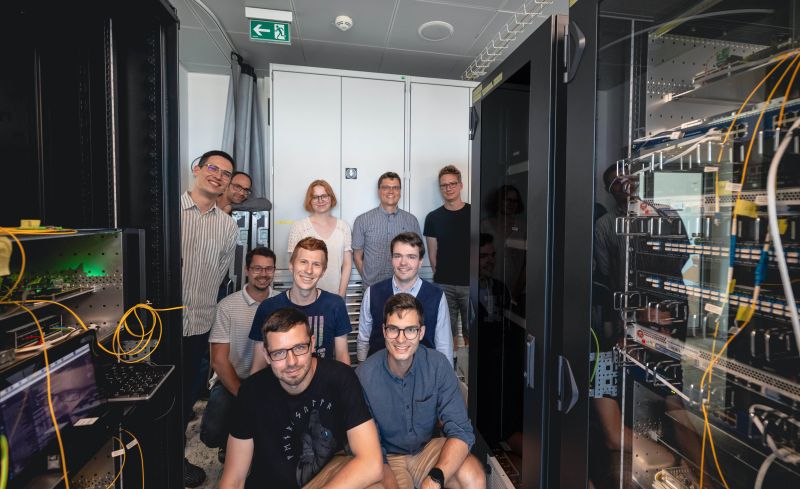
Start of the last QuNET+ projects
The kick-off meetings for ICLink, BlueCert and OptiRoute took place at various locations in March
The QuNET+ICLink kick-off meeting took place on 5 March 2024 at the Institute of Solid State Physics at TU Berlin. Participating institutions such as Skyline Photonics GmbH and the Technical Physics Department of Julius-Maximilians-Universität Würzburg came together to present their projects and work packages and to discuss interfaces between the partners. Even though no photos of the event are available, the participation of renowned institutions shows the great interest and commitment to the development of quantum communication systems.
The QuNET+BluCert project started with a successful kickoff on 13 and 14 March at BearingPoint’s German headquarters in Frankfurt am Main. The kickoff included presentations from all partner organisations as well as three different workshops that paved the way for the upcoming challenges in this project. The project focuses on building a certification lab for quantum key distribution (QKD) technology to overcome the certification hurdles and promote the acceptance of this technology.
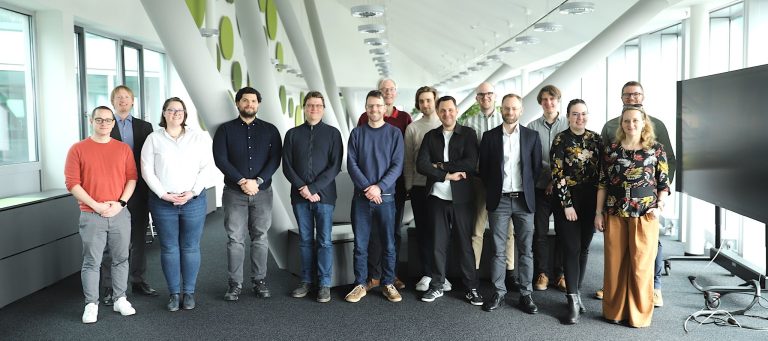
The QuNET+OptiRoute project was successfully launched on 21 March with a kick-off meeting at the Nokia site in Nuremberg. Michael Bärnreuther, project coordinator, emphasised the importance of highly secure communication with quantum technology. The project focuses on simultaneously routing conventional and quantum signals in fibre optic networks in order to advance quantum communication. Nokia is working with partners such as FAU Erlangen-Nuremberg and the Fraunhofer Heinrich Hertz Institute HHI to tackle the challenges over the next three years.
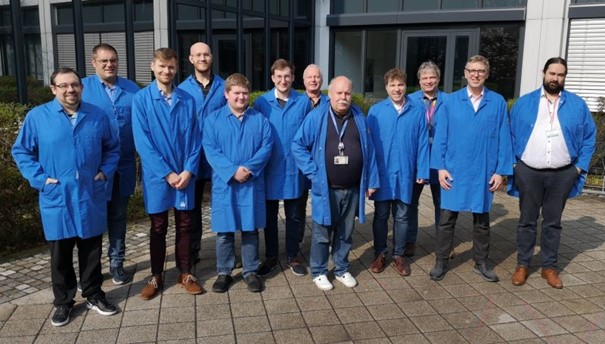
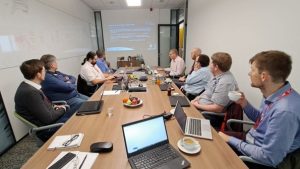
Specialist group meeting of the QuNET initiative
QuNET develops highly secure communication systems based on the latest quantum technology.
In the first week of March, experts Dr Nino Walenta, Jan Krause, Dr Andy Schreier, Stephanie Renneke, Jerome Wiesemann, Dr Moritz Kleinert, Martin Kresse, Dr Patrick Runge and Pascal Rustige met with 54 participants from industry and research as part of the QuNET initiative, including their 12 QuNET+ projects, in our Science Tech Space showroom.
The discussion on how a QKD network for the secure exchange of information between authorities can be realised was particularly exciting. Important research needs were identified in various working groups and future key experiments were planned.

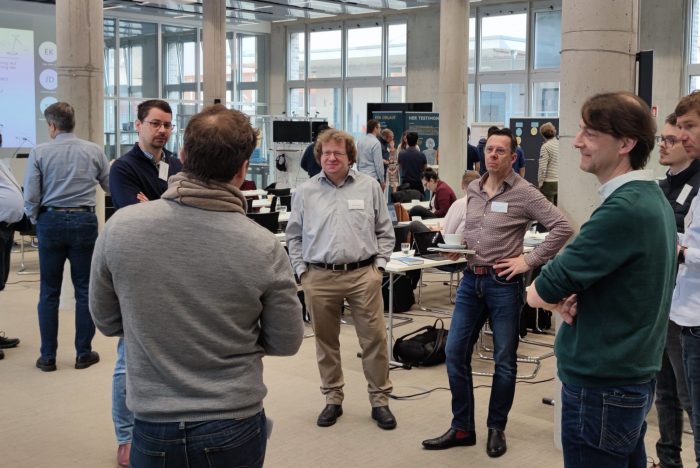
QuNET-Initiative beim Besuch des deutschen Bundespräsidenten
Fraunhofer IOF presents quantum key distribution model to the Federal President as part of the QuNET initiative for highly secure communication systems and emphasises the pioneering role of quantum research in global communication systems.
The QuNET initiative, which is funded by the Federal Ministry of Education and Research, is developing the foundations for highly secure quantum communication systems using state-of-the-art quantum technology. The systems for practically tap-proof communication can thus pave the way for long-term data security and technological sovereignty.
On the occasion of the Federal President’s visit to Fraunhofer IOF last week, QuNET researchers presented a model for quantum key distribution (QKD). It demonstrated the exchange of quantum keys between a satellite and two ground stations. Such a system could one day form the basis for a global quantum network.
Frank-Walter Steinmeier was able to experience the exhibit and the research behind it up close and observe how interference signals can be detected by changing the quantum states.
Fraunhofer IOF is also researching the future of communication with quanta in other projects such as HYPERSPACE, thus emphasising the importance of quantum research in the field of global communication systems.
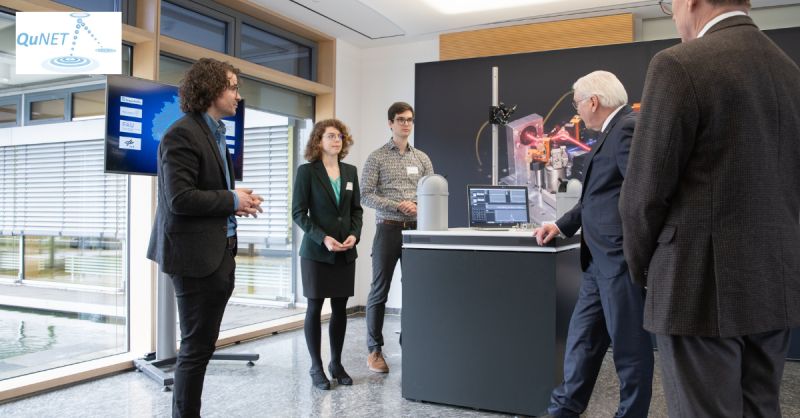
San Francisco /30 January to 01 February 2024
QuNET initiative at the SPIE Photonics West 2024
The QuNET initiative presented its current systems for secure quantum communication at the largest international trade fair for photonic technologies.
From 30 January to 1 February, SPIE Photonics West, the largest international trade fair for the latest developments in the field of optical and photonic technologies, invited representatives from research and industry to San Francisco. The QuNET initiative was also represented at the trade fair with its current technology systems for secure quantum communication.
The consortium was able to show interested visitors the range of its current research into highly secure communication systems using various exhibits. For example, the transmission of entangled quantum states between a satellite and two ground stations was clearly demonstrated using a model for quantum key transmission (QKD). This illustrated the potential of quantum technologies and the systems developed by the QuNET initiative in the field of practically tap-proof communication.
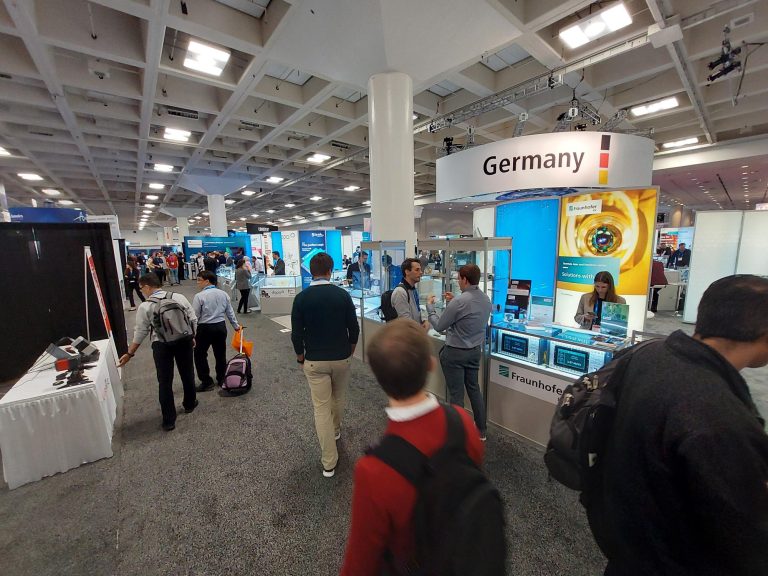
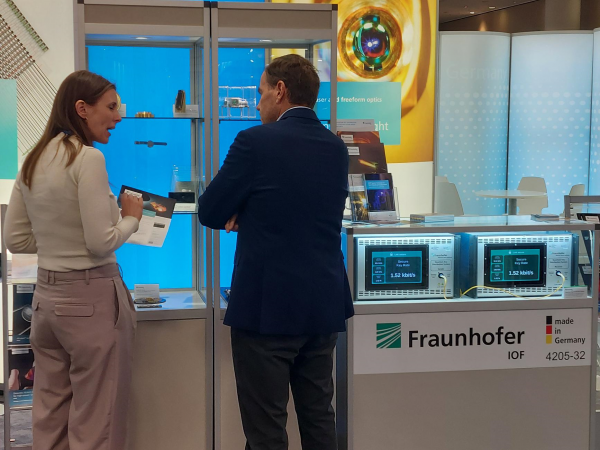
QuNET Initiative at Cyber Security Summit 2023
Quantum key transmission in focus: QuNET initiative presents innovative technologies for secure communication at the Cyber Security Council. Demonstration of quantum key exchange and insight into miniaturized light guides and optics.
On 28 November, the National Cybersecurity Council invited representatives from business, science, politics and civil society to the Cybersecurity Council in Berlin. The QuNET initiative was also on site with an exciting setup for quantum key distribution.
The use of innovative technologies to encrypt data is especially important in the areas of security and defense. To this end, the QuNET initiative is developing highly secure communication systems based on modern quantum technologies.
At the Cyber Security Summit, the QuNET consortium presented a demonstration of a quantum key exchange from one satellite to two ground stations. It was not only possible to learn about quantum state transfer, but also to interact practically with the structure, e.g. by blocking a transmission path. Miniaturized light guides and optics could also be admired through a microscope that showed a transmitter chip for quantum key transmission (QKD).
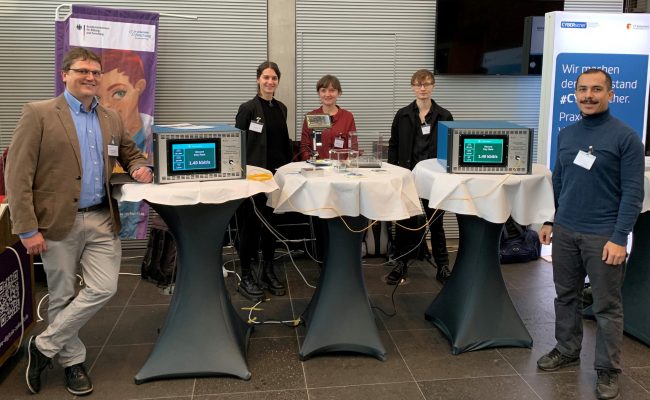
QuNET Initiative at the Digital Summit 2023
Quantum communication to protect digital communications: QuNET initiative presents innovative exhibits on quantum key transmission at the Digital Summit 2023. The development of highly secure systems contributes to the defense of cyber attacks and the protection of the digital society.
Am 20. and On 21 November, the Digital Summit 2023, Market of Digital Opportunities, took place in Jena. Visitors were able to experience a simulation of quantum communication at the Digital Summit, using quantum key exchange between two satellites and a ground station. You could also take a look through a microscope into the world of miniaturized light guides and optics that make up the transmitter chip for key transmission.
Secure communication systems are the core of a digital society. Whether it is the exchange of confidential messages between authorities or the long-term storage of sensitive (company) data: data protection and security are the backbone of the digital society and form the basis of an economy based on innovation.
The QuNET initiative develops highly secure systems based on state-of-the-art quantum technology to protect digital communications from cyber attacks, for example. As part of the Digital Summit, the research consortium will present exciting exhibits on quantum key transmission (QKD).
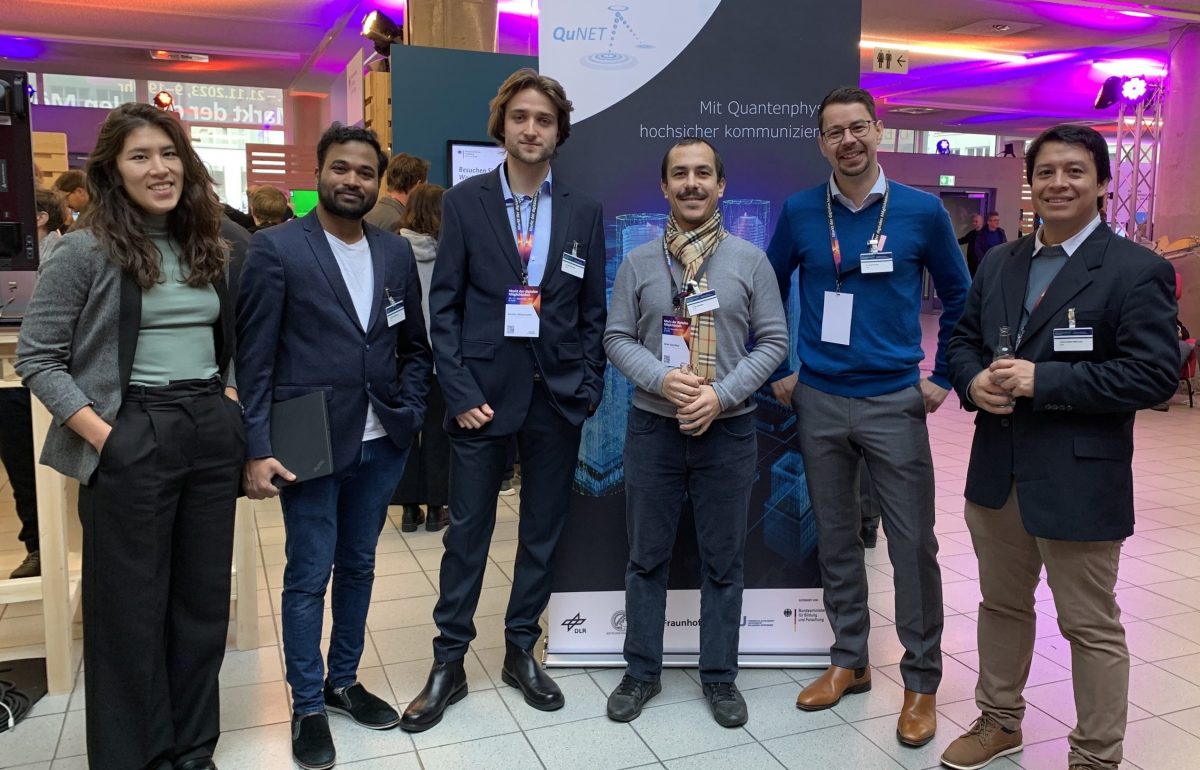
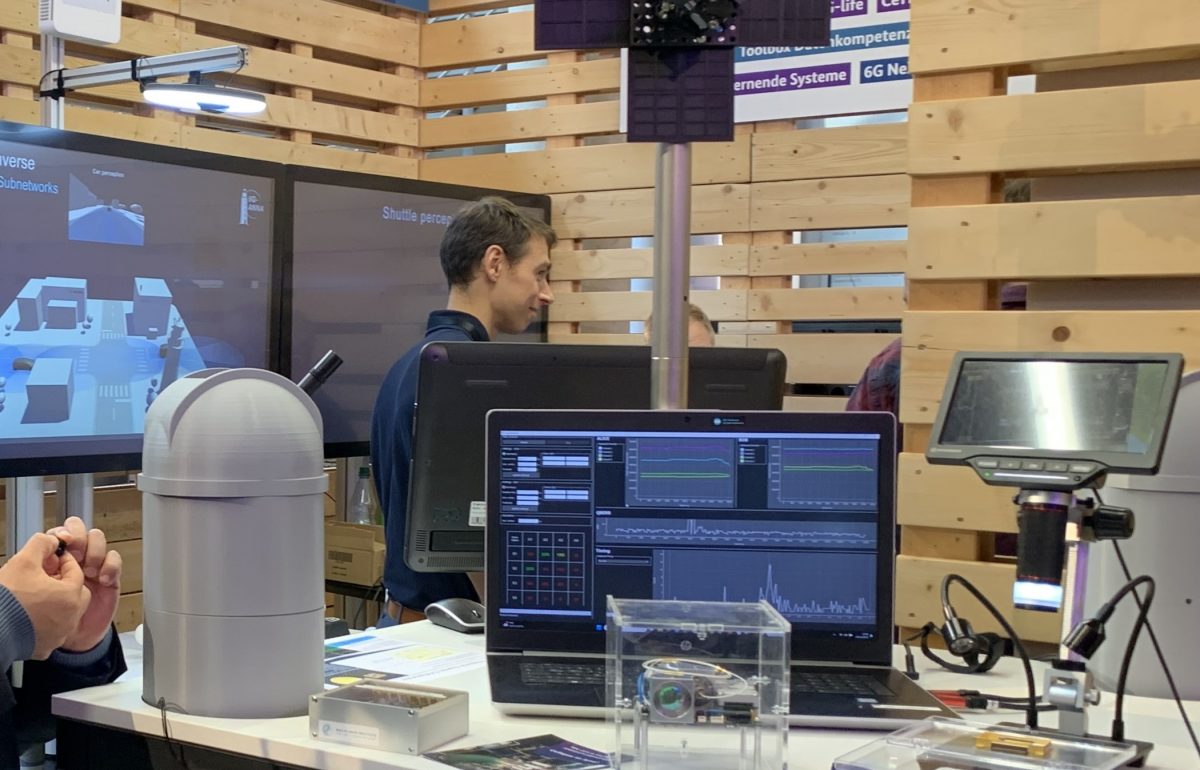
Third QuNET General Assembly in Jena
QuNET consortia discuss project development and future plans at the third general meeting in Jena. Successful key experiment in ad-hoc hybrid-heterogeneous quantum key transmission networks presented.
The third general meeting of the QuNET/QuNET+ consortia took place in Jena from November 9th to 10th. Representatives of the five core institutes: Fraunhofer IOF; Fraunhofer Heinrich Hertz Institute HHI; German Aerospace Center e.V. DLR; Max Planck Institute for the Physics of Light and FAU Erlangen-Nuremberg as well as employees and researchers of the QuNET+ projects, the Federal Ministry of Education and Research, the VDI e.V./VDE spoke about the project development, initial successes and of course about how the projects will develop in the future.
Matthias Goy, researcher at Fraunhofer IOF, gave a lecture on the first successful key experiment 1 on ad-hoc hybrid-heterogeneous quantum key transmission (QKD) networks in metropolitan areas. Our institute director Andreas Tünnermann also reported on current results from the steering committee and took a first look into the future of the QuNET projects. During the meeting, the next key experiments for 2024 and 2025 were also discussed.
In addition, there were two exciting workshops for the participants. The workshop of the Quantum Communication Germany “SQuaD” project focused on technology transfer and standardization. In a qp-tech.edu training course on the topic of “Introduction to quantum technologies”, the participants dealt with quantum imaging, quantum sensors and metrology. The theoretical impulses were underpinned by practical experiments.
“This was the first face-to-face meeting of this kind for the QuNET initiative. It was therefore impressive to see how closely the individual projects have already grown together and are working towards a common goal,” summarizes Dr. Friederike Fohlmeister (DLR), the third QuNET general meeting.
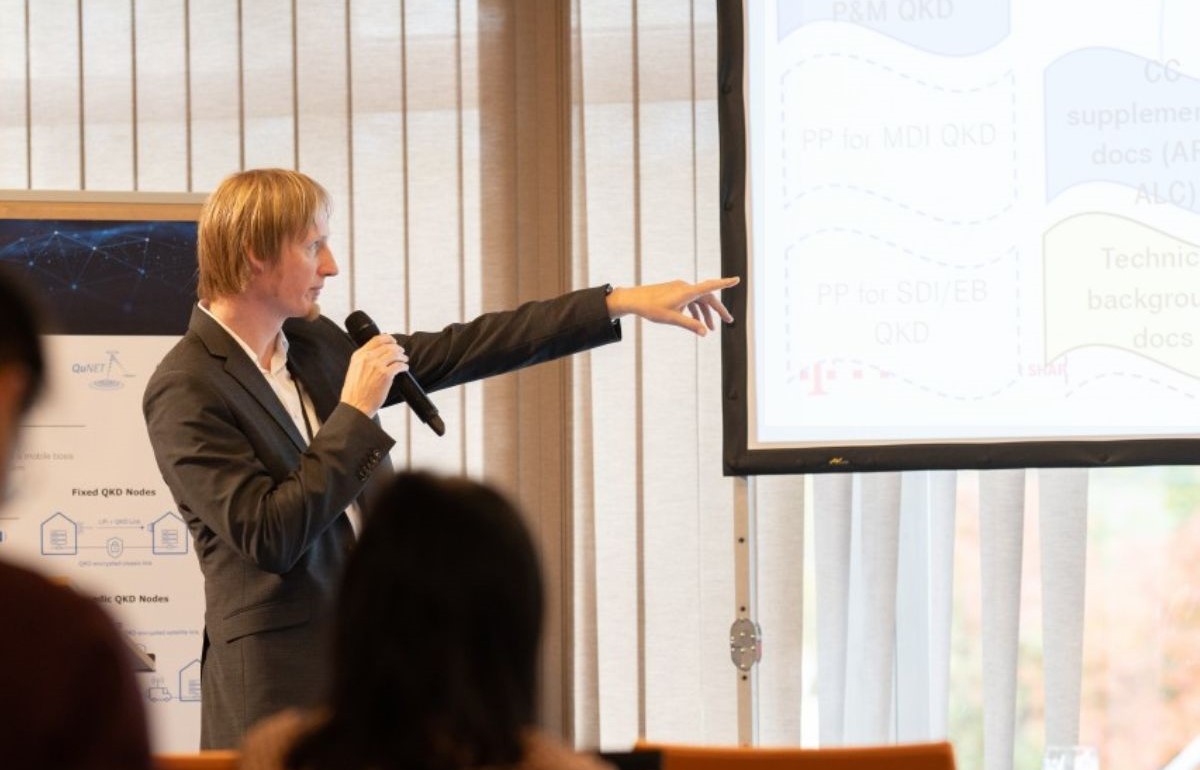
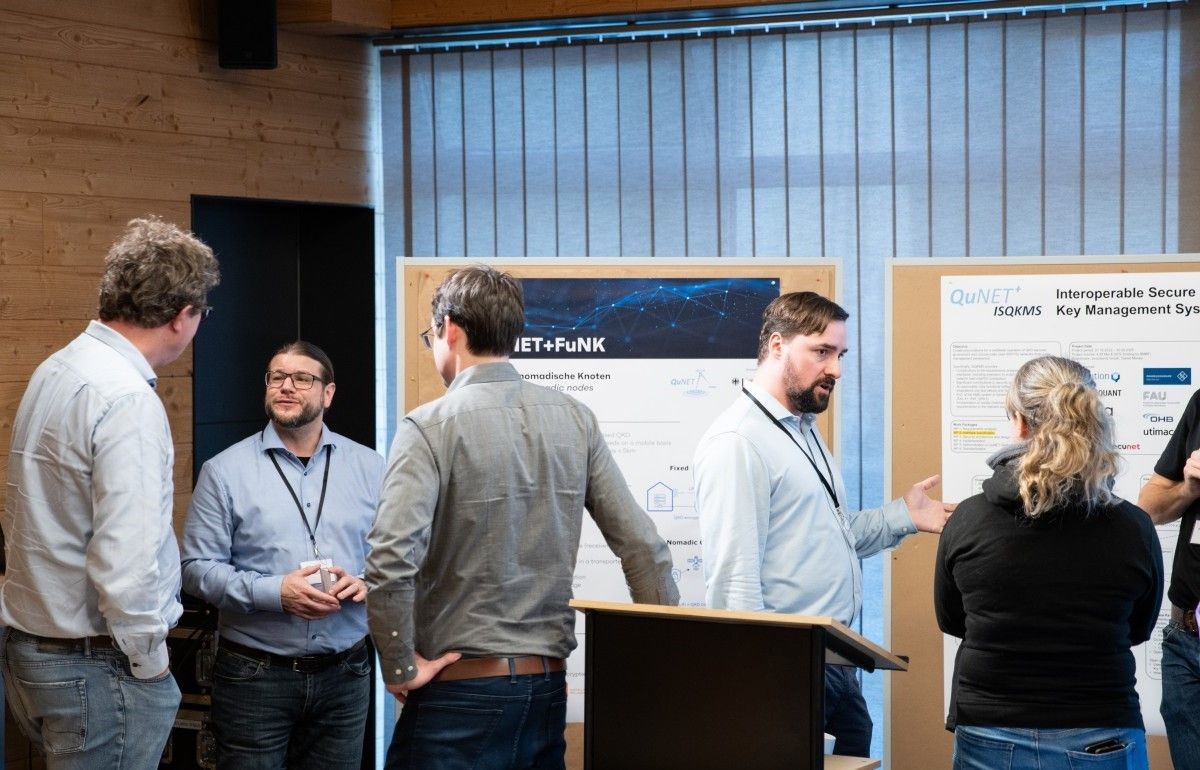
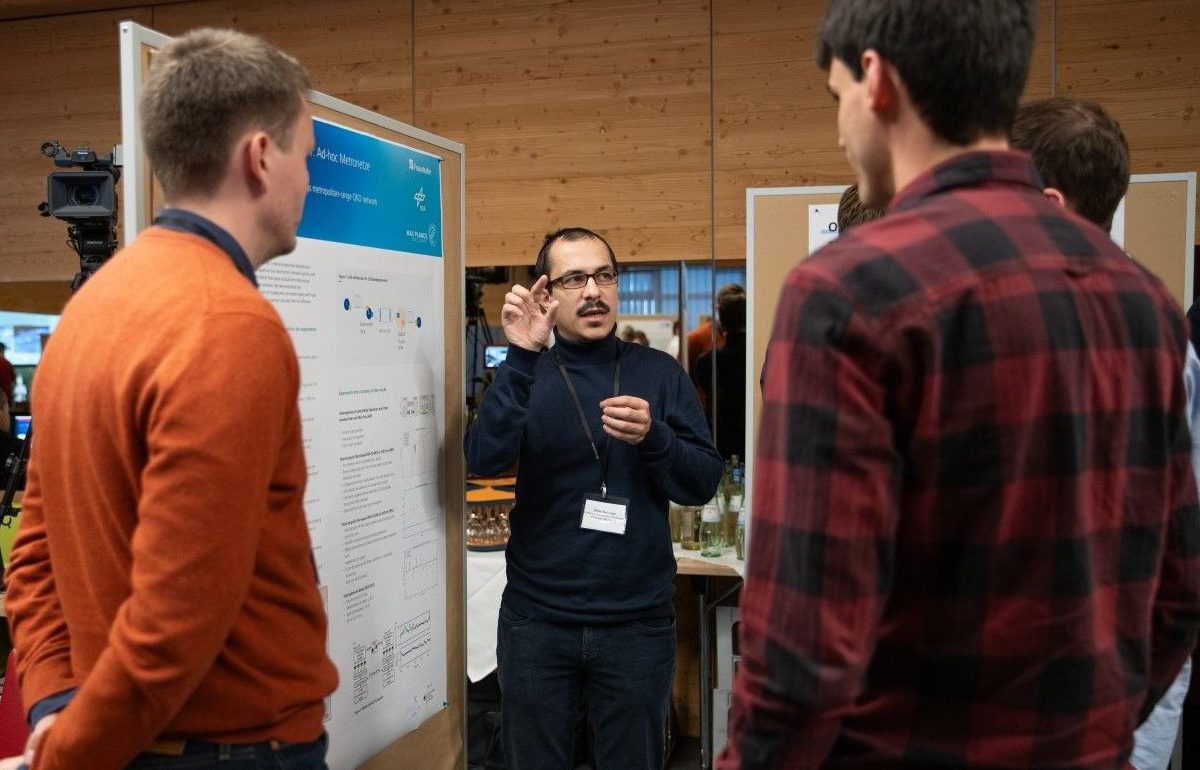
Towards secure communication of the future
Researchers from Jena, Berlin, Erlangen and Wessling have successfully exchanged quantum keys between two points using a combination of free-space and fiber connections. The experiment was carried out as part of the QuNET initiative, a pilot project funded by the Federal Ministry of Education and Research (BMBF).
Another milestone has been reached on the way to highly secure communication of the future. In a key experiment, the institutes involved – the Max Planck Institute for the Physics of Light, the Friedrich-Alexander University Erlangen-Nuremberg, the DLR Institute of Communications and Navigation as well as the two Fraunhofer Institutes for Applied Optics and Precision Mechanics IOF and the Heinrich Hertz Institute HHI – showed that quantum-secure point-to-point connections can be realized. As part of a key experiment, they established a quantum-secure connection on a test track almost two kilometers long in Jena. They combined transmissions of quantum keys via free-space and fiber connections and achieved transmission rates in the kilobit range per second during the day.
To gain an insight into what was happening, the Federal Ministry of Education and Research (BMBF) and VDI/VDE Innovation Technology visited the experiment in Jena on May 23, 2023. Daniel Behrendt (BMBF), Dirk Ziemann (BMBF), Fabienne Haupert (VDI/VDE) and Kristian Döbrich (VDI/VDE) visited the laboratories and locations of the experiment. The representatives of the individual institutes – Florian Moll (DLR), Ömer Bayraktar (MPL), Nino Walenta (HHI), Anja Milde, Andreas Tünnermann, Thorsten Goebel, Fabian Steinlechner and Matthias Goy (all IOF) – then discussed current and future challenges in the field of data security and quantum communication with the delegation.
You can find the full press release from Fraunhofer IOF here.
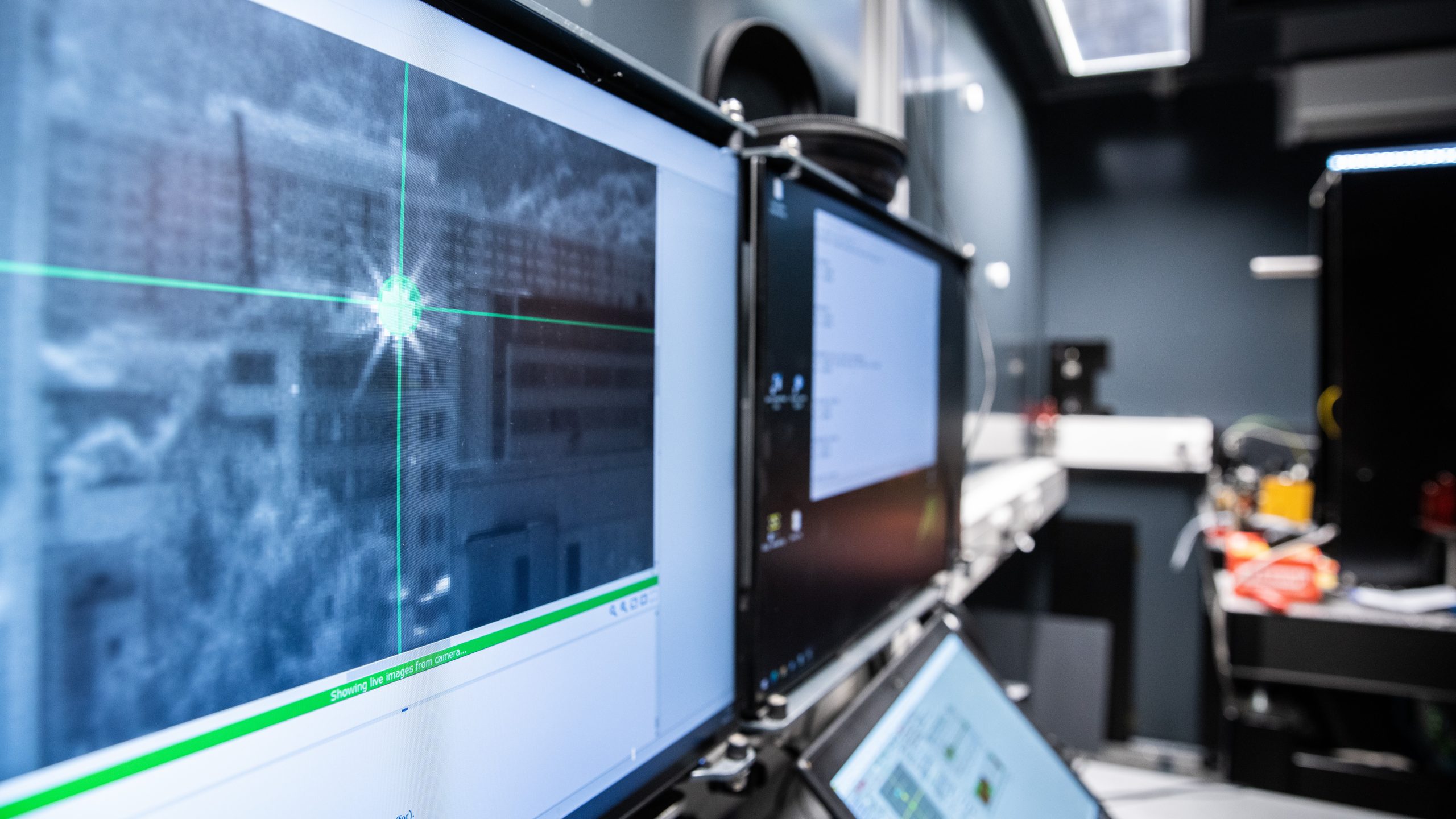
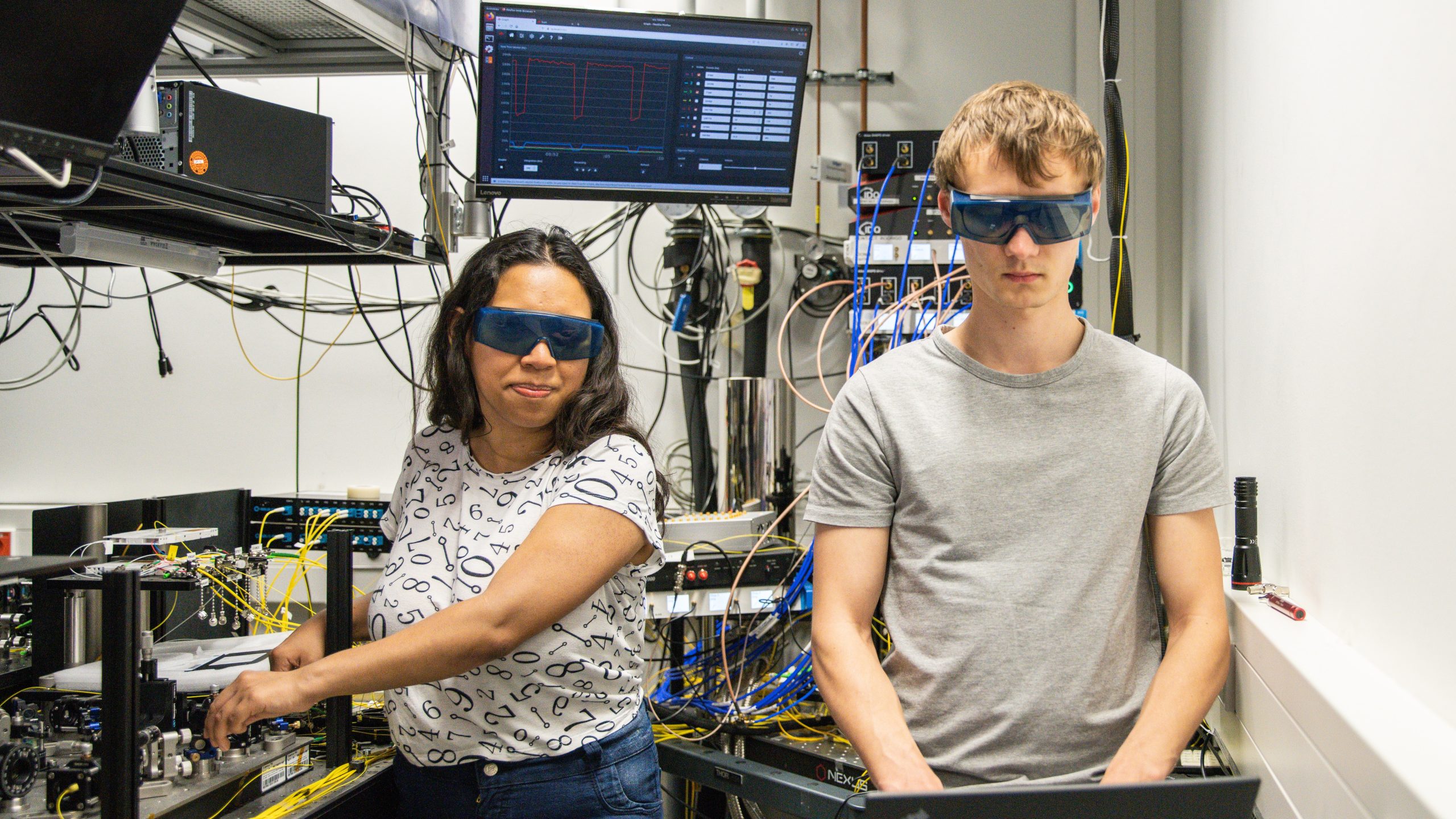
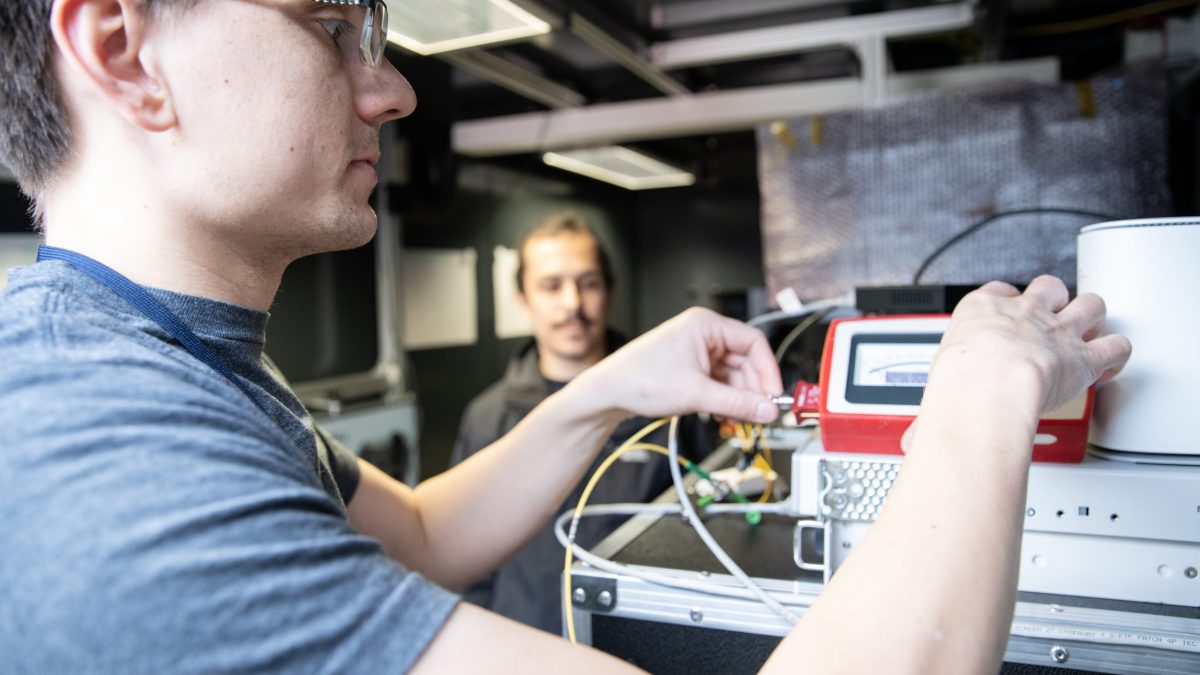
Stark-Watzinger: Secure Germany's place at the forefront of quantum technologies
The federal government, together with scientific organizations, is providing three billion euros for future technology.
The Federal Cabinet today approved the quantum technology action plan. It was developed under the leadership of the Federal Ministry of Education and Research (BMBF).
“Quantum technologies are a key technology of the future with enormous potential for our society and economy. Their applications range from the simulation of new drug ingredients to tap-proof communication. With the new action plan, we want to secure Germany’s place at the forefront of quantum technologies and our technological sovereignty. The action plan forms the common political framework and focuses on three fields of action: putting quantum technologies into practice, driving forward technology development in a targeted manner, and creating excellent framework conditions for a strong ecosystem. The Federal Government, together with the scientific organizations, will provide around three billion euros for this purpose.”
Background
The quantum technologies action plan forms the coordinating strategic framework for the Federal Government’s activities in quantum technologies in the years 2023 to 2026. The Federal Government is providing a total of 2.18 billion euros for this purpose. The scientific organizations are contributing 850 million euros. Under the leadership of the Federal Ministry of Education and Research (BMBF), the Federal Ministry for Economic Affairs and Climate Protection (BMWK), the Federal Ministry of Finance (BMF), the Federal Ministry of the Interior and Home Affairs (BMI), the Federal Ministry of Defense (BMVg), the Federal Ministry of Health (BMG) and the Federal Ministry for Digital and Transport (BMDV) contributed to the draft of the action plan.
The cross-departmental concept is divided into three fields of action: The first field of action deals with the development of application-ready products, which will help Germany to take a self-determined path in international competition. The second field of action focuses on targeted technology development. Germany is to become a key player, particularly in the field of quantum computing, and secure future markets by helping to shape standards and norms. The third field of action focuses on promoting a strong ecosystem. The focus here is on founders, networking between science and business, and the creation and expansion of a strong skilled workforce.
More information
www.bmbf.de/handlungskonzept-quantentechnologien
www.quantentechnologien.de/handlungskonzept-quantentechnologien
QuNET at Hannover Messe 2023
After a break of almost three years, the Hannover Messe 2023 took place again in its usual format for the first time. From April 17th to April 21st, around 4,000 companies from mechanical engineering, the electrical and digital industries, and the energy industry presented their technologies and solutions for a networked and climate-neutral industry. The Federal Ministry of Education and Research (BMBF) is also represented there with its QuNET project. Friederike Fohlmeister from the German Aerospace Center (DLR) and Roman Mouchel from the Fraunhofer Institute for Applied Optics and Precision Engineering IOF were on site to answer questions and provide suggestions to the numerous visitors.
Among those interested was Federal Minister of Education and Research Bettina Stark-Watzinger, who visited the stand on the first day of the fair.
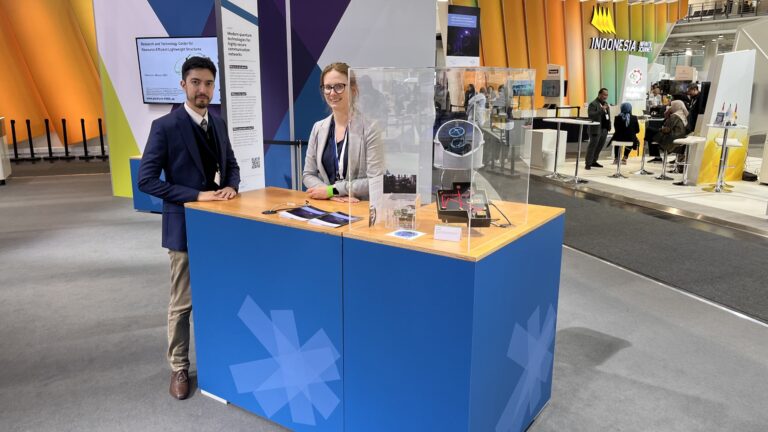
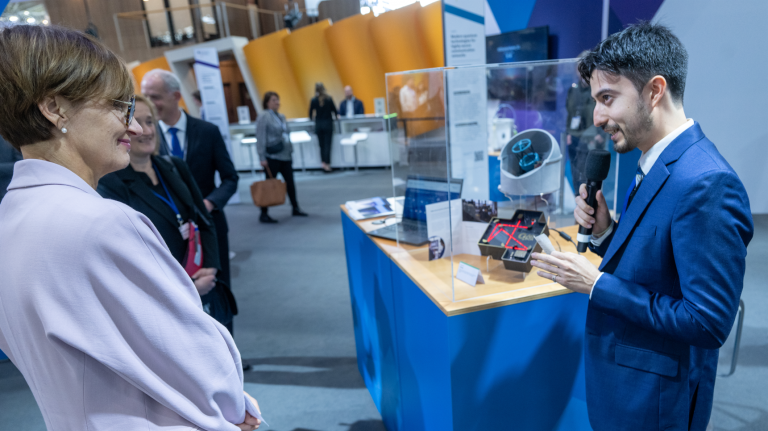
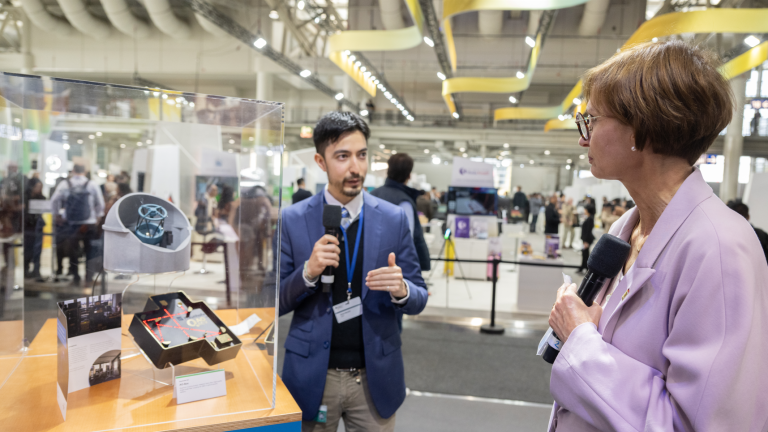
National Conference on IT Security Research of the BMBF
The Federal Ministry of Education and Research (BMBF) is organizing the National Conference on IT Security Research 2023 (#its_konf23) from March 13 to 15, 2023. The motto is: “Strengthening the digitally networked society.”
At the event in Cafe Moskau in Berlin, participants can expect a varied program of scientific and socio-political content in the form of discussions, presentations, exhibitions and workshops.
All important information about the conference can be found here www.forschung-it-sicherheit-kommunikationssysteme.de/nationale-konferenz-it-sicherheitsforschung-2023
Specialist group meeting of the QuNET initiative
From February 28 to March 1, 2023, 65 members of the specialist groups met at the Fraunhofer Institute for Applied Optics and Precision Engineering in Jena. The aim of the meeting was to exchange information on the latest research. The first day began with a presentation of the overall network architecture and security aspects. This was followed by a presentation of components and interfaces as well as scenarios and key experiments. After each presentation, a World Café was held in which the experts could exchange ideas on the current state of research. The last item on the program was the poster session, with each QuNET+ project being presented using a poster. The first day ended with a shared dinner.
The second day of the meeting focused on the free-beam and fiber systems. After the presentations of these systems, further World Cafés followed, with the focus on the exchange of ideas between the participants. At the end of the meeting, a general summary of the new findings was given, followed by the farewell of the participants.
At the specialist group meeting, many insights were gained, contacts were made and the work of the QuNET initiative was advanced. We would like to thank all participants who contributed to the success of the meeting and look forward to the next meeting.
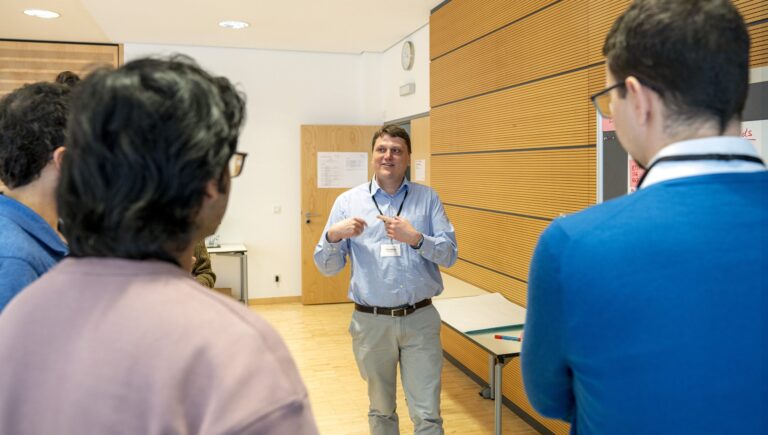
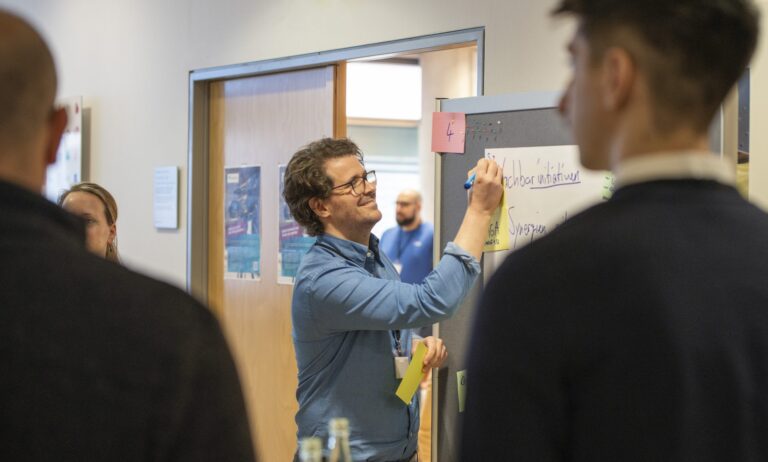
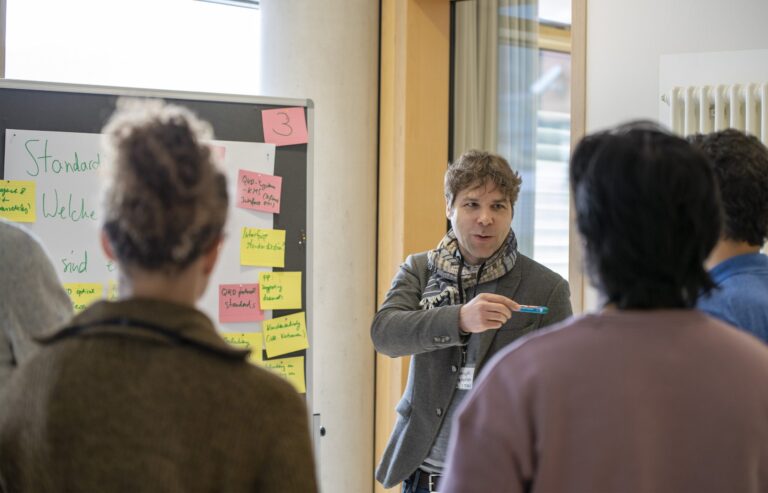
Start of the Bavarian state initiative »QuKomIn«
The Bavarian project »Quantum communication infrastructure (QuKomIn)« started at the beginning of November 2022. The aim of the initiative is to set up a real test infrastructure for quantum communication in the form of a fiber optic network with satellite connection and application centers in the Erlangen/Nuremberg and Munich/Oberpfaffenhofen area. The specific route of the fiber optic network has already been examined in a feasibility study funded by the Free State of Bavaria. The focus of QuKomIn will be on the needs of the authorities and industrial users. As part of the Bavaria-Saxony-Thuringia state initiatives, QuKomIn is in close communication with the QuNET initiative.
The project is managed by the Max Planck Institute for the Physics of Light in Erlangen. The Friedrich-Alexander University Erlangen-Nuremberg (Department of Physics), the Fraunhofer Institute for Integrated Circuits, the German Aerospace Center (Institute for Communications and Navigation) and the Ludwig Maximilian University of Munich (Faculty of Physics) are also involved as project partners. The initiative is funded by the Bavarian State Ministry for Economic Affairs, Regional Development and Energy with funds totaling around €15 million. The duration is 5 years.
QuNET as exhibitor at SPIE Photonics West 2023
SPIE Photonics West took place in San Francisco, USA, from January 31 to February 1, 2023. It is one of the largest photonics trade fairs in the world and is accompanied by an optics and photonics conference. Around 22,000 visitors from over 85 countries were on site to view the more than 1,400 international exhibitors. The QuNET initiative was also represented there with exhibits and colleagues. Many visitors came to the booth and showed a strong interest in the latest developments in the field of quantum technologies. Exhibits were on display from the German Aerospace Center (DLR) Institute of Communications and Navigation and the Fraunhofer Institute for Optics and Precision Engineering IOF, among others.
Friedrich-Alexander University as fifth consortium partner
Prof. Dr. Christoph Marquardt, sub-project leader at the Max Planck Institute for the Science of Light (MPL) in Erlangen, has been appointed to the newly created chair for Optical Quantum Technologies at the Friedrich-Alexander University Erlangen-Nuremberg (FAU). This means that part of the research group, which is significantly involved in QuNET and develops systems for quantum key exchange and entanglement sources, is moving from the MPL to FAU. FAU has therefore been a consortium partner in the QuNET joint project since January 1, 2023.
Umbrella project SQuaD brings together key partners
Germany is pooling its expertise in quantum communication to enable secure transmission of information. After intensive research in the field of quantum-based key distribution, the technological leap into the economy is now imminent: From September 2022, the Federal Ministry of Education and Research will be funding 36 facilities in the innovation hub for quantum communication to network research institutes and companies. The Fraunhofer Institute for Applied Optics and Precision Engineering IOF and its spin-off Quantum Optics Jena are also involved as partners in the accompanying umbrella project Quantum Communication Germany, or SQuaD for short.
SQuaD is coordinated by the Federal Institute of Physics and Technology (PTB) in close cooperation with the Federal Office for Information Security (BSI). Other partners are:
- Keequant GmbH, Fürth
- Quantum Business Network UG, Munich
- Saarland University, Saarbrücken
- Fraunhofer Institute for Systems and Innovation Research ISI, Karlsruhe
- Fraunhofer Institute for Applied Optics and Precision Engineering IOF, Jena
- Fraunhofer Heinrich Hertz Institute HHI, Berlin
- Leibniz University, Hanover
- Quantum Optics GmbH, Jena
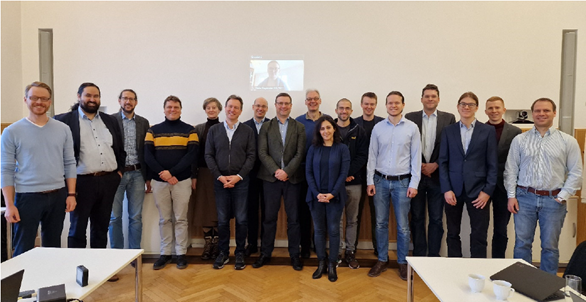
QuNET General Meeting 2022
The QuNET initiative is a pilot project of the Federal Ministry of Education and Research (BMBF) for research into highly secure quantum communication. On Tuesday, 15 November, the partners invite you to the virtual general meeting. The afternoon programme is open to the public and is therefore open to all interested participants.
With its public programme section, the QuNET General Assembly aims to give all interested parties the opportunity to learn more about the partners and goals of the QuNET project. The work of the initiative is also highly interdisciplinary. As a result, new research questions are constantly being identified during the course of the project and integrated into the further course of the initiative. As a result, so-called QuNET+ projects have already been established, which transfer the research results into application under the leadership of an industrial partner. As individual consortia, they complement the central research work of the QuNET partners in the field of tap-proof quantum communication. The General Assembly gives participants the opportunity to familiarise themselves with these QuNET+ projects in detail.
The General Assembly will take place online via MS Teams. Participation is free of charge. The event language is German.
Nobel Prize for quantum research
It was a special moment for an entire research community: quantum researchers Alain Aspect, John F. Clauser and Anton Zeilinger were awarded the 2022 Nobel Prize in Physics. The Royal Swedish Academy of Sciences in Stockholm honoured a field of research that is becoming increasingly important.
The work of the prizewinners, especially Anton Zeilinger, has also inspired researchers at the Fraunhofer IOF. For example, they provided insights for the development of an entangled photon source and the application of quantum entanglement for quantum communication and quantum imaging.
Quantum communication is also at the centre of the QuNET project, a pilot project funded by the Federal Ministry of Education and Research (BMBF) for research into tap-proof communication. Furthermore, the “InteQuant” project, which is being carried out in cooperation with the Institute of Quantum Optics and Quantum Information IQOQI, is working on the development of innovative hardware for quantum communication.
We would like to express our deepest appreciation to the award winners for their ground-breaking work and thank them for the important contribution they have made to quantum research to date.
Participation in the Federal Government Open Day 2022
Numerous visitors took part in the Federal Government’s Open Day on 20 and 21 August 2022 in Berlin. In addition to the opportunity to take a tour of the building, various projects funded by the BMBF were exhibited. In this context, QuNET presented the topic of quantum key distribution over long distances using satellites. A laboratory model of a satellite transmission unit (laser terminal, original size) for quantum key distribution and the model of a possible ground station for receiving the quantum signal were shown. The entire transmission scenario was presented and technically explained at the stand.
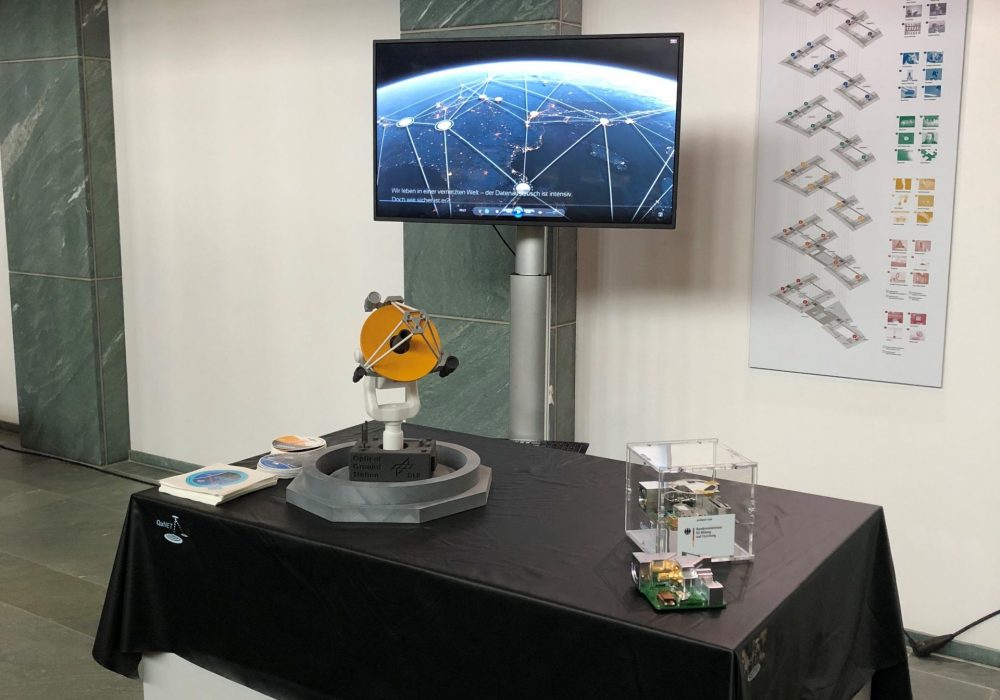
The QuNET initiative stand was visited by Minister Stark-Watzinger on Saturday, the day of the opening. On the following Sunday, State Secretary Judith Pirscher visited the exhibitions. The topic of quantum key distribution met with great interest. Visitors included families, schoolchildren, students and other interested parties. During the open day, there were numerous discussions and a varied exchange of ideas.
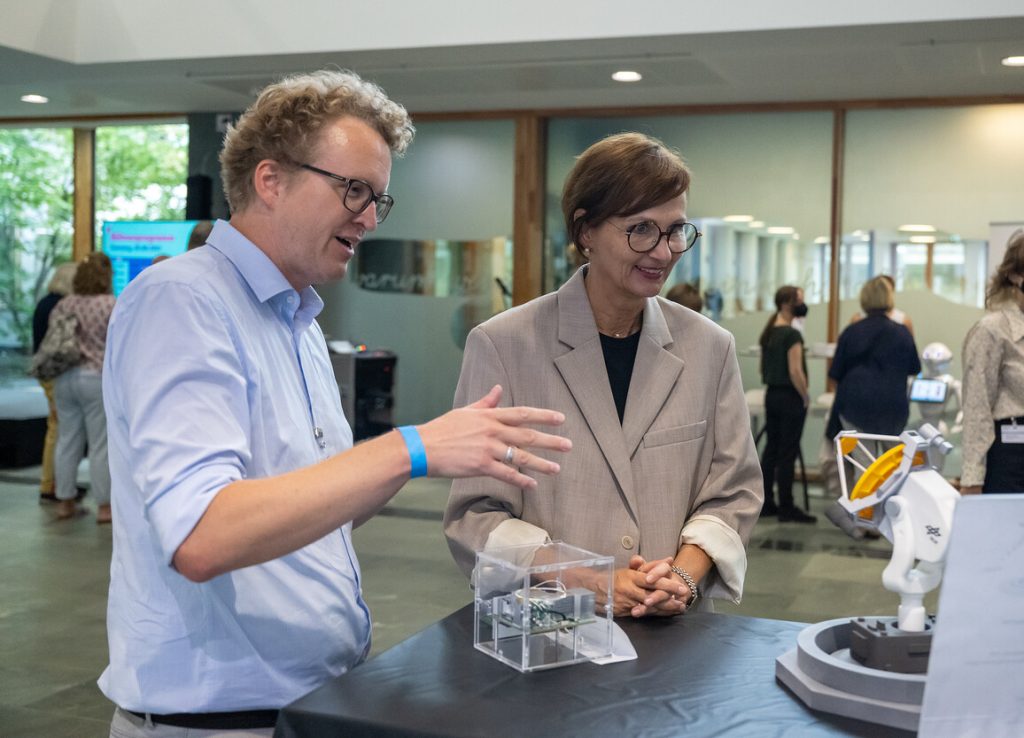
First successful exchange of quantum keys between Erfurt and Jena via optical fibre
With eleven million euros, the Thuringian Ministry of Science has supported the development of an infrastructure for quantum communication networks in the Free State. This also includes a fiber-based test track between Jena and Erfurt. Now, partners of the Fraunhofer Institute for Applied Optics and Precision Mechanics IOF have successfully exchanged quantum keys for the first time on the 75 km track.
The full press release is available at this link.
First version of the QKD ecosystem map for Germany
The first version of the QKD ecosystem map has been released. An overview of all QKD partners in Germany can be found here. To download the complete overview, click on this link. The map is updated once a year to keep the overview of the German QKD landscape up-to-date and accessible.
In order to establish contact with the QKD contact persons in the listed companies and institutions, the QuNET-Office (qunet-office-iof.fraunhofer.de) can be contacted.
Review of 2021, goals for 2022 and new workshop dates
The QuNET initiative, which has been funded by the Federal Ministry of Education and Research BMBF since 2019, looks back on a successful year in 2021: a first QKD-secure video conference in an official environment was demonstrated between the BSI and the BMBF in Bonn.
The four core institutes of the Fraunhofer-Gesellschaft FhG-HHI & IOF, the German Aerospace Center DLR-IKN and the Max Planck-Gesellschaft MPG-MPL and, since 2022, other partners from industry and science are continuing to research the physical and technical foundations of quantum key distribution (QKD). The aim is to create greater security and technological sovereignty, especially in official communication application scenarios.
Important for the success of the initiative is to further expand the economic and scientific ecosystem of quantum secure, application-oriented communication using QKD and to attract suitable partners for this purpose. Following the first QuNET partner workshop in April 2021, first so-called QuNET+ projects were launched with the support of the BMBF. These are useful in order to make QKD usable in particular for use in an official context.
In 2022, QuNET+ projects will be launched in an intensified and focused manner in order to exploit the full potential of the German industrial and scientific landscape and to make important contributions to the implementation of the QuNET initiative in synergy with the work of the core institutes.
First quantum-secured video conference between two federal authorities
QuNET initiative demonstrates highly secure and practical quantum communication
It was a foretaste of the communication of the future – or rather: the “data security” of the future. Because when Federal Research Minister Anja Karliczek hosted a video conference with the Federal Office for Information Security (BSI) today, everything was apparently the same, at least for outsiders. Together with Andreas Könen, Head of Department CI “Cyber and IT Security” at the Federal Ministry of the Interior, Building and Community (BMI) and BSI Vice President Dr Gerhard Schabhüser, the Minister spoke via video stream.
This video conference opens a new chapter in the highly secure communication of the future. Because what the eye cannot see: The conversation was not encrypted using conventional methods, but by means of light quanta. The trick here is that if an attacker tries to access the keys used for data transmission, the light particles are manipulated. This can be proven by the sender and receiver, thus preventing an eavesdropping attempt. The proof is based on physical principles. If an eavesdropping attack is detected, the key is discarded and a new one generated. This strategy achieves long-term security of the agreed keys. This represents a new milestone for the confidentiality of data in a digital world.
A new chapter for the highly secure communication of the future
This so-called »Quantum communication« especially against the backdrop of future technological developments: Quantum computers and new algorithms are expected to be able to crack conventional data encryption methods in the future. According to the motto “Store now, decrypt later”, data can already be stored today and read out later, e.g. with the help of more powerful computers.
Data with long-term protection requirements, i.e. data that will still be of great value to hackers in the distant future, is particularly at risk. This includes not only information from governments and authorities, but also company secrets and citizens’ personal health data.
Federal Research Minister Anja Karliczek explained:
»Quantum communication is one of the decisive key technologies in IT security and can equip us for future threat scenarios. This is important because security and sovereignty in the network are prerequisites for a stable democracy. That is why I launched the QuNET initiative two years ago. It is an important driver for the implementation of research results from basic research into quantum communication in systems suitable for everyday use. The aim is to create the basis for an ecosystem of manufacturers and providers of quantum communication solutions in Germany with the work of QuNET and the other projects in the field of quantum communication funded by the Federal Ministry of Education and Research. This will enable us to bring innovative technologies and components into widespread use in a timely manner.«
In order to protect the privacy of citizens, states and companies in the future, there is already a great need for action today. This is not just about developing new and highly secure communication systems based on quantum expertise, but also about finding ways to integrate this new technology into existing IT infrastructures (e.g. fibre optic cables) and taking established cryptographic processes into account. Long distances also pose a particular challenge. Satellites can play a key role here.
Long-term data security through quantum encryption
The QuNET initiative aims to enable long-term data security. Towards this goal, researchers from all participating institutes have now realised the first quantum-based video conference between the BMBF and the BSI in Bonn. The QuNET work focusses on the so-called “quantum key exchange”, also known as QKD (short for “quantum key distribution”). QKD enables the exchange of symmetric keys whose security can be quantified. The BSI is supporting the QuNET initiative and is preparing accompanying and independent test criteria in international cooperation.
At the end of last year, the research organisations involved in the initiative – the Fraunhofer-Gesellschaft, the Max Planck Society and the German Aerospace Centre (DLR) – presented important foundations for modern and secure communication standards. The scientists have further developed the overall architecture for systems for quantum-safe communication, as well as possibilities for exchanging quantum keys over long, medium and short distances using free-beam and fibre systems.
A new chapter for the highly secure communication of the future
Start: Autumn 2019
Duration: 7 years
Funding organisation: Federal Ministry of Education and Research
Volume: 125 million euros of funding planned
Participating institutes: Fraunhofer Institute for Applied Optics and Precision Engineering IOF, Fraunhofer Heinrich Hertz Institute (HHI), Max Planck Institute for the Science of Light (MPL), DLR Institute of Communications and Navigation
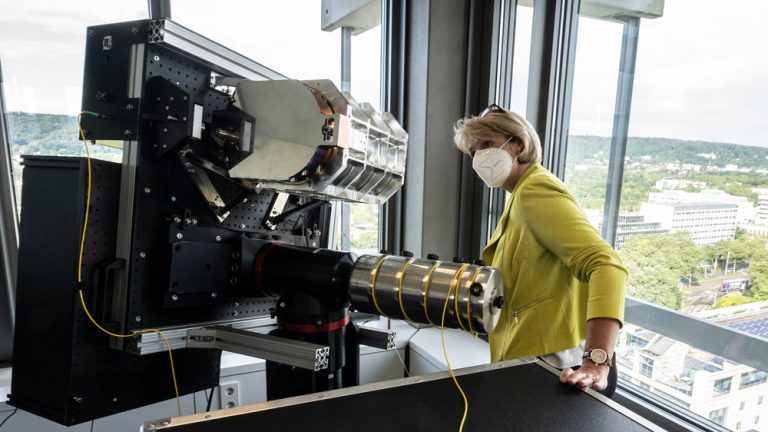
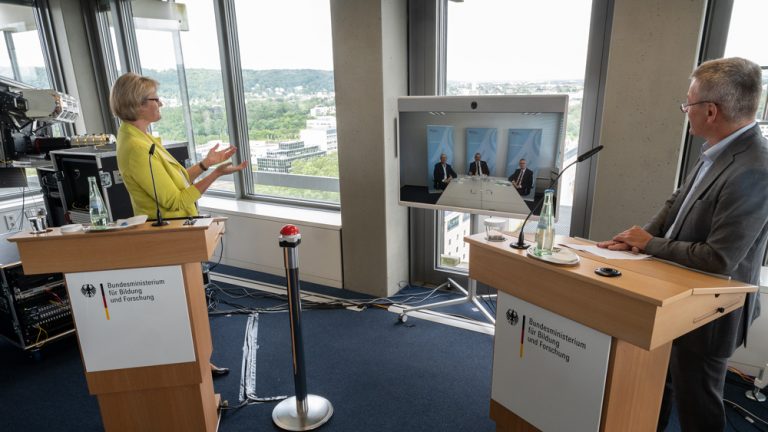
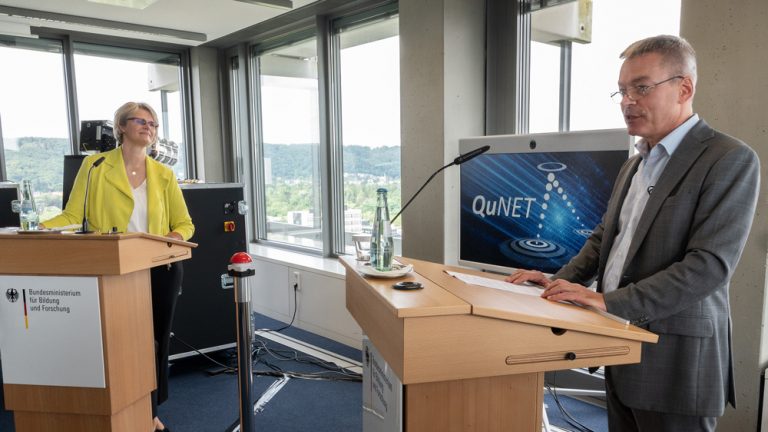
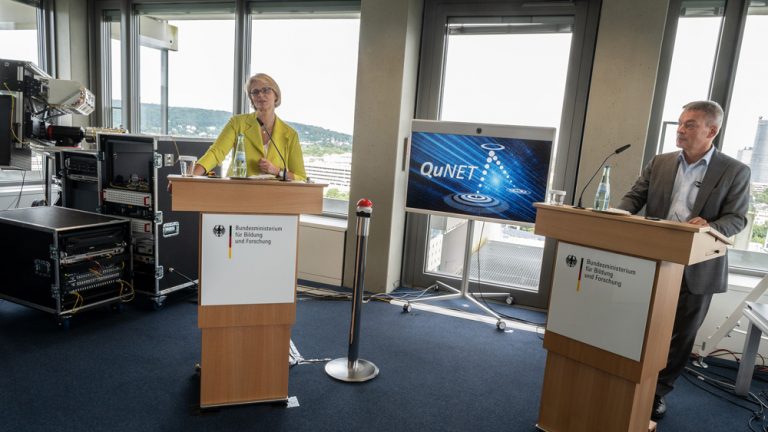
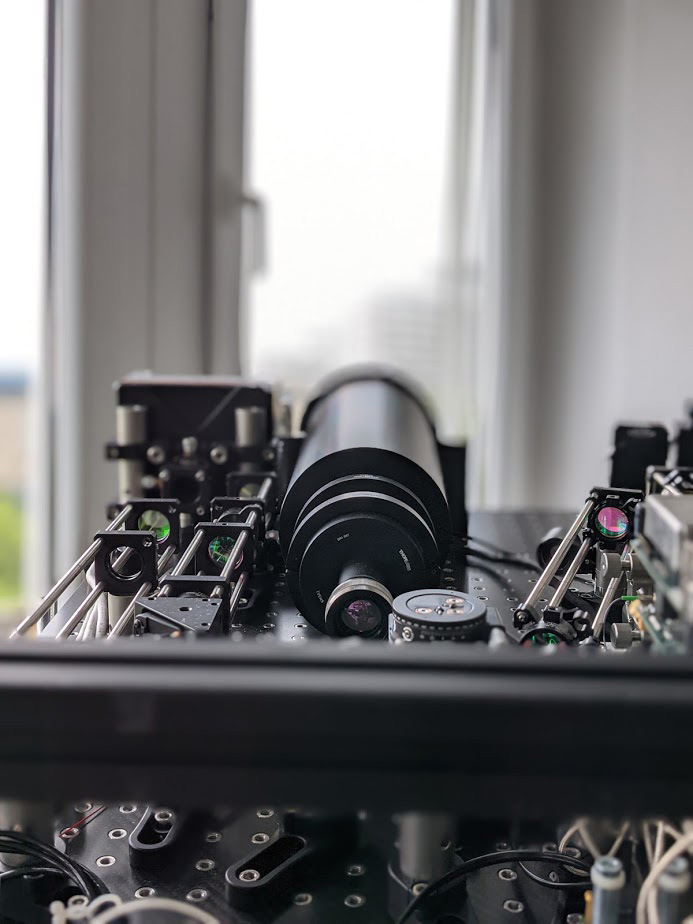
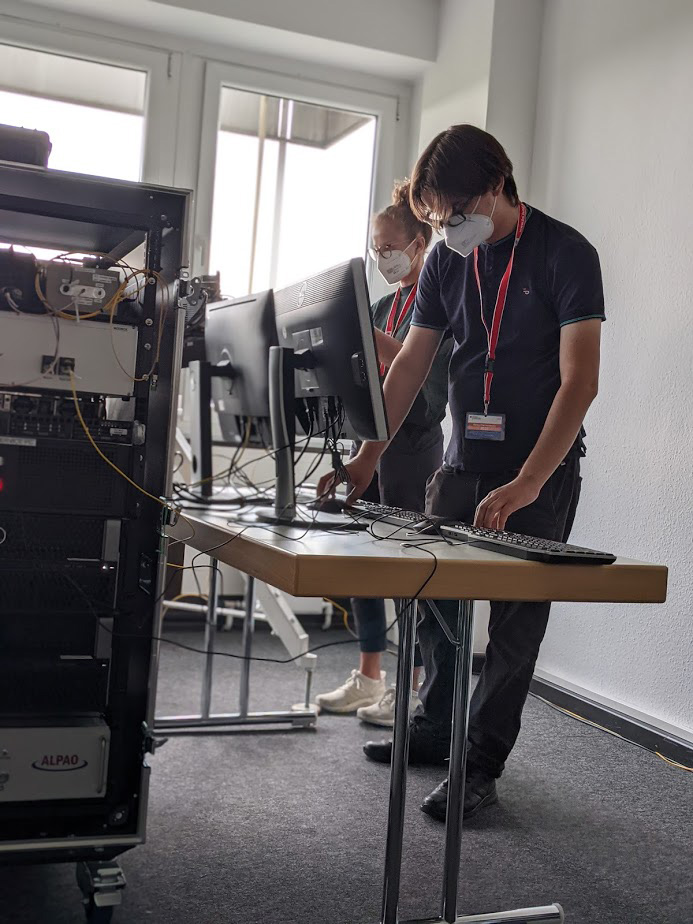
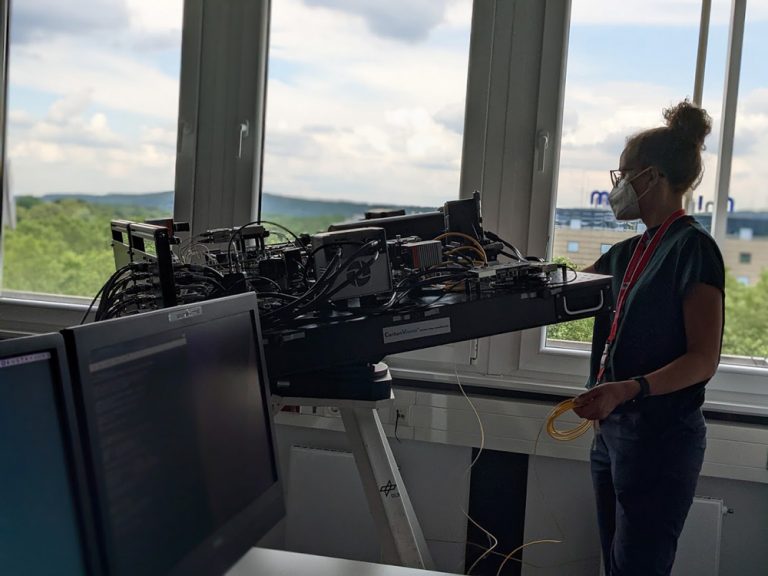
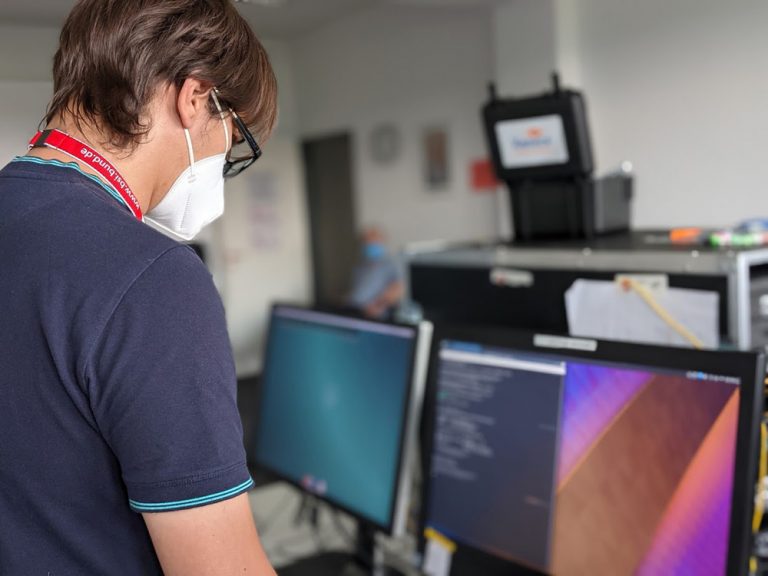
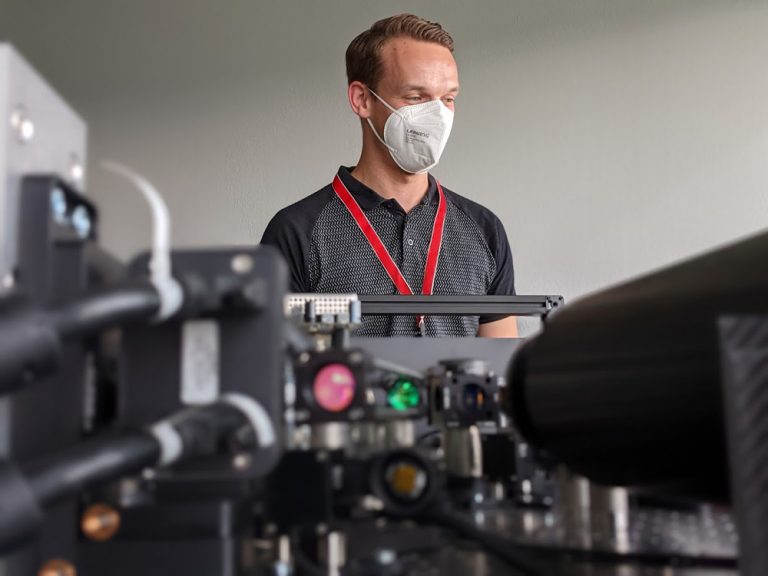
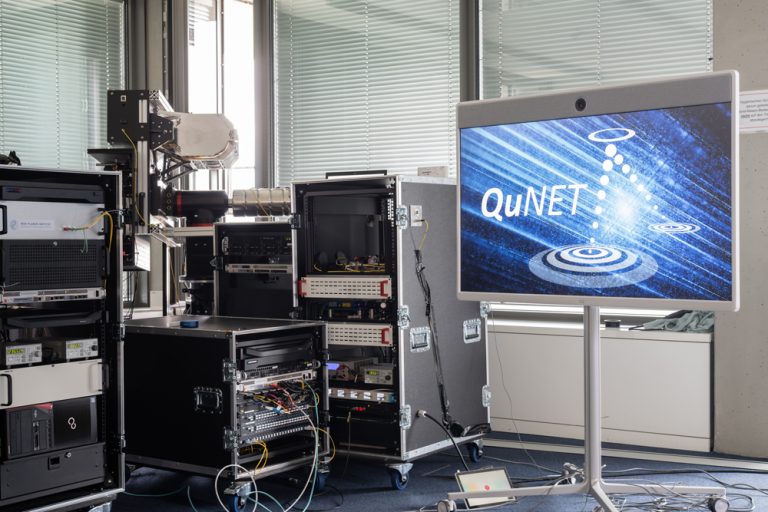
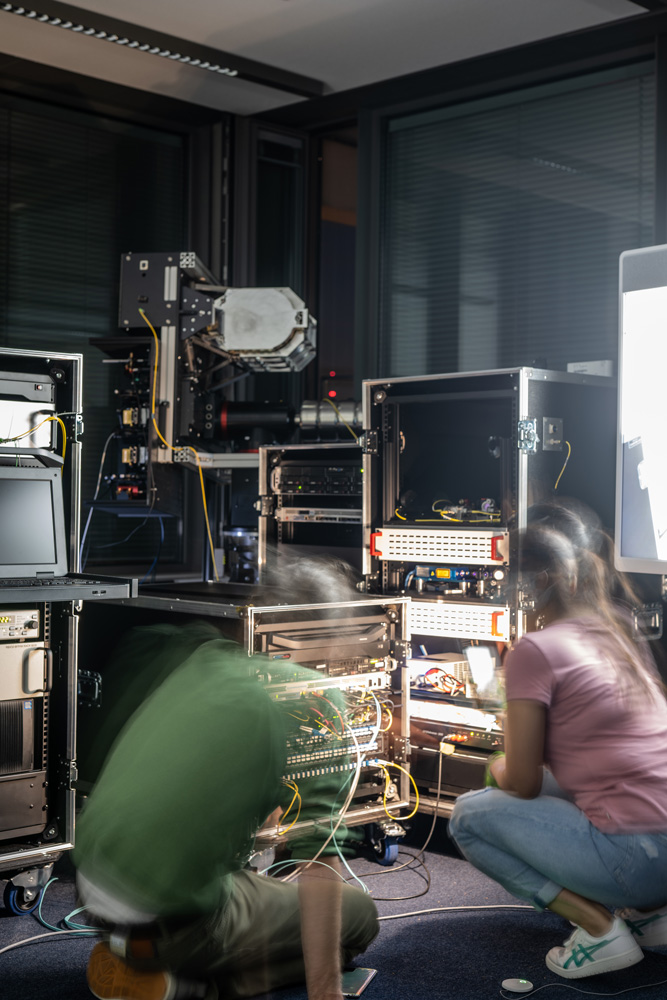
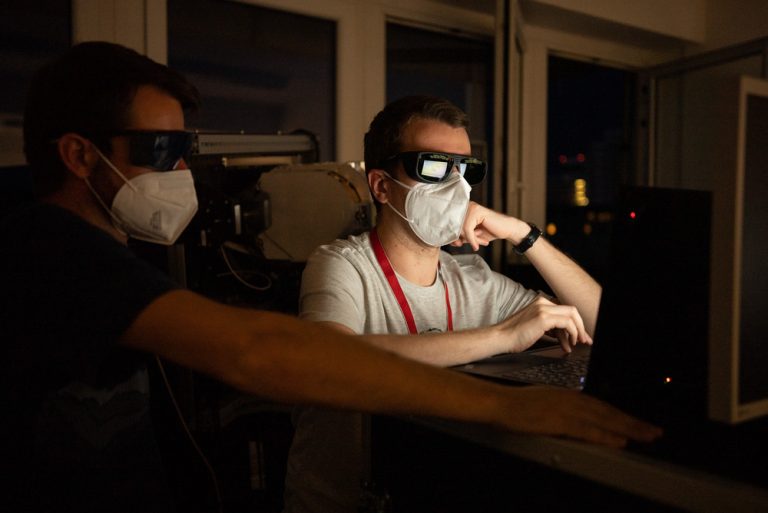
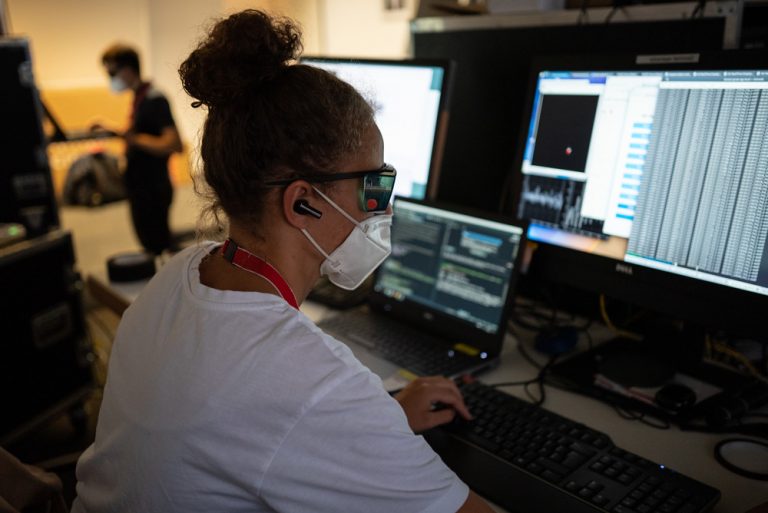
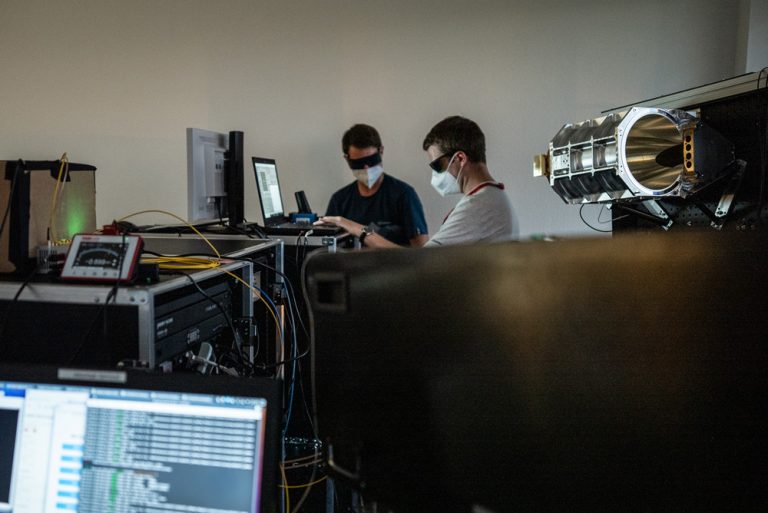
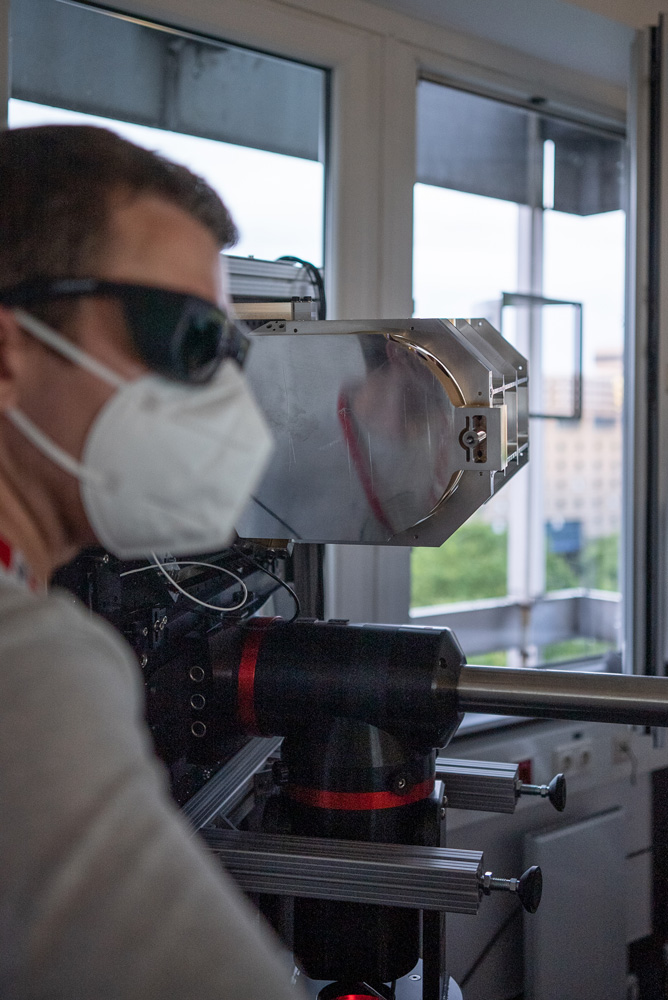
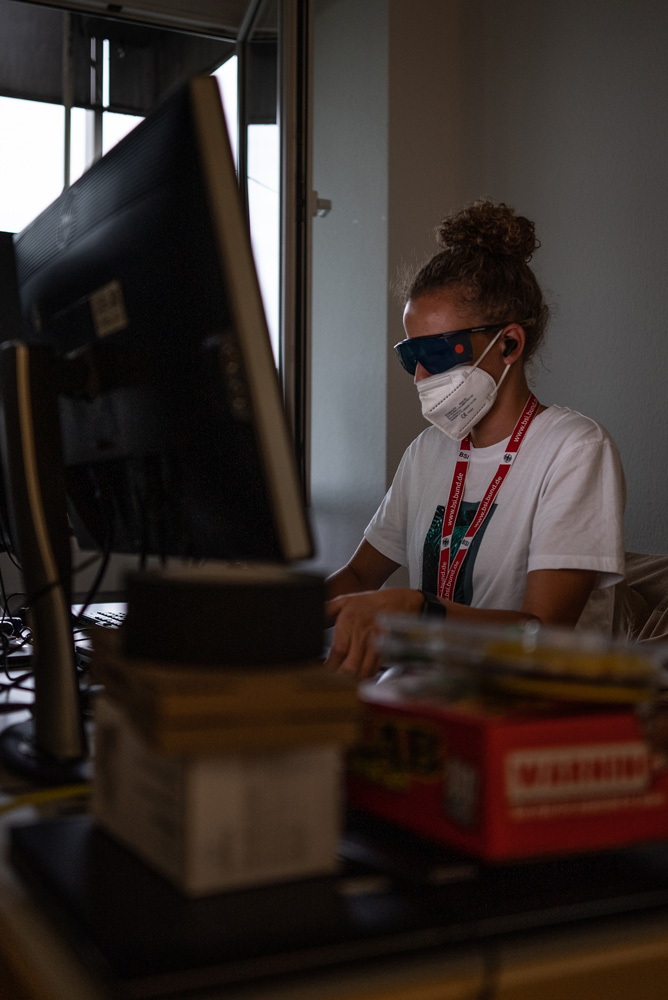
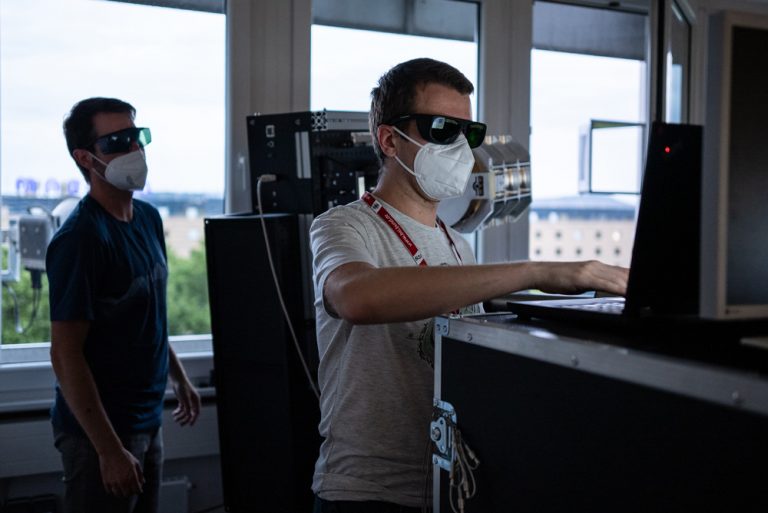
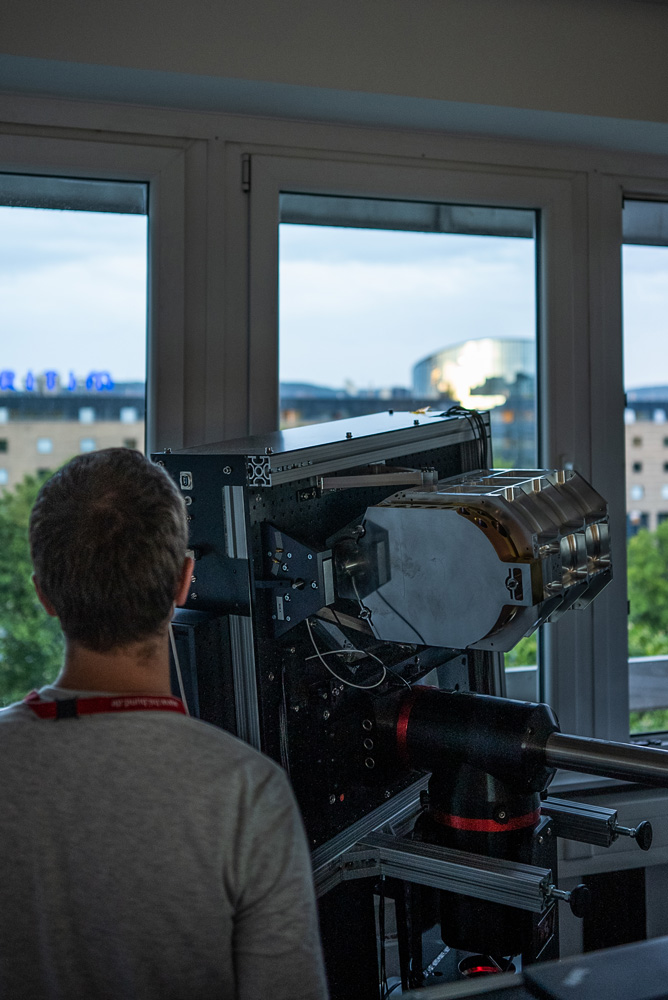
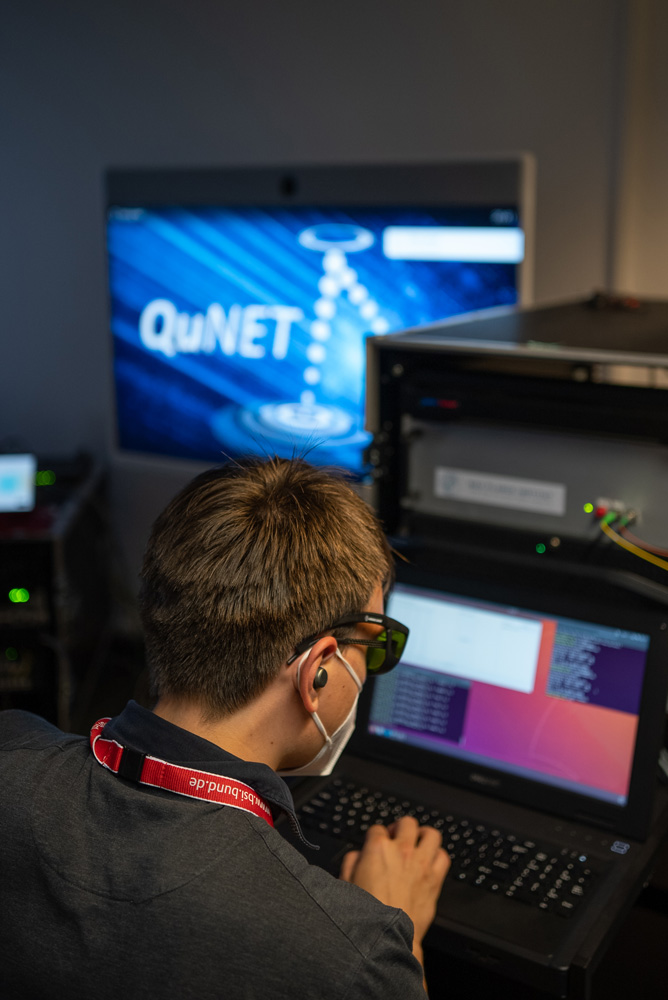
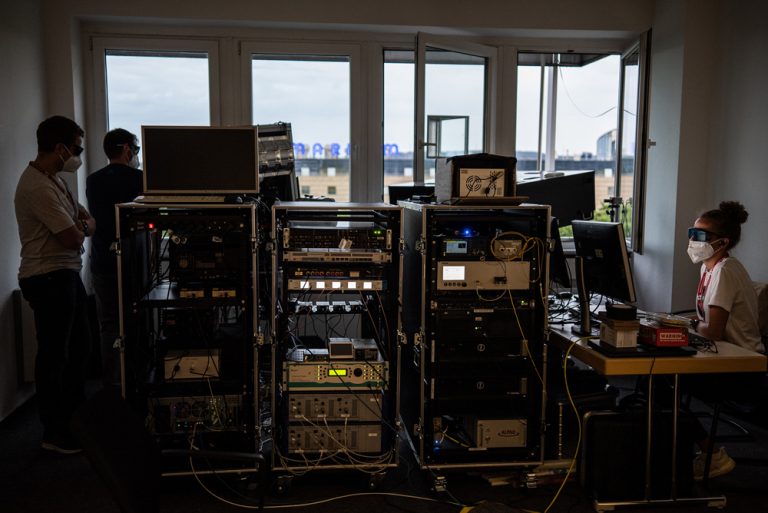
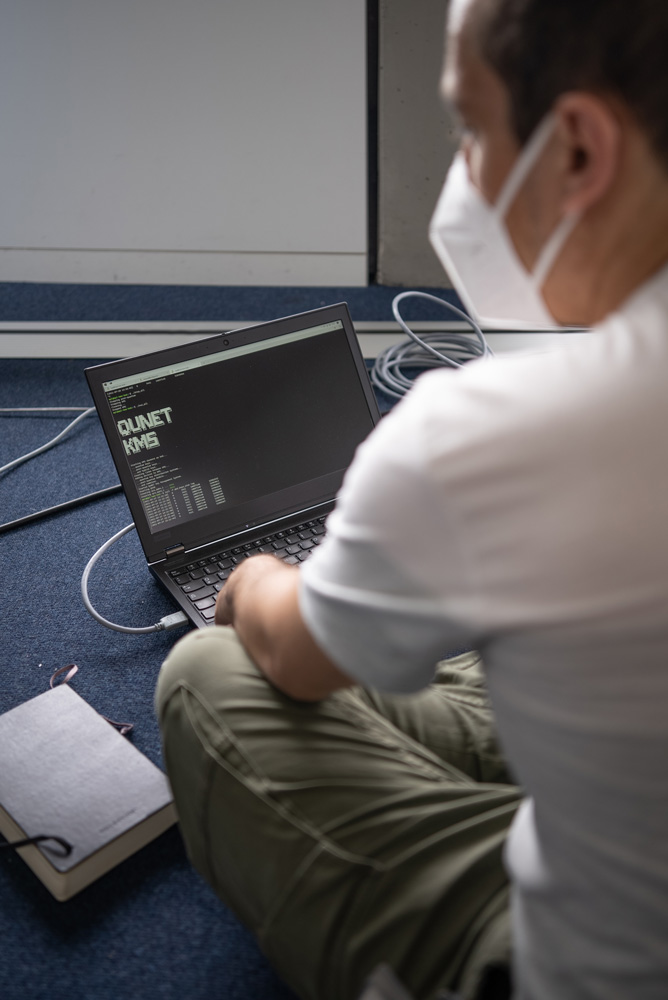
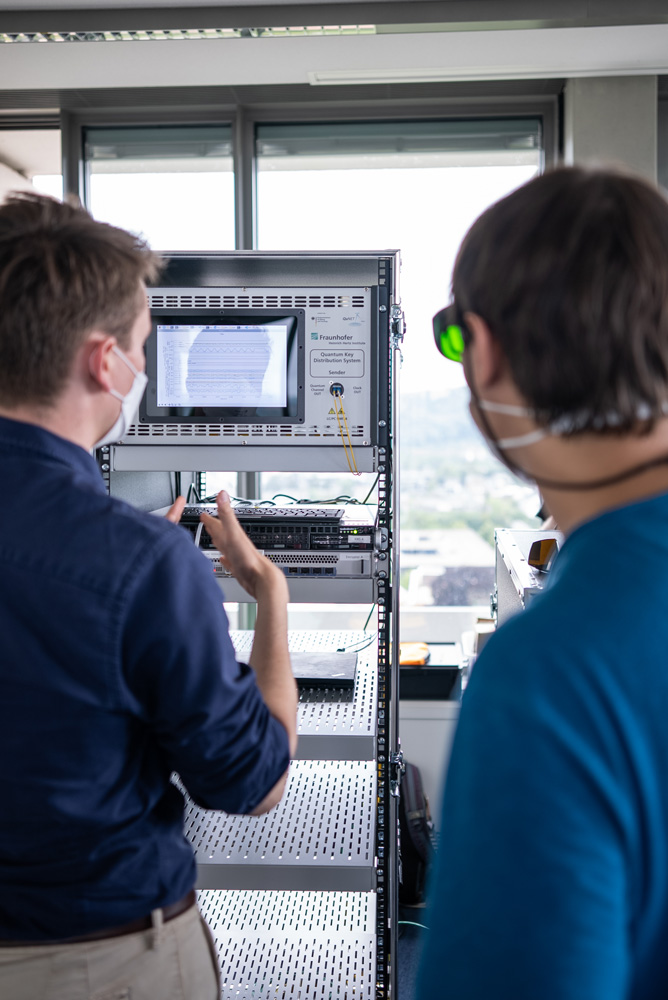
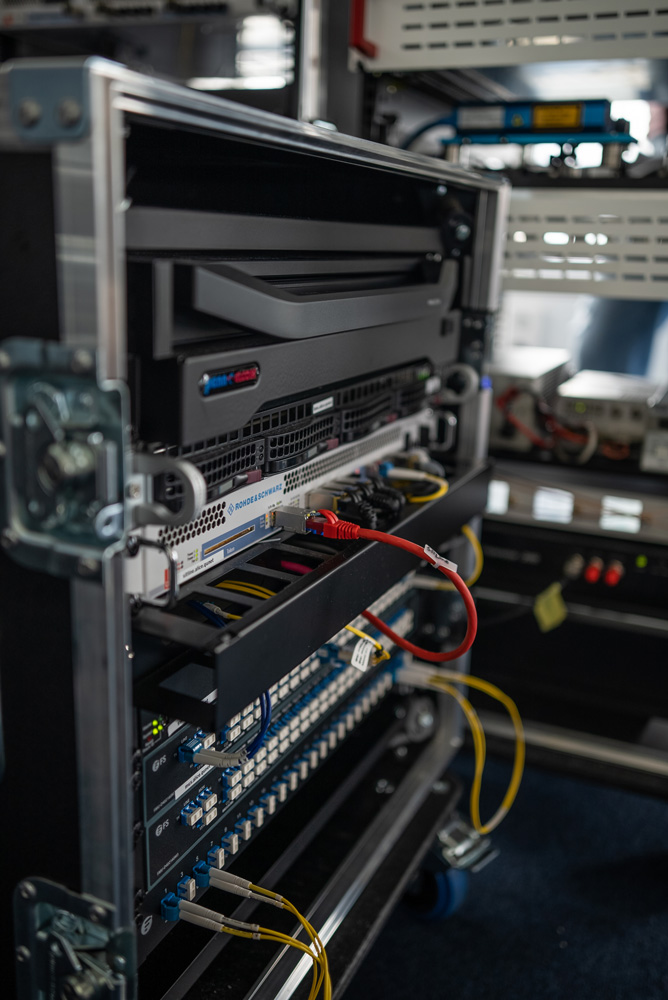
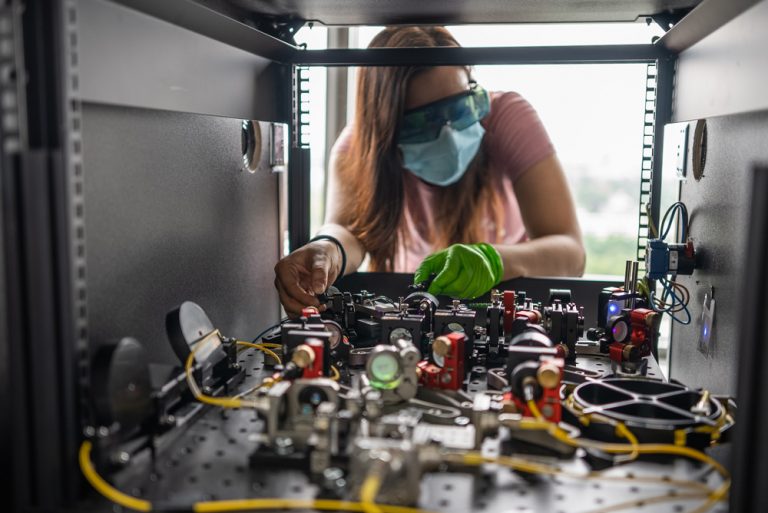
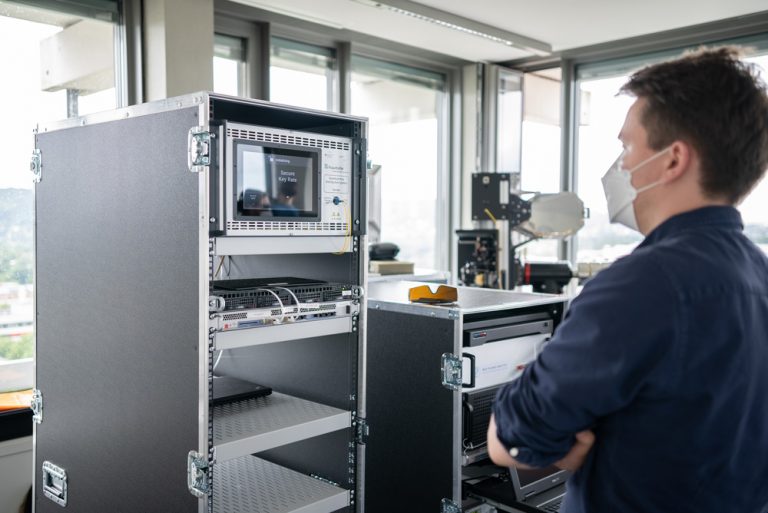
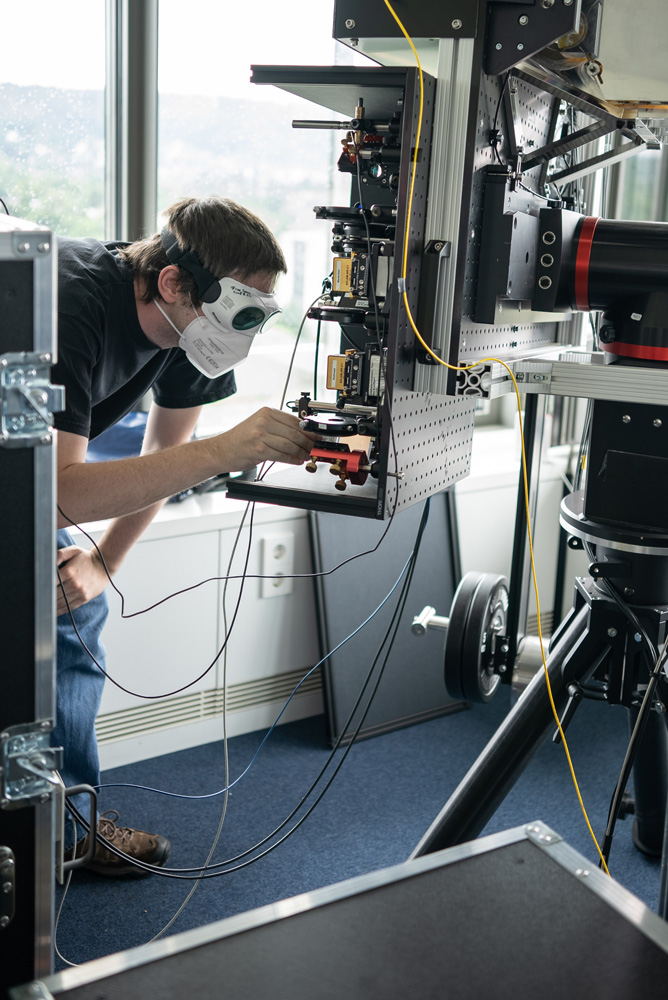
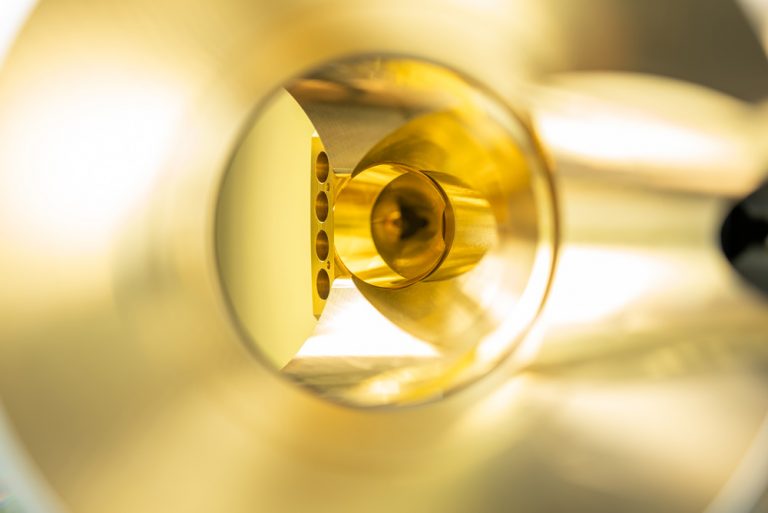
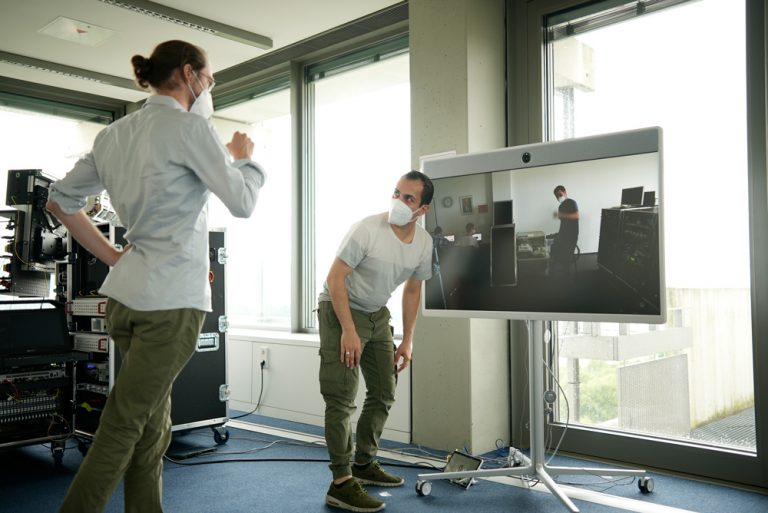
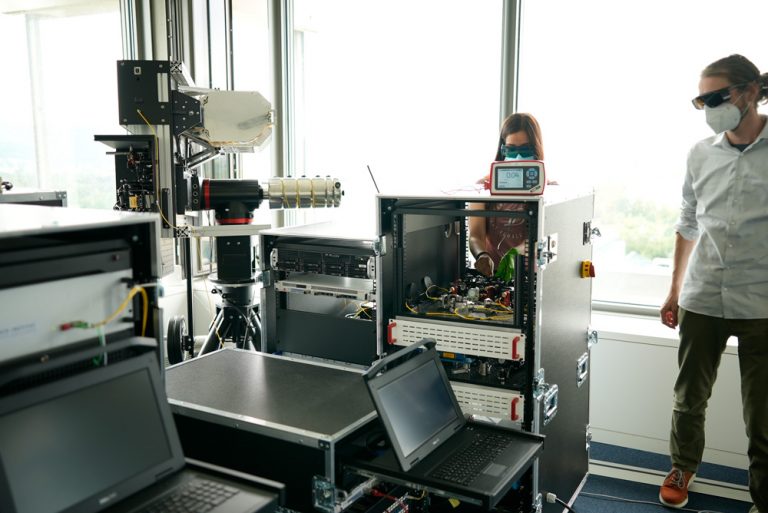
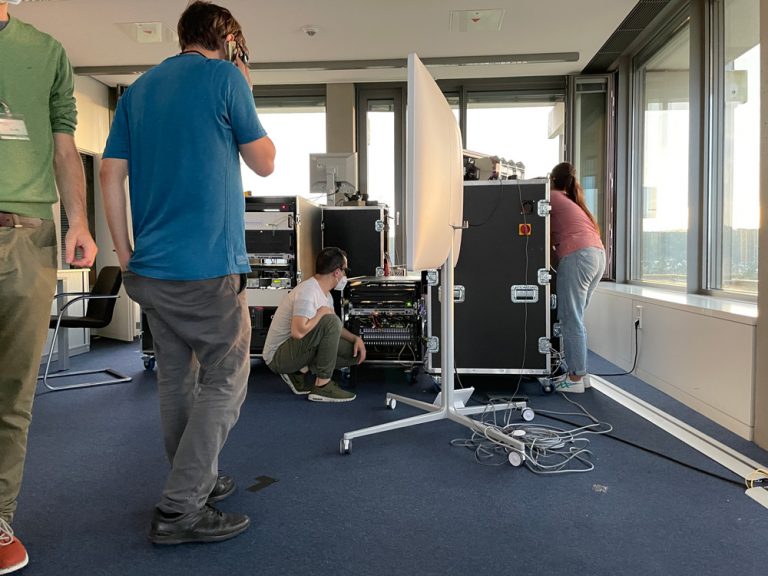
BMBF initiative QuNET presents systems for highly secure quantum communication
An initiative of the Federal Ministry of Education and Research (BMBF) has been researching new possibilities for tap-proof communication for a year now. The ‘QuNET’ initiative is working on methods for exchanging information between authorities or in critical infrastructures – without third parties being able to eavesdrop. Today, Federal Research Minister Anja Karliczek and the participating research institutes presented the initial results. At a BMBF press conference, they presented the basics of the system architecture and systems for exchanging quantum keys over various distances.
Data security as the foundation of digital democracy
»Protecting the privacy of citizens in the digital world is a top priority for the German government. The security of data exchange is also of fundamental importance for the economy. This security can only be achieved in the long term with the help of quantum communication«, said Federal Research Minister Anja Karliczek at the press conference.
New types of quantum computers pose a threat to tap-proof and tamper-proof data transmission. They will be able to circumvent conventional encryption methods. The technologies of the future are already casting their shadows today: According to the motto ‘Store now, decrypt later’, data can already be stored today and read out later, with the help of more powerful computers or new algorithms.
New types of quantum computers pose a threat to tap-proof and tamper-proof data transmission. They will be able to circumvent conventional encryption methods. The technologies of the future are already casting their shadows today: According to the motto »Store now, decrypt later«, data can already be stored today and read out later, with the help of more powerful computers or new algorithms.
Novel quantum keys enable highly secure encryption
Against this backdrop, the BMBF’s QuNET initiative has been researching the potential of highly secure quantum communication for society and the economy since autumn 2019. The aim is to safeguard Germany’s national technological sovereignty as well as the security and confidentiality of data, even in the face of new communication technologies.
»My goal is to make Germany a world leader in the field of the ‘quantum internet’. Germany can become the European Union’s innovation driver in this field and take us a good step further on our path to technological sovereignty. QuNET is making an important contribution here. Already in the first year, the project developed technologies for a quantum-secured connection between two federal institutions«, said Federal Minister Anja Karliczek.
Over the past year, the research organisations involved in the project – the Max Planck Society, the Fraunhofer Society and the German Aerospace Centre – have jointly developed important foundations for modern and secure communication standards. The scientists looked at the overall architecture for systems for quantum-safe communication as well as the possibilities for exchanging quantum keys over long, medium and short distances using free-beam and fibre systems.
Four institutes contribute their expertise to research into quantum communication
Meanwhile, a team at the German Aerospace Centre (DLR) is researching systems that can transport quantum states over long distances. Aircraft or satellites are used for this, which can bridge large distances, for example within Germany or between different countries, using optical free-beam systems. »In QuNET, we are developing the necessary building blocks, core technologies and concepts for the overall system technology here at DLR«, explains Institute Director Christoph Günther.
The Fraunhofer-Gesellschaft develops technologies that enable quantum-based communication over short and medium distances, i.e. within a city or metropolitan region. Both free-beam and fibre systems are used for this purpose. »Fibre-based systems make it possible to integrate the latest quantum technology into existing communication networks, such as fibre optic cables«, explains Martin Schell, Director of the Fraunhofer Heinrich Hertz Institute HHI in Berlin. Free-beam systems, on the other hand, which are the focus of research at the Fraunhofer Institute for Applied Optics and Precision Engineering IOF in Jena, can realise short-term and mobile connections. Telescopes and light sources are being developed in Jena for this purpose.
Fraunhofer is also focussing on the development of interfaces between all these different subcomponents and their implementation in existing communication network infrastructures. »In this way, we are helping to promote a heterogeneous, hybrid communication network«, summarises Andreas Tünnermann, Institute Director of Fraunhofer IOF and spokesperson for the QuNET steering committee.
Advisory board from industry and the Federal Office for Safety support further development
In addition to the three leading research organisations, an advisory board consisting of experts from industrial companies in the fields of telecommunications, system and component development, security and the space industry as well as the Federal Office for Information Security are also involved in the QuNET initiative. The involvement of further partners, primarily from industry, is planned.
Facts and figures on the QuNET initiative
Start: Autumn 2019
Duration: 7 years
Funding organisation: Federal Ministry of Education and Research
Volume: 125 million euros in funding planned
The participating research institutes
The Fraunhofer Institute for Applied Optics and Precision Engineering IOF, based in Jena, conducts research into the further development of light as a means of solving a wide range of problems and application scenarios. The work of the research institute, which was founded in 1992, is therefore focussed on application-oriented research into light generation, light guidance and light measurement. Together with researchers from basic research and industry, innovative solutions are developed that provide a technological advantage in science and industry and open up new fields of application for photonics.
The Max Planck Institute for the Science of Light (MPL) covers a broad spectrum of research, including nonlinear optics, quantum optics, nanophotonics, photonic crystal fibres, optomechanics, quantum technologies, biophysics and – in collaboration with the Max Planck Centre for Physics and Medicine – connections between physics and medicine. The MPL was founded in January 2009 and is one of more than 80 institutes of the Max Planck Society that conduct basic research in the natural sciences, life sciences, humanities and social sciences in the service of the general public. Today, almost 250 people from around 30 nations work at the institute. Some of the researchers have decades of experience in the field of quantum communication. They also use telecoms technology for the exchange of quantum keys, which allows the processes to be used commercially quickly. For more than ten years, the Erlangen team has also been investigating how the keys can be transmitted over several kilometres on the ground using laser light (known as a free-beam connection) or over longer distances by satellite. The MPL is significantly involved in many large national and international projects – also in co-operation with national industry.
The DLR Institute of Communications and Navigation (IKN) is dedicated to mission-oriented research in selected areas of communications and navigation. Its work ranges from the theoretical foundations to the demonstration of new procedures and systems in a real environment and is embedded in the DLR programmes Space, Aeronautics, Transport, Digitalisation and Security. The institute currently employs around 190 people, including 150 scientists, at its sites in Oberpfaffenhofen and Neustrelitz. The institute develops solutions for the global networking of man and machine, for high-precision and reliable positioning for future navigation applications as well as processes for autonomous and cooperative systems in transport and exploration. The institute also deals with the security of radio systems. The focal points in this area include post-quantum cryptography and the transmission of quantum keys via satellite.
QuNET initiative: Questions and answers
Why this initiative?
Ever more powerful digital technologies are impacting today’s data networks and are increasingly jeopardising the security of this critical infrastructure of the modern information society. Added to this is the ongoing development of the quantum computer. The ability to calculate and analyse a multitude of possible options simultaneously not only creates new opportunities, but also risks. Many of the currently widely used core components of encryption, on which security is based, can be broken. Government organisations, the healthcare system and security-critical companies in particular must therefore rethink and renew their security infrastructures.
What is the aim of the initiative?
The primary goal of QuNET is to develop the physical and technical foundations as well as the necessary technologies for a tap-proof communication network using quantum physics. However, QuNET enables more than just secure communication: the prospective applications of the transmission of quantum states extend to networked quantum computers, the so-called quantum internet. This opens up completely new possibilities for materials science, in the financial sector or in the development of medicines.
How does quantum encryption work?
The goal is to make existing communication networks secure in the long term by means of a quantum key distribution (QKD). Quantum encryption takes advantage of the property of quantum particles that they cannot be measured or copied unnoticed. For example, a quantum source generates light pulses that are exchanged between two locations. From the results of a quantum mechanical measurement, a manipulation or a listening of the light pulses would be detected. Based on this, two keys can be generated, which are known only to the sender and receiver and which can be used for encryption. This method is also secure against all future attacks by a quantum computer. To overcome longer distances, satellites with quantum sources can generate the quantum keys over intercontinental distances, or else future developments of so-called quantum repeaters (cf. Q.Link.X) can be used.
What is the state of the art in quantum communication?
Quantum communication offers many potential applications for the benefit of the economy and society. Quantum key distribution (QKD) is probably one of the best-studied and most advanced examples internationally.
Kick-off in Jena: BMBF initiative QuNET for tap-proof quantum communication
QuNET project launches at Fraunhofer IOF, builds secure quantum communication network for Germany and strengthens digital security and sovereignty.
On 12 November 2019, around 30 project participants met at the Fraunhofer IOF in Jena for the launch of QuNET. As part of the BMBF-funded initiative, the Fraunhofer-Gesellschaft, the Max Planck Society and the German Aerospace Centre will set up a pilot network for quantum communication in Germany, which will be used for tap-proof and tamper-proof data transmission.
At the start of the project, Federal Research Minister Anja Karliczek explained in a video message: »We must secure our information and communication systems as far as possible against IT attacks. Only then can the economy and society make full use of the progress and opportunities offered by digitalisation. That is why the development of a quantum communication infrastructure is crucial for us. This will enable greater security and technological sovereignty. Germany and Europe should become the most trustworthy data space in the world. QuNET’s work will bring us a great deal closer to this goal.«
Motivation
Secure communication networks are a critical infrastructure in modern information societies. Cyberattacks and data leaks are currently on the rise, affecting not only the economy but also citizens, public institutions and federal authorities. In addition, the latest technological advances in the development of quantum computers require new ways of transmitting data. These future high-performance computers will be able to break important cryptographic procedures of our current digital communication and thus jeopardise secure data traffic.
Quantum communication, on the other hand, will make it possible to counter this threat and transmit sensitive information in such a way that its confidentiality is maintained. Quantum states are used to distribute cryptographic keys that cannot be copied, read or even manipulated due to fundamental laws of quantum physics.
Prof Andreas Tünnermann, Director of Fraunhofer IOF, said in his opening speech: »Data security is a fundamental right and within the framework of QuNet we will endeavour to contribute to secure communication, but also to the secure storage of data in Germany and Europe. This infrastructure will be of interest to both science and industry.«
Project start and set goals
On the occasion of the project launch of the QuNET funding initiative, representatives of all participating institutions came together in Jena to discuss the next steps and adopt concrete work packages. In the first phase (QuNET-alpha), the researchers will investigate quantum communication technologies for hybrid communication systems and establish a quantum-secured pilot link between federal institutions.
In further project phases, the initiative aims to establish connectivity with other European quantum network initiatives. In close cooperation with German industry and the Federal Office for Information Security (BSI), QuNET will implement a German quantum communication infrastructure. QuNET is thus laying important foundations for quantum-secure communication, which in future will offer security in the digital world not only to federal authorities but also to industry and citizens.
The role of the Fraunhofer IOF
Fraunhofer IOF is coordinating the ‘QuNet’ project and is contributing its expertise in the fields of optical quantum technologies, precision mechanical systems and adaptive optics, among others. In addition to a mobile open science platform (QuBus) and free-beam experiments on quantum key distribution, colleagues in Jena are also working on new high-performance sources for photon pairs, for example. The guests were able to gain an insight into the relevant sub-projects during a tour of the laboratory.
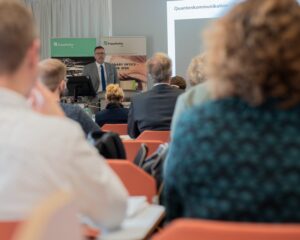
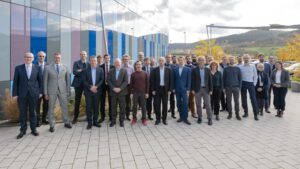
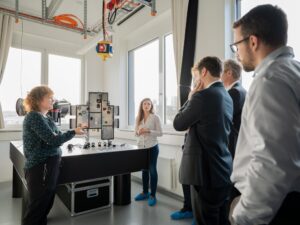
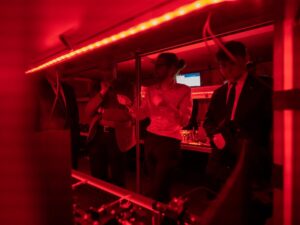
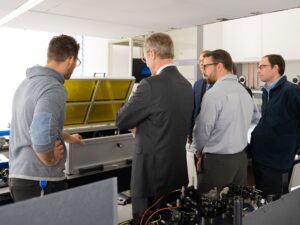
BMBF and research launch major offensive for quantum communication
The German government intends to massively increase its support in the field of optical quantum communication in the coming years. At a press conference at the Fraunhofer Forum in Berlin today, Federal Research Minister Anja Karliczek announced the official launch of the new ‘QuNET’ large-scale offensive. In future, intensive research will be carried out here on photonic technologies for tap-proof quantum-based communication networks. The consortium project is being led by the Fraunhofer Institute for Applied Optics and Precision Engineering IOF.
Together with the Fraunhofer-Gesellschaft, the Max Planck Society and the German Aerospace Centre, the Federal Ministry of Education and Research (BMBF) is planning a major initiative for a tap-proof quantum network. At a press conference at the Fraunhofer Forum in Berlin today, the Federal Minister of Education and Research, Anja Karliczek, announced the funding of the ‘QuNET’ initiative. With an initial funding volume of 25 million euros, research will be conducted in the coming years into how the laws of quantum physics can be utilised for secure communication networks.
Minister Anja Karliczek presented the BMBF’s plans: ‘In the digital age, the economy and society are more dependent than ever on secure communication. Secure data lines are the lifelines of our age. That is why data exchange must be made as secure as possible. Quantum communication offers unique opportunities for this. Germany and Europe must develop their own expertise in this area to avoid becoming dependent on others. That is why we must advance research in this future field. Germany and Europe should become the most trustworthy data space in the world – that is why I will put this topic on the German and European agenda. With the ‘QuNET’ initiative, top German research and companies are jointly laying the foundations for the secure communication of the future. I am grateful to the participants in this unique project for their commitment to this future field.” The aim of ‘QuNET’ is secure communication between government organisations. However, the seven-year project is also intended to serve as a central platform for the development of a German quantum communication infrastructure and will also lead the way in the development of a quantum internet. At European level, the German government and the ‘QuNET’ consortium partners are pursuing the goal of creating a secure European data space.
Challenges for quantum communication.
To meet this challenge, the Fraunhofer-Gesellschaft has joined forces with its Institutes of Applied Optics and Precision Engineering IOF (Jena) and Communications Engineering, Heinrich Hertz Institute HHI (Berlin) with the German Aerospace Centre and the Max Planck Institute for the Science of Light (Erlangen). Industrial partners from the fields of telecommunications, system and component development, security and satellite operations are also involved in the project, including companies such as Deutsche Telekom AG, ADVA Optical Networking and Tesat-Spacecom. The close links with national industry are intended to lay the foundations for the rapid transfer of the solutions developed in the ‘QuNET’ project.
Fraunhofer President Prof. Reimund Neugebauer explained the strategy of the Fraunhofer-Gesellschaft: ‘With “QuNET”, we are laying the foundation for the development of a standardised and secure European information and communication infrastructure alongside excellent partners from research, industry and politics. This project will enable us to further expand Germany’s pioneering role and technological leadership in this strategically important area. In the long term, we plan to combine data sovereignty and data security in the European data space at the highest level by linking quantum-based communication infrastructure with the International Data Spaces.”
New opportunities for the digital society
The background to the initiative is the increasing performance of digital technologies that affect today’s data networks and pose a growing threat to the security of our modern information society. Government organisations, banks and security-critical companies in particular need to rethink and renew their security infrastructures in this respect.
Prof. Andreas Tünnermann, Director of Fraunhofer IOF and initiator of the ‘QuNET’ project, explains: ‘The initiative synergistically combines the complementary expertise of high-ranking German research institutions in the field of quantum communication. The project strategically addresses the development of new heterogeneous quantum communication networks that will enable multi-user operation. QuNET will thus make an important contribution to physically secure communication in Germany and Europe.” Prof. Gerd Leuchs, Director Emeritus at the Max Planck Institute for the Science of Light, also referred to the technical potential of optical quantum communication: ‘The special property of quantum measurement that only ever reveals part, but never all, of the information available offers scope for interesting applications ranging from the perfect random number generator to the detection of unauthorised eavesdroppers. Both are important for secure communication.”
The project, which is divided into three phases, will officially start in autumn 2019: first, the researchers will develop the hardware components; in the second phase, they will work on the technological foundations for multi-user operation in heterogeneous networks. In the third phase, the public authority network based on quantum technology will be implemented together with industry and federal network operators.
